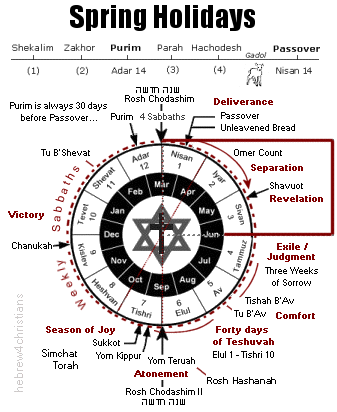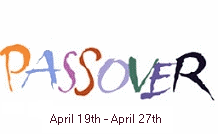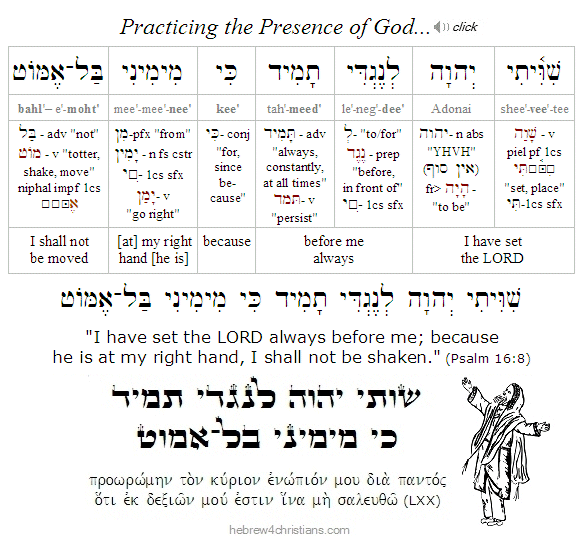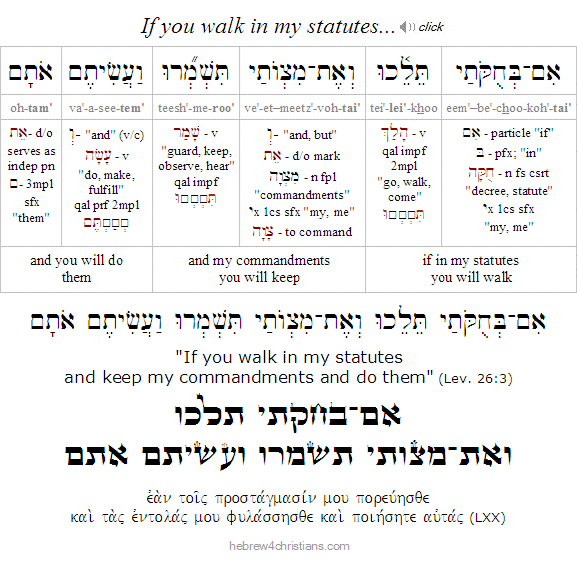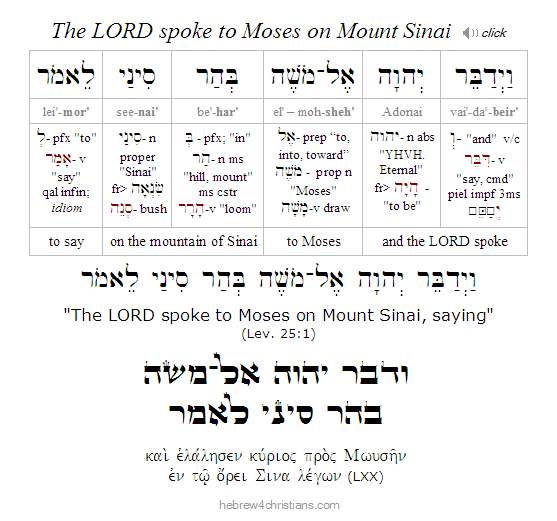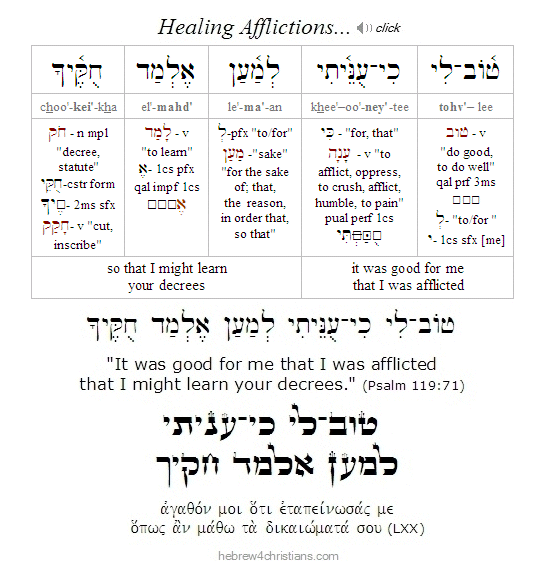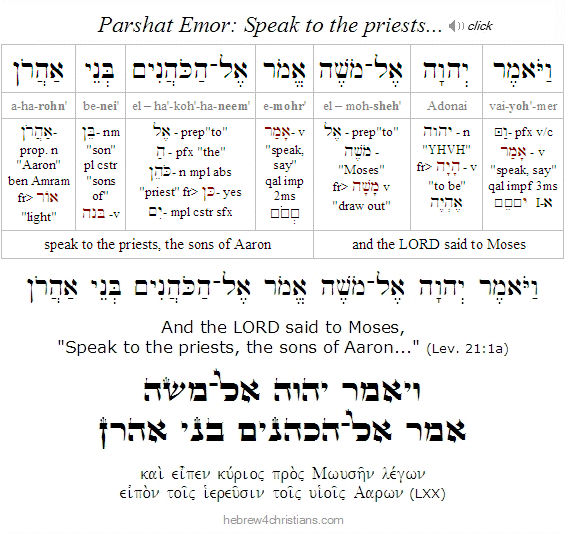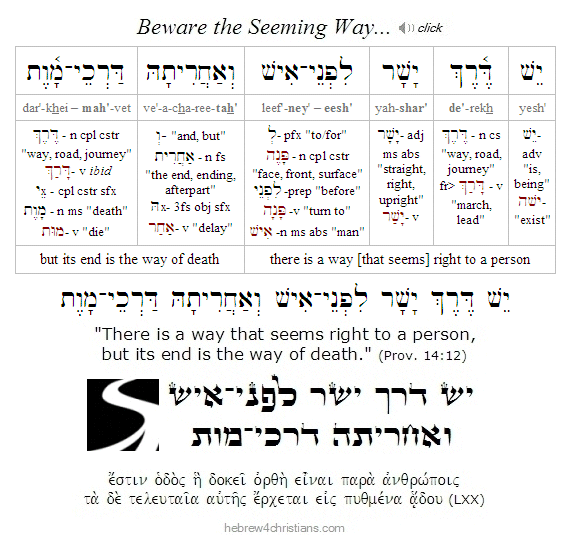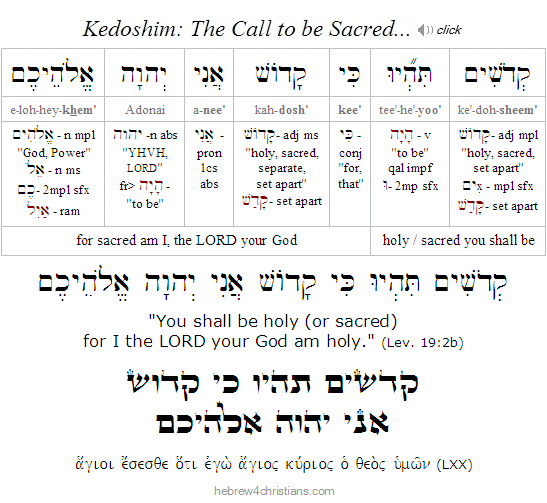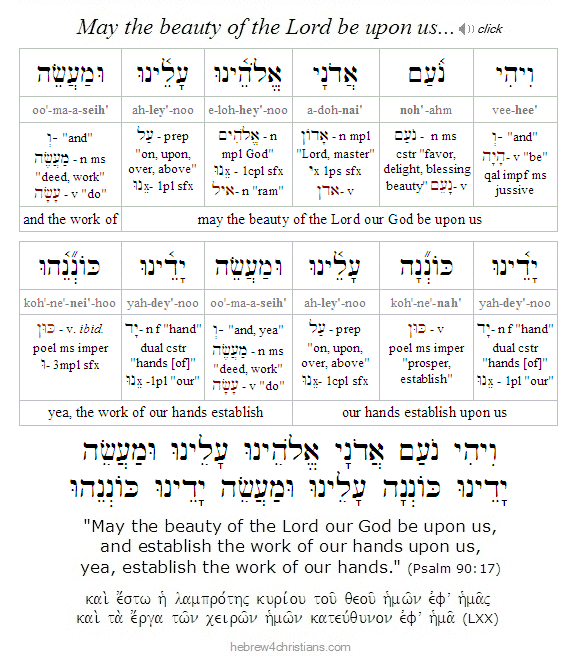|
Jewish Holiday Calendar
For May 2019 site updates, please scroll past this entry....
Spring is the start of the Biblical Year and is marked by two of the Shelosh Regalim (three annual pilgrimage festivals): Pesach (Passover) and Shavuot (Pentecost). The holiday of Shavuot is held seven weeks (or fifty days) following the morning after Pesach.
The Spring Holidays:

The spring holidays provide a portrait of the death, burial, and resurrection of the Messiah: Yeshua was crucified on erev Pesach, buried during Chag Hamotzi, and was resurrected on Yom Habikkurim (Firstfruits). Shavuot (i.e., the feast of Pentecost) was the day the Ruach HaKodesh (Holy Spirit) fell on believers in fulfillment of the promise given by our Lord.
Note that in accordance with tradition, the following holiday dates begin at sundown:
- Month of Adar II (Wed. March 6th [eve] - Fri. April 5th [day])
- Month of Nisan (Fri. April 5th [eve] - Sat. May 4th [day])
- Biblical New Year's Day: Rosh Chodashim [Fri. April 5th, Nisan 1, 5779]
- Four Sabbaths: Tazria (chodesh), Metzora (HaGadol), Passover (x2), Acharei Mot
- Shabbat HaChodesh - The Sabbath before (or on) Rosh Chodashim
- Rosh Chodashim - The start of the Biblical Year (Fri., April 5th,)
- Shabbat HaGadol - The Sabbath before Passover (Fri. April 12th)
- Bedikat Chametz - Removing leaven from your home before Passover
- Fast of the Firstborn - Fri., April 19th at sunrise (Nisan 14)
- Bi'ur Chametz - Burning leaven; Fri. April 19th in afternoon (Nisan 14)
- Passover - Fri. April 20th late afternoon until sundown Sat. April 27th
- Unleavened Bread - Fri. April 20th until sundown April 27th (Nisan 15-22)
- Firstfruits - Sun. April 21st at sundown (Nisan 17); Yeshua's Resurrection
- Counting the Omer - Sun., April 21st - Fri., June 7th
- Armenian Genocide Remembrance Day (April 24)
- Yom HaShoah - Wed. May 1st at sundown (Nisan 27)
- Rosh Chodesh Iyyar - Sat. May 4th (Nisan 30)
- Month of Iyyar (Sat. May 4th [eve] - Mon. June 3rd [day])
- Month of Sivan (Mon. June 3rd [eve] - Tues. July 2nd [day])
Note: Because this is a Jewish leap year, the holiday of Passover -- and particularly the Festival of Firstfruits -- will not occur near the traditional date of "Easter" or "Resurrection Sunday" as it is often called in the Gregorian calendar... For more information, see the Calendar Pages....
Dates for Passover 2019:
Free Seder Guide
May 2019 Updates
Finding Real Treasure...

05.31.19 (Iyyar 26, 5779) "The kingdom of heaven is like treasure hidden in a field, which a man found and covered up. Then in his joy he goes and sells all that he has and buys that field. Again, the kingdom of heaven is like a merchant in search of fine pearls, who, on finding one pearl of great value, went and sold all that he had and bought it" (Matt. 13:44-46). Here Yeshua teaches us that a relationship with God is the true source of joy and value in life, and that all other passions and desires are like "fools gold" when compared with its overwhelming worth... In this connection Soren Kierkegaard wrote: "If anyone thinks he is a Christian and yet is indifferent toward being that, then he really is not one at all. Indeed, what would we think of a person who gave assurances that he was in love and also that it was a matter of indifference to him?" (Works of Love). The Shema, the "first and greatest commandment," is to love God "bekhol levavkha" (בְּכָל־לְבָבְךָ) with all our hearts, and yet how is that love possible apart from the revelation of the passion of love itself? "We love because God first loves us" (1 John 4:19), and therefore teshuvah ("repentance") is a matter of being in love, celebrating God's heart for us, awakening to its wonder, and being thrilled and overjoyed at its reality. Isn't this the essence of the matter?
"Shimon ben Yonah, atah ohev oti?" – "Simon son of Jonah, do you love me?" (John 21:17). But how can we love the Lord apart from trusting his heart for us? "Come unto Me," Yeshua says, "live in Me and I will live in you" (John 15:5). O Lord God our Savior, deliver us from apathy and indifference! Soften our hearts and awaken us to our great desire and need for you! Hashivenu, Adonai: turn us, O LORD, and we shall be turned; heal us, and we shall be healed... Help us to come to you and to know the breadth and length and height and depth of your great love for us.
So for what do you hope, friend? What are your dreams? Your deepest desires? Where is your treasure? Yeshua cautioned those who sought their happiness in this world: "Do not store up for yourselves treasures upon earth... be rich toward God" (Matt. 6:19-20; Luke 12:21). When we treasure God, our focus is directed toward the eternal reality, and our interest in this world is minimal. We trust God to meet our daily needs and surrender our future to His care. The only worry we face concerns our own deficiencies in our obligations to the Savior. Our duty is to love God in the truth - bekhol levavkha - with all our heart, having no thought of ourselves. Indeed, self-denial means to quit thinking about yourself (from α-, "not," + ῥέω, "to speak") by accepting what God has done for you. "It is not my business to think about myself. My business is to think about God. It is for God to think about me" (Simone Weil). Shabbat shalom, chaverim....
מִי־לִי בַשָּׁמָיִם
וְעִמְּךָ לא־חָפַצְתִּי בָאָרֶץ
mee'·lee · va·sha·ma'·yeem
ve·ee·me·kha · lo-cha·fatz'·eei · va·a'·retz

"Whom have I in heaven but you?
And there is nothing on earth that I desire besides you."
(Psalm 73:25)

Download Study Card
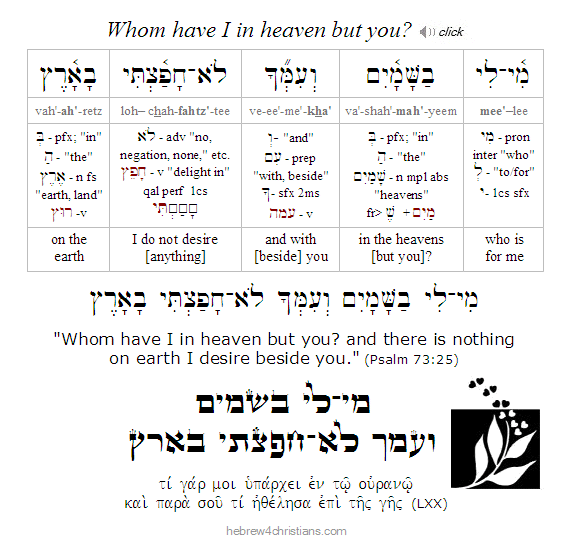
Renewing your Mind...

05.31.19 (Iyyar 26, 5779) Think counterculturally. Do not let your mind be conformed (lit., "squeezed into the mold") of this world, but be transformed (μεταμορφόω, i.e., metamorphosized like a caterpillar is changed into a butterfly) by the renewal of your mind (Rom. 12:2). The Greek word translated "renewal" is ἀνακαίνωσις, from ἀνά, meaning "up, into the midst," and καινός, meaning "newness." The idea here is that we are inwardly transfigured as we take hold of the truth of the new covenant and make it central to our lives. For this we must "put on the mind of Messiah" and repudiate the world's values and vain philosophies (1 Cor. 2:16). "When the devil is called the god of this world, it is not because he made it, but because people serve him with worldliness." The "god of this world" blinds the eyes of those who do not believe so they cannot see the truth of the gospel of Messiah (2 Cor. 4:4). The philosophy of this world is always based on lies, propaganda, fear, lust, pride, anger, appeals to vanity, and so on. We must use discernment and test the world's assumptions against the truth of the Scriptures.
The greatest weapon of spiritual warfare is heartfelt praise offered up to God. When you are feeling oppressed or troubled, lift up your hands by using the powerful weapon of praise... Satan and the powers of darkness simply cannot stand before someone offering praise and thanks to the LORD for their personal deliverance. "As you call upon the LORD - who is worthy to be praised - so are you delivered from your enemies" (Psalm 18:3).
 |
Faith and Persecution...

05.31.19 (Iyyar 26, 5779) Did you know that Christianity is by far the most persecuted religion in all the world? It has been estimated that every two minutes a Christian is imprisoned, tortured, and martyred for their faith, and that every day over three Christian buildings are burned, desecrated, and ravaged (Open Doors). Indeed, as the appointed time draws near -- acharit hayamim and the Day of the LORD (יוֹם יְהוָה) -- more and more of our brothers and sisters in the faith will undergo the ultimate test of their loyalty, as was foretold by our Lord (John 15:20; 16:2; Matt. 24:9). As for the "Babylon" of this world, God has appointed great tribulation and catastrophic judgments that were foreshadowed in Egypt of old -- only this time they will befall the entire world order (Joel 1:15; Isa. 13:6, Ezek. 30:3, etc.). In contemporary America (and Europe, of course), many churches are flagrantly apostate, denying the truth of Scripture while openly celebrating a "gospel of political correctness" and "cheap grace." Syncretism has always been a seductive danger to those of genuine faith, as the Torah plainly forewarned and the New Testament clearly teaches (1 John 2:15; Rom. 12:2, James 4:4). In our Torah where it says "the Egyptians mistreated and afflicted us..." (Deut. 26:6), the sages note that the word translated "they afflicted" (וַיָּרֵעוּ) could be translated either as "they made us bad (רַע)" or "they befriended us" (רֵעַ), though the two meanings may be related, since befriending the ideals and values of the world corrupts us so that we lose our identity and our spiritual sensitivity. As it is written, "whoever wishes to be a friend of the world makes himself an enemy of God" (James 4:4), and, "If anyone loves the world, the love of the Father is not in him" (1 John 2:15).
Note: In many ways it is far more difficult to follow Yeshua in the "Babylon wasteland" of America than in many other places of the world... Here the danger is to fall asleep, to be seduced by worldly comfort and godless entertainment, while the soul fades away and dies. In this connection understand the grave danger of those false teachers who preach the so-called "prosperity" gospel -- as if following Jesus will guarantee you a fat bank account along with a new Mercedes Benz.... Those who teach such things are enemies of God.
 |
Ascension and Mem B'Omer...

05.30.19 (Iyyar 25, 5779) Today marked the 40th day of the Omer Count (i.e., Mem B'Omer), the time associated with the ascension of Yeshua. Recall that Yeshua told His followers that it was good that he would leave them, so that the Holy Spirit (רוּחַ הַקּדֶשׁ), the "Comforter" or "Advocate" (παράκλητος), would be given to them. "But I tell you the truth, it is for your advantage that I am going away. For if I do not go away, the Advocate (ὁ παράκλητος) will not come to you, but if I go, I will send him to you" (John 16:7). Notice that the word translated as "advantage" here is the Greek word συμφέρω (from σύν, "with" and φέρω, "to carry"), which suggests that we would be given power that "carries us" with the Lord during the trials of this life... Bo, Ruach Elohim: "Come, Holy Spirit..."
Trusting and Seeing...
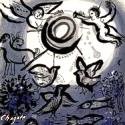
05.30.19 (Iyyar 25, 5779) How we see is a spiritual decision... As it says in the Torah: "See the land, what it is ... whether it be good or bad ... and strengthen yourselves" (Num. 13:18-20). Here note that rightly seeing – even the negative aspects of the land such as the presence of "giants" – can only be achieved by the courage derived from faith. When you see things that appear bad, you are to "strengthen yourselves," a Hebrew verb (i.e., וְהִתְחַזַּקְתֶּם) that means to intently decide to see the good despite the present veil of appearances. When we encounter things that are bad, we must refuse to be overwhelmed by carnal reasoning and fear by looking beyond the moment to behold a promised good (2 Cor. 4:18). Whether things are good or bad, trust God is with you, in your midst....
Effective Spiritual Warfare...

05.30.19 (Iyyar 25, 5779) There are two basic approaches to "spiritual warfare." The first is to discern the presence of evil and then pray for God's intervention, deliverance, protection, and so on. The second is to use ha'ayin ha'tovah (i.e., the good eye) and focus on the truth and Reality of God instead - to "set your thoughts on things above" (Phil. 4:8). Whereas the former approach may at times seem necessary to repudiate encroaching darkness to find inner peace, the latter approach has the decided advantage of trusting in the Divine Presence that pervades and overrules all things (Psalm 16:8). When David was surrounded by the enemy, he kept focused on the glory of the LORD. David knew that God would shelter him and elevate him above the powers of darkness (Psalm 27:1-6). The highest form of spiritual warfare, then, is to consciously turn away from fear by choosing to praise the LORD God, magnifying His Name, and walking before Him in awe...
The Vision of Zion...

[ Yom Yerushalayim, or "Jerusalem Day," is observed June 2nd this year... ]
05.30.19 (Iyyar 25, 5779) Jerusalem is central to the Jewish heart. When religious Jews pray three times a day, they always turn toward Jerusalem (they also keep a small section of an eastern wall in their house unplastered and unpainted (mizrach) as a sign of mourning for the destruction of the Temple). The midrash says, "As the navel is set in the center of the human body, so is the land of Israel the navel of the world; as Jerusalem is in the center of the land of Israel, so is the sanctuary in the center of Jerusalem; as the holy place is in the center of the sanctuary, and the ark is in the center of the holy place, and the foundation stone is before the holy place, so from it the world was founded" (Tanchuma, Kedoshim).
Yeshua called Jerusalem the "City of the great King" (Psalm 48:2; Matt 5:35). It is the place where He was crucified, buried, resurrected, and from whence He ascended to heaven. It is also the birthplace of kehilat Mashiach (i.e., the "church") and the focal point of humanity's eschatological future. One day (soon) Yeshua will physically return to Jerusalem as Mashiach ben David to restore the throne of King David. At that time, all the New Covenant promises given to ethnic Israel will be literally fulfilled as the Kingdom of God is manifest upon the earth. The great vision of Zion will not fail! For more, see the Yom Yerushalayim pages...
 |
 |
The Fear of the LORD...
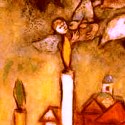
05.29.19 (Iyyar 24, 5779) Our Torah portion this week (Bechukotai) includes a litany of woes assured to befall those who spurn God's Torah or break covenant with Him (Lev. 26:14-46). The deeper intent of this admonition (tochechah) is to warn us of the grave danger of forfeiting our relationship with God – that is, of refusing to be healed of our illusions... Chastisement is a blessing from heaven, the "troubles of love" (יִסּוּרֵי אַהֲבָה), since its goal is to bring us back to God and to deliver us from eternal loss. This is why Yeshua spoke about the dangers of hell: if we do not heed the Voice of divine love, we risk literally everything, and that loss is irremediably eternal... God's warning about hell expresses the great passion of his heart for us; his love calls us to receive eternal life and blessing, but if we refuse to come, we will suffer the loss of the only thing that ultimately matters. As it is written: "It is a fearful thing to fall into the hands of the Living God" (אֱלהִים חַיִּים).
The fear of losing love evokes a healthy zeal to protect it from loss... The same may be said of God's relationship with us. The gospel represents God's passion for us, the call of his heart, his desire to elevate us to the role of the beloved, and we respond by accepting Him as the Lover of our souls, the Ultimate Concern of our life. Sin threatens to seduce us away from God's love, to interfere with our relationship, which evokes God's "jealousy" to protect love from loss. This is what the "fear of the LORD" (יִרְאַת יְהוָה) most radically means: God's own fear that we would lose sight of our great need for his healing love...
It is written that "perfect love casts out fear" (1 John 4:18), but perfect love (τελεία ἀγάπη) must be "perfect," that is, reciprocal, complete, consummated, and alive with passion. In Hebrew, perfect love is "shalem" - that is, whole, healed, and unified (אַהֲבָה שְׁלֵמָה). Perfect love is both given and received... It is not "perfect love" to intellectually accept that God loves you in Yeshua our Savior. No, you must receive this as an inward passion, you must live within it, must embrace it, take possession of it, and let it fill your heart to abundance. This love, this "perfect love," then will cast away your fear of being unwanted, rejected, and abandoned. But to know this love, you have to open your heart and accept it as your own, the essential reality of who you are:
אֲנִי לְדוֹדִי וְעָלַי תְּשׁוּקָתוֹ
a·nee · le·doh·dee · ve·ah·lai · te·shoo·kah·toh

"I am my beloved's, and his desire is for me"
(Song 7:10)

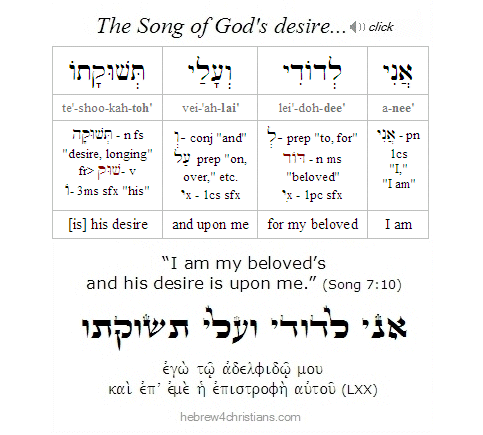
We are told to "work out our salvation with fear and trembling" (μετὰ φόβου καὶ τρόμου) since the love of God appeals to all of our heart, soul, mind and strength. Therefore may you fully accept that you are accepted; may you receive the blessing of God's passion for your soul; may you walk (i.e., live, move, and have your being) in the abundance of God's unfailing and everlasting love. Amen.
Theology and Humilty...

05.29.19 (Iyyar 24, 5779) Everyone is a theologian of sorts, though not everyone thinks clearly or takes the time to reflect on the meaning of the words they use, and therefore studying theology is necessary because so much muddled theology exists... Generally speaking "theology" (θεολογία) may be defined as reasoning (λόγος) about God (Θεός), though such reasoning is grounded in the philosophical activity of apprehending truth about ultimate reality. And just as everyone is a theologian (either a good one or not), so everyone is a philosopher of some kind or another, that is, a person who opines about the ultimate questions of life. To be a conscious person (as opposed to being numb or asleep) implies that you are haunted by "big questions" (for example, "Who are we?" "Where did we come from?" "Why are we here?" "Where are we going?" and "What does it all mean?"), and therefore every self-reflective soul cannot escape the need to think clearly. Indeed disciples of Yeshua are called talmidim (תַּלְמִידִים), that is, "learners" who have a duty before God to know and live the truth. We are to "study to show ourselves approved before God, rightly understanding the Word of Truth" (2 Tim. 2:15). The alternative to being talmud Torah (a Torah student) is to be muddled about what you believe and why your believe it. Faith is called the conviction (ἔλεγχος) or "argument" of truth (see Heb. 11:6). Not knowing the truth makes you vulnerable to various forms of philosophical deception and theological error, as it is written: "Beware lest anyone cheat you through philosophy and empty deceit, according to the traditions of men, according to the basic principles of the world, and not according to Messiah" (Col. 2:8). "However, we speak wisdom (σοφία) among those who are mature, yet not the wisdom of this age, nor of the rulers of this age, who are coming to nothing, but we speak the wisdom of God in a mystery (σοφίαν θεοῦ ἐν μυστηρίῳ), the hidden wisdom which God ordained before the ages for our glory" (1 Cor. 2:6-7). Knowing the truth sets us free (John 4:24, John 8:32; 2 Cor. 3:17).
Because we must both love the truth and discern what is false, clear thinking is required of us. "Good philosophy must exist, if for no other reason, because bad philosophy needs to be answered" (Lewis). Now philosophy is philosophy, but loving God is something more... Faith is not just a "head trip," but a "heart trip," and therefore it is essential to immerse the passions in all that we do. There is a real danger of intellectualizing faith, becoming something of a "professor" about God or a "Bible answer man" where you live "up in your head," full of sophisticated thinking about abstruse matters while disregarding the existential pathos and demands of the gospel.... Over the years I have read theologians that make God seem so remote and abstract that you wonder who or what is being talked about, after all. There is a danger to regard God as an "object' of knowledge -- a glorious, superlative, and supreme thing to study -- but a "thing" none the less. Tragically those who argue about theology have yet to learn the first lesson that true philosophy can offer, namely, that most of the time we don't really know (or fully understand) what we are thinking or saying. Being aware of our own blind spots requires forsaking our supposed infallibility and humbling acknowledging our own ignorance. We see "through a glass darkly." The intellect can act as a "defense" against what the Living God says to the wounded heart. That's always been the danger of mere "religion," after all, offering recipes and rituals, dogmas and assured theological confessions, while forgetting the desperate and hurting souls who must find God or die....
"God of Abraham, God of Isaac, God of Jacob -- not of the philosophers and scholars." These words represent Pascal's change of heart. He turned, not from a state of being where there is no God to one where there is a God, but from the God of the philosophers to the God of Abraham. Overwhelmed by faith, he no longer knew what to do with the God of the philosophers; that is, with the God who occupies a definite position in a definite system of thought. The God of Abraham . . . is not suspectible of introduction into a system of thought precisely because He is God. He is beyond each and every one of those systems, absolutely and by virtue of his nature. What the philosophers describe by the name of God cannot be more than an idea." (Martin Buber: Eclipse of God, 1952)
Troubles of Love (יִסּוּרֵי אַהֲבָה)
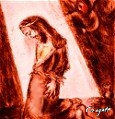
05.29.19 (Iyyar 24, 5779) Parashat Bechukotai is the concluding portion of the Book of Leviticus (וַיִּקְרָא), which is the central book of the Torah. In light of all that God had done for the Jewish people - from their great deliverance in Egypt to the ordination of the priesthood in the Tabernacle - God expected them to live up to their high calling as His chosen people: "You shall be holy, for I the LORD your God am holy" (Lev. 19:2). Therefore, some of the sages say that the central point of this concluding portion is tochachah (i.e., the warning of punishment) rather than nechamah (i.e., comfort). The focus is not, "If you walk in my laws" (Lev. 26:3), but rather, "if you do not listen (shema) to me" (Lev. 26:14)....
It has been said that the opposite of love is not hate, but rather indifference, and that explains why the punishments would come if the people "left their first love." Indeed, the "rebuke" portion of the tochachah begins with v'im lo tishme'u li (וְאִם־לא תִשְׁמְעוּ לִי), "if you do not listen to me" (Lev. 26:14), which recalls the Shema and the duty to love the Lord bekhol levavkha, "with all your heart." If the people walk carelessly (i.e., keri: קְרִי) with God, then God will afflict them with "the troubles of love" (i.e., yissurei ahavah: יִסּוּרֵי אַהֲבָה). A student once asked his rebbe: "Do we get punished for our sins in this world?" His succinct response was, "Only if we are made fortunate..." The worst possible fate is for God to be indifferent to someone! Can anything be more tragic than to be forgotten or to go unnoticed by God? It is far better that He afflict you with yissurei ahavah - the "troubles of love!"
The idea of tochachah (rebuke, correction) is not simply something for ethnic Israel, of course, since the New Testament likewise warns us that God will punish those who likewise walk carelessly (i.e., keri: קְרִי) with Him. Have you forgotten the exhortation that addresses you as God's children? "My son, do not regard lightly (ὀλιγώρει) the discipline of the Lord, nor be weary by his reproof (תּוֹכֵחָה). For the Lord disciplines the one he loves, and reproves (יוֹכִיחַ) every child whom he receives" (Heb. 12:5-6; Prov. 3:11-12). The Lord charged the assembly at Ephesus that they had let go of their first love. Yeshua therefore urged them: "Remember from what high state you have fallen and repent! Do the deeds (ἔργα) you did at the first; if not, I will come to you and remove your menorah from its place – unless you repent" (Rev. 2:4-5). Because God is never indifferent toward those who are trusting in His salvation, he will discipline and correct us to keep close to Him. He will afflict us with the "troubles of love." As it is written, "It is a fearful thing to fall into the hands of the Living God" (Heb. 10:30).
Regarding the litancy of woes, troubles, and curses listed in parashat Bechukotai, I'd like to relate a beautiful story I once read long ago.... The son of a Torah sage was away from home during the Shabbat of Bechukotai, so he went to a different synagogue to heard it read. As he listened to the cantor (reader), he became progressively alarmed at the severity of the curses, until he fainted in the middle of the reading. After he was revived he was asked if this happened to him every year, to which he replied, "No, when my father reads the Torah, the curses sound like blessings." Amen. Rightly heard. the warning of punishment for our sin should awaken us to hear the heart of our heavenly Father, who loves us and profoundly cares how we live our lives...
For more on this topic see: "The Troubles of Love: Further Thoughts on Bechukotai."
 |
If you walk in the truth...
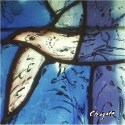
05.28.19 (Iyyar 23, 5779) In our Torah portion this week (i.e., Bechukotai) we read: "If you walk in my decrees (אִם־בְּחֻקּתַי תֵּלֵכוּ) and guard my commandments (ואֶת־מִצְוֹתַי תִּשְׁמְרוּ) and do them (וַעֲשִׂיתֶם אתָם), then I will give you your rains in their season, and the land shall yield its increase, and the trees of the field shall yield their fruit" (Lev. 26:4). Note the order in this verse: first we learn to walk in God's "decrees" and then we do his "commandments," which teaches us that the fear of God, the respect for His authority, must come first (כבוד לפני התורה). Note also the connection between our reverence before the Divine Presence and its effect on our physical environment. When we walk in the will of God, yielding our hears to his direction (Torah), we become vessels of his presence in the world and conduits of blessing to our surroundings. Indeed, as we yield to God's truth, even the sword of our enemies will be unable to be used against us and we walk in peace (Lev. 26:6; Prov. 16:7).
Note: The Torah commentator Rashi says that the phrase, "if you walk in my decrees" refers to labor in the study of Torah (i.e., limud Torah: לימוד תורה), since we cannot mindfully observe God's decrees (chukkim) and commandments (mitzvot) without first studying Torah... As it says in our Sciptures: "Make yourself diligent (σπούδασον σεαυτὸν) to be genuine before God, a workman that is unashamed, living the message of truth accurately" (2 Tim. 2:15). "If you will walk" is an invitation to grow in grace and understanding of God's truth.
 |
Bound by Love's Promise...
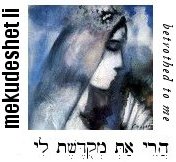
05.28.19 (Iyyar 23, 5779) From our Torah this week (i.e., Bechukotai) we read: "Then [after all the various judgments have befallen the people] I will remember my covenant with Jacob, and I will remember my covenant with Isaac and my covenant with Abraham, and I will remember the land" (Lev. 26:42). Here we note the "deeper Torah" of God's unconditional promise to the children of Israel that "contextualizes" the various tribulations they would suffer because of their disobedience to the terms of the covenant given at Sinai (Gen. 15). Therefore the Apostle Paul appealed to God's promises given to Abraham as the foundation for Torah, not to Israel's righteousness based on the law (Rom. 9:31; Gal. 4:24-27). "For the promise to Abraham and his offspring that he would be heir of the world did not come through the law (οὐ γὰρ διὰ νόμου) but through the righteousness of faith" (Rom. 4:13). The better covenant of Zion was prefigured at Mount Moriah - and hearkens back to Abraham and Isaac - not the later covenant made at Sinai (Gen. 22:16-18; Heb. 6:13-15; John 3:16). As for Israel in the galut (exile), God has promised: "But I will for their sake remember the covenant with their forefathers, whom I brought out of the land of Egypt in the sight of the nations, that I might be their God: I am the LORD" (Lev. 26:45). Note again that this covenant relationship was established when we were without anything – we had no Torah, no mitzvot, nor any good deeds to commend ourselves before heaven. Nevertheless, God chose us and called us his people, and all this comes from his great love.
Bound by love's promise... Now that's Torah!!!
 |
Note: Please pray for Hebrew for Christians ministry, friends. Our support has dropped recently and both Google, Facebook, and Twitter are "shadow banning" my content so that the outreach here is being affected... We are surely engaged in a battle against the "principalities and powers" of this present age, and therefore for all the more reason do I ask for your prayers that this ministry will be able to continue in the days to come. Thank you. - John
Dangers of Carelessness...

[ The following is related to our Torah reading for this week, parashat Bechukotai... ]
05.28.19 (Iyyar 23, 5779) This week's Torah portion (i.e., Bechukotai) includes the first great "rebuke" (i.e., tochachah: תּוֹכָחָה) of the community of Israel given in the Scriptures (the second is found in Ki Tavo, i.e., Deut. 28:15-68). In this sober and ominous section, God promises the people great blessing if they would obey Him (Lev. 26:3-13), but He forewarns that exile, persecution and other progressively worse punishments would befall them if they would break faith with Him (Lev. 26:14-46). The sages note that divine censure would come if the people "forgot" about God or otherwise became careless in their observance of His laws. They point out that the refrain "if you walk contrary to me" (וַהֲלַכְתֶּם עִמִּי בְּקֶרִי) - which occurs several times during the rebuke - really means "if you walk carelessly (i.e., keri: קְרִי) with me." Rashi notes that the verb קָרָה means "to befall" or "to happen" and therefore suggests a sense of randomness (the related word mikreh [מִקְרֶה] means "coincidence"). If the people regarded the events of life as "random," then God would reciprocate by bringing senseless trouble into their lives... For this reason the sages regard a careless attitude about God's will as the very first step to inevitable apostasy. In other words, regarding whatever happens in life as mere "coincidence" essentially denies God's Presence (hashgachah pratit), and this attitude will eventually call for God's corrective intervention. People may be "hot or cold" regarding their relationship with Him, but God will never give the option of affecting indifference toward Him... Indeed, God often brings hardship into our lives to regain our attention and cause us to return to Him. As C.S. Lewis once said, "God whispers to us in our pleasures, speaks to us in our conscience, but shouts in our pains: It is His megaphone to rouse a deaf world" (Mere Christianity).
The portion begins, "If you walk in my statutes (i.e., bechukotai: בְּחֻקּתַי) and guard my commandments and you do them..." (Lev. 26:3), which led Rabbi Hanina to ask why the seemingly superfluous phrase, "and you do them" (וַעֲשִׂיתֶם אתָם) was included here. After all, if the people would walk in God's statutes and guard his commandments, wouldn't they necessarily be doing them? He then suggested that the vowels of the word otam ("them") should be vocalized as atem (אַתֶּם), "you," which would then change the sense of the phrase to become, "you shall make (עָשָׂה) yourselves" (i.e., into God's image). The logical corollary of this seems to imply that if you do not walk in God's statutes and guard his commandments, you will disfigure the image of God within you...
Interestingly, God specifically cites the failure to observe the Sabbatical Year (shemittah), mentioned in last week's Torah portion, as part of the reason why His judgment would come (Lev. 26:34-35,43). The observance of the Sabbatical Year, of course, required complete faith that God was in control of all the "happenings" of nature. Like the Sabbath day, the Sabbatical year was designated to proclaim that God is the King of the universe. Those who disregarded this law therefore denied God's rule over nature, and thereby denied the existence of spiritual reality that ultimately governs the physical world...
יִרְאַת יְהוָה רֵאשִׁית דָּעַת
חָכְמָה וּמוּסָר אֱוִילִים בָּזוּ
yeer·at · Adonai · rei·sheet · da'·at
chokh·mah · oo·moo·sar · e·vee·leem · ba'·zoo

"The fear of the LORD is the beginning of knowledge;
fools despise wisdom and moral discipline." (Prov. 1:7)
Download Study Card

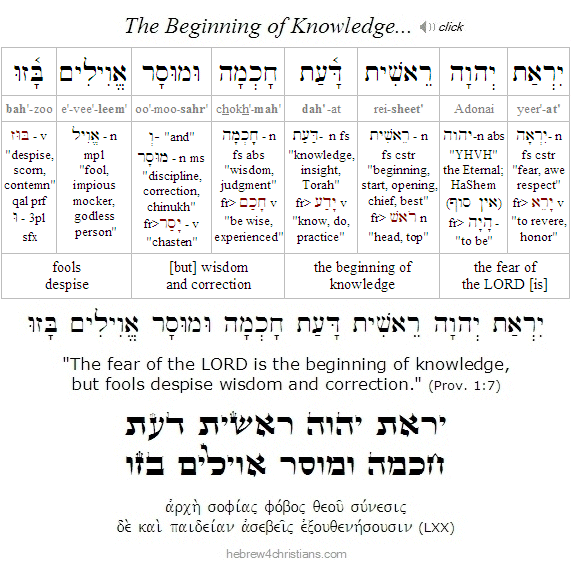
The Scriptures warn us to "pay more careful attention to what we have heard so that we do not drift away" (Heb. 2:1). We must be anchored to the truth lest we become shipwrecked in our faith. Drifting occurs slowly and almost imperceptibly, though the end result is as deadly as openly turning away from God in outright apostasy. As C.S. Lewis once wrote, "The safest road to hell is the gradual one - the gentle slope, soft underfoot, without sudden turnings, without milestones, without signposts." The devil seeks to lull you to sleep...
Spiritual danger is just as real as physical danger, though most people pretend it isn't because it isn't as easily seen. The danger today is to give up hope, to "go with the flow," to become numb, to drift off asleep, and to die inside... It is far more dangerous to tranquilly ignore God's mercy, or to make a pretense of knowing God's grace, than it is to blatantly break his law. Therefore the urgent need is to remember, to hear, and to awaken the soul to face the truth about reality. We must focus the heart, concentrate the will, and consciously "set" the Lord always before us (Psalm 16:8). Each day we must awaken from our emptiness to reaffirm the central truth: "Hear, O Israel, the LORD is our God; the LORD is one; and you shall love the LORD your God with all your heart and with all your soul and with all your might" (Deut. 6:4-5). As the Apostle Paul said, "Awake, you who sleep, Arise from the dead, And Christ will give you light" (Eph. 5:14).
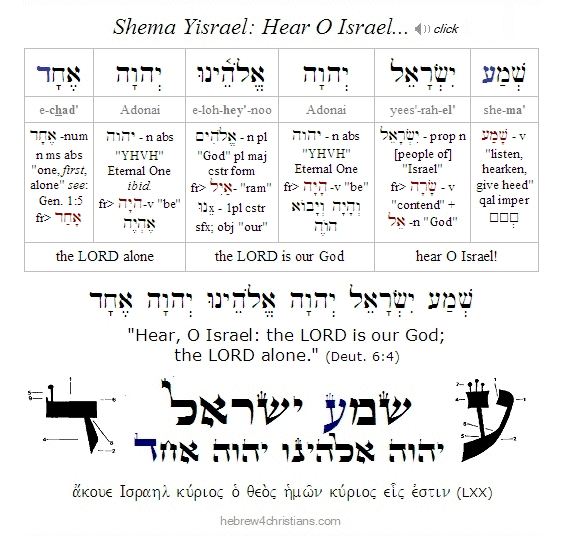 |
What's perhaps most heroic about Job is that he never turned away from hope, despite the crucifixion of his world. As Kierkegaard said, "The moment the LORD took everything away, he did not say, 'The LORD took away,' but first of all he said, 'The LORD gave..." (Upbuilding Discourses). Amen: יהוה נָתַן ויהוה לָקָח. His later words of protest were born of faith's deep struggle: "Where are you, God? Have you not promised never to leave me? Why am I alone in this pain, blind to your Presence?" Job's struggle to vindicate God's goodness and love despite inexplicable suffering was not a problem of unbelief, but rather a problem of how to reconcile the gap between present reality and the expectation of hope...
Therefore we must be vigilant to secure our high calling in Messiah: "Let us know; let us press on (i.e., נִרְדְּפָה, "pursue after") to know the LORD; His going out is sure as the dawn; He will come to us as the showers, as the spring rains that water the earth" (Hosea 6:3). The day is drawing near, and now - more than ever - we must remain steadfast. May God help you pursue him be'khol levavkha – "with all your heart" – because He has promised, "You will seek me and find me, when you seek me with all your heart" (Jer. 29:13). And may the love of the LORD be upon you, even as you put your hope in him (Psalm 33:22).
For more on this subject, see "The Tochechah: Further Thoughts on Bechukotai."
 |
Feeding on Faithfulness...
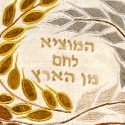
05.28.19 (Iyyar 23, 5779) In our Torah for this week (i.e., Bechukotai) we read: "You shall eat your bread to the full and be satisfied" (Lev. 26:5). The gift of contentment is a great blessing, since it means being free from the pain produced by unrelenting and imperious desire... Indeed, a perpetual, insatiable craving is a sign of slavery to inner emptiness, and no amount of food, drugs, romance, etc., can ever fill this spiritual void. This is why we need true bread, the bread that gives life (לֶחֶם הַחַיִּים), and this bread is the spiritual nourishment Yeshua gives to our hearts (John 6:35). When we taste his bread, when we commune with him, we soon learn that our desires for other things are hallow, futile, and empty. The more we feed on his love, the more we will find ourselves free the tyranny of lesser desires.
תּוֹדִיעֵנִי ארַח חַיִּים
שׂבַע שְׂמָחוֹת אֶת־פָּנֶיךָ
נְעִמוֹת בִּימִינְךָ נֶצַח
toh·dee·ei·nee · oh·rach · cha·yeem
soh·va' · se·mah·khot · et · pah·ney·kha
ne·ee·moht · bee·meen·kha · ne·tzach

"You will cause me to know the path of life;
in your presence there is fullness of joy;
at your right hand are pleasures forevermore."
(Psalm 16:11)

Download Study Card
The blessing we traditionally regularly recite over bread (hamotzi lechem) is a prophecy of sorts: "Blessed are You, Lord our God, who will bring bread up from the earth." This applies first of all to the resurrection of Yeshua from the dead, but it also applies to Yeshua as lechem ha-chayim (לֶחֶם הַחַיִּים), the Bread of Life, who meets our heart's needs (John 6:35). As we feed on God's faithfulness, we shall be satisfied... May we all partake of the blessing!
Remembering Jerusalem...
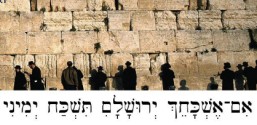
[ Yom Yerushalayim, or Jerusalem Day, will be observed Saturday, June 1st (after sundown) throughout the following day (i.e., June 2nd) until sunset... ]
05.27.19 (Iyyar 22, 5779) In Israel, "Jerusalem Day" (i.e., Yom Yerushalayim: יום ירושלים) commemorates the re-unification of old city of Jerusalem on June 7th, 1967 during the Six Day War. In 1968 the Chief Rabbinate of Israel declared Iyyar 28 to be a minor holiday to thank God for answering the 2,000-year-old prayer of "Next Year in Jerusalem." On March 23, 1998, the Knesset passed the Jerusalem Day Law, making it an annual national holiday. This year, Iyyar 28 runs from Saturday, June 4th (after sundown) through Sunday, June 5th (until sundown). Sha'alu shelom Yerushalayim (Psalm 122:6).
The Hebrew word "Zion" (צִיּוֹן) is mentioned over 160 times in the Scriptures. That's more than the words faith, hope, love, and countless other key words... And since Zion is a poetic form of the word Jerusalem (יְרוּשָׁלַםִ), the number of occurrences swells to nearly 1,000! Since it's the most frequently occurring place name in all the Scriptures, it's no overstatement to say that God Himself is a Zionist.... "Out of Zion, the perfection of beauty, God shines forth" (Psalm 50:2). "The LORD loves the gates of Zion more than all the dwellings of Jacob. Glorious things are said of you, O City of God" (Psalm 87:2-3). Indeed, Yeshua our Savior called Jerusalem the "City of the great King" (Psalm 48:2; Matt 5:35): It is the place (הַמָּקוֹם) where He was crucified, buried, resurrected, and ascended to heaven; and is it furthermore the place where He will return to earth (Zech. 14:1-9).
In Psalm 122:6 it is written, שַׁאֲלוּ שְׁלוֹם יְרוּשָׁלָםִ - sha'alu shelom Yerushalayim - "Pray for the peace of Jerusalem," a phrase that reveals prophetic truth about our Savior and Messiah. The word sha'alu (שַׁאֲלוּ) means "you ask" (as in ask a sheilah, a question), shalom (שׁלוֹם) is the name of Yeshua, the Prince of Peace (i.e., Sar Shalom: שַׂר־שָׁלוֹם), and Jerusalem means "the teaching of peace" (Jeru- comes from the same root as the word Torah [ירה], which means "teaching"). The phrase sha'alu shelom Yerushalayim can therefore be construed, "ask about the Prince of Peace and His Teaching." Yeshua is indeed the rightful King of Jerusalem (Matt. 5:35) who is coming soon to reign over all the earth.
שַׁאֲלוּ שְׁלוֹם יְרוּשָׁלָםִ
יִשְׁלָיוּ אהֲבָיִךְ
sha·a·loo · she·lohm · ye·roo·sha·la'·yeem
yeesh·la'·yoo · o·ha·va'·yeekh

"Ask for the well-being of Jerusalem;
May those who love you be at peace" (Psalm 122:6).

Download Study Card
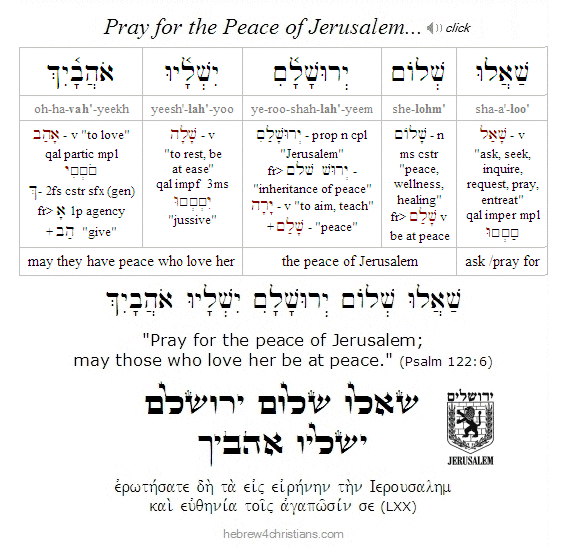
Memorial Day...

05.27.19 (Iyyar 22, 5779) In the United States, Memorial Day is a national holiday observed on the last Monday of the month of May, that commemorates the sacrifice of those men and women who died in military service for their country. For those who have lost a loved one during their military service, please accept our heartfelt condolences and appreciation for your great sacrifice... And may the LORD God Almighty have mercy upon all the nations of the world by imparting the revelation of His Living Torah, Yeshua, as it says, "Where there is no prophetic vision the people cast off restraint, but blessed is the one who keeps Torah" (Prov. 29:18). If there is no prophetic vision, no apprehension of revelation, there is no direction, and this can lead to moral and spiritual disorder, chaos, and bondage.
בְּאֵין חָזוֹן יִפָּרַע עָם
וְשׁמֵר תּוֹרָה אַשְׁרֵהוּ
be·ein · cha·zohn · yee·pa'·ra · ahm
ve·shoh·meir · toh·rah · ash·rei'·hoo

"Where there is no prophetic vision the people cast off restraint,
but blessed is the one who keeps Torah." (Prov. 29:18)

Download Study Card
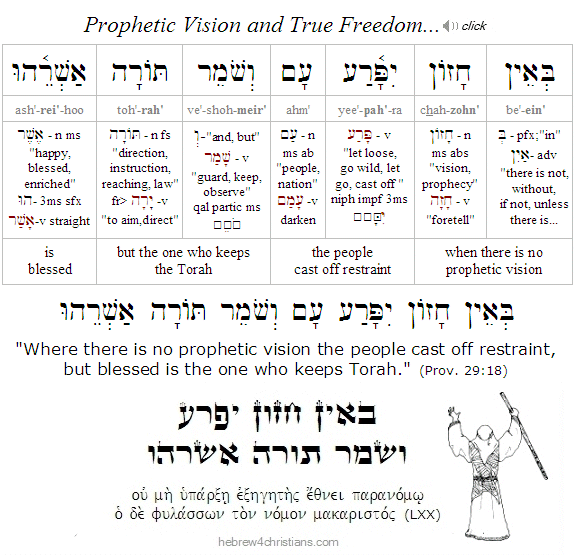
Note: Though our kingdom is not of this world, please pray for the United States of America -- a nation that has come under philosophical and ideological attack from those who seek to undermine America's history in order to forward their perverse agenda... Pray for God's mercy and grace for this land, and above all, for the miracle of teshuvah to turn many to Him in these latter days. Thank you.
The Ascension of Messiah...
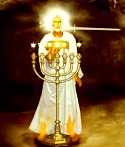
[ Wednesday, May 29th after sundown marks the 40th day of the Omer Count... ]
05.26.19 (Iyyar 21, 5779) We are in the midst of Sefirat Ha-Omer (the "Counting of the Omer"), a 49 day countdown that runs from Nisan 16 through Sivan 5. The first day of the omer count began on the second night of Passover, and the last day occurs the day before the great jubilee of Shavuot ("Pentecost"). On our Gregorian calendars, these dates run from April 23rd until June 10th this year. This is a "countdown period" leading to the giving of the Torah at Sinai and the giving of the Holy Spirit to Yeshua's disciples...
 |
Wednesday, May 29th after sundown (Iyyar 25) marks the 40th day of the Omer Count (i.e., Mem B'Omer), the time associated with the ascension of Yeshua back to the heavenly realm (Luke 24:44-53; Acts 1:9-11; Eph. 4:8). A thousand years before the birth of our Moshiah (מוֹשִׁיעַ), David prophesied of the ascension when he announced the Lord's enthronement at the right hand of God (Psalm 110:1; Matt. 22:41-46; 26:64). Recall that Yeshua told His followers that it was good that he would leave them, so that the Holy Spirit (רוּחַ הַקּדֶשׁ), the "Comforter" or "Advocate" (παράκλητος), would be given to them. "But I tell you the truth, it is for your advantage that I am going away. For if I do not go away, the Advocate (ὁ παράκλητος) will not come to you, but if I go, I will send him to you" (John 16:7). Notice that the word translated as "advantage" here is the Greek word συμφέρω (from σύν, "with" and φέρω, "to carry"), which suggests that we would be given power that "carries us" with the Lord during the trials of this life... Bo, Ruach Elohim: "Come, Holy Spirit..."
Note: For more on this, see "Mem B'Omer and the Ascension of Yeshua."
 |
Parashat Bechukotai - בְּחֻקּתַי

05.26.19 (Iyyar 21, 5779) Our Torah reading this week, parashat Bechukotai, is the final portion of the central book of the Torah (i.e, Leviticus) which begins with the promise that if the Israelites would walk in the LORD's statutes (chukkot) and commandments (mitzvot) and perform them, then they would enjoy material blessings and dwell securely in the promised land. Moreover the LORD Himself would make His dwelling with them and would walk among them as their God. The people of Israel would then truly be am segulah (עַם סְגֻלָּה) - a treasured people among all the nations of the earth.
On the other hand, if the people disobeyed God and disregarded His commandments, then they would be considered covenant-breakers, and they would experience all manner of distress and tribulation in their lives. They would experience panic attacks, diseases, heartache, and all manner of tsuris (vexation, trouble); their enemies would eat their increase, and those who hate them would rule over them; they would flee at the rustle of a leaf, and their lives would be full of terror and misery – all because they refused to put the LORD God first in their lives. And if after all this trouble the people would still refuse to return to the LORD, the worst punishment of all would befall them: exile from the promised land and banishment from the Presence of the LORD Himself.
Nonetheless, despite their disobedience, God's love and mercy for Israel would never fully depart, for "if they confess their iniquity and the iniquity of their fathers in their treachery that they committed against me, and also in walking contrary to me, so that I walked contrary to them and brought them into the land of their enemies – if then their uncircumcised heart is humbled and they make amends for their iniquity, then I will remember my covenant with Jacob, and I will remember my covenant with Isaac and my covenant with Abraham, and I will remember the land" (Lev. 26:40-42). Moreover, even while they are in exile, in the land of their enemies, God vowed: "I will not cast them away; nor will I ever abhor them to destroy them and to break My covenant with them; for I am the LORD their God" (Lev. 26:44).
The portion (and the Book of Leviticus) ends with a discussion of various laws pertaining to vows and tithes that a person may make to contribute towards the upkeep of the Sanctuary. These include dedications of persons, animals, houses, and lands. The scroll of Leviticus ends with the emphatic statement: "These are the commandments that the LORD commanded Moses for the people of Israel on Mount Sinai" (Lev. 27:34).
Ten Matters of Heart (לב שבועות)
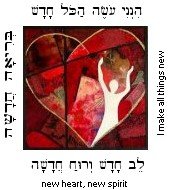
[ The climactic "jubilee" of Shavuot begins at sundown on June 8th this year... ]
05.24.19 (Iyyar 19, 5779) During the holiday of Shavuot (i.e., "Weeks" or "Pentecost") it is customary to reaffirm God's covenant with us and to renew our identity as God's children. Toward that end, and in the light of the inner meaning of Torah revealed by Yeshua our beloved Messiah (Jer. 31:31-34), we may summarize the Ten Commandments of Torah this way: 1) "I AM your only Deliverer, the One who loves and chooses you; 2) love me passionately and exclusively; 3) regard my love as sacred; 4) rest in me; 5) honor your life and its history; do no harm to others: 6) forsake anger, 7) abandon lust, 8) renounce greed, and 9) abhor lying, and 10) refuse envy. Know and understand that you belong to me and that you are accepted. Love others as you are also loved..." (see Exod. 20:1-17; Deut. 6:4-5; Lev. 19:18; Matt. 22:36-40; Rom. 13:8-10; Gal. 5:14).
For more please see:
The Righteousness of God (צדקת יהוה)

05.24.19 (Iyyar 19, 5779) It is not "I obey, therefore I am accepted," but rather, "I am accepted, and that is the obedience (ὑπακούω) of faith." The opposite of sin is not virtue but faith, as Paul said: πᾶν δὲ ὃ οὐκ ἐκ πίστεως, ἁμαρτία ἐστίν, "whatever does not proceed from faith is sin" (Rom. 14:23). Putting it the other way around, trust is the means of attaining God's righteousness and blessing (Eph. 2:8, Rom. 3:20-27). Paul calls this the "law of faith" (i.e., torat ha'emunah: תּוֹרַת הָאֱמוּנָה). Accepting that God is "for you" and "with you," and trusting that you are accepted -- despite your unacceptability -- is the first and most fundamental step of faith, since this honors the love and blessing of God. It is not your wisdom or cleverness that enlightens your way in the truth, however, but the miracle of disclosure from heaven. It is all a gift: you need God to even see that you need God! Right thinking is indeed a path to God, but it is the givenness of truth that enables the seeker to seek; it is the reality of the Teacher (the Savior) that is all-important. By itself true belief does not conjure divine favor, and indeed it may hide the deeper truth that the heart exists in untruth despite the head's "true" doctrine. Likewise, while goodness is indeed a path to God, true goodness is found in God's righteousness that makes the way right for the trusting heart... Genuine obedience to the truth of God - inner connectedness rather than merely outer obedience - marks the divine mercy of transformation.
"Not by works of righteousness (מַעֲשֵׂי הַצְּדָקָה) which we have done, but according to his mercy he saved us (ἀλλὰ κατὰ τὸναὐτοῦ ἔλεον ἔσωσεν ἡμᾶς), by the washing of regeneration, and renewing of the Holy Spirit (רוּחַ הַקּדֶשׁ), whom he poured out on us richly through Yeshua our Savior, so that being justified by His grace we might become heirs according to the hope of eternal life" (Titus 3:5-7). The meaning of the gospel is, among other things, that you believe in the love of God that forever heals us through the life of Yeshua. To those who have ears to hear, this is the deeper meaning of "shabbat" (שַׁבָּת), chaverim!
Note: Of course(!) moral obedience is necessary for us, but that obedience is manifested by the life of Messiah, by our union with Him, by our love relationship, our connection to Him, and by the blessing from heaven (i.e., the Spirit of God).... We "do" Torah truth by means of the One who is the Living Torah, the Heart of Torah, and the Goal of Torah. Shabbat Shalom!
 |
Walking in the Light (אור התורה)
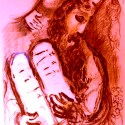
05.24.19 (Iyyar 19, 5779) While it is wonderfully true that Yeshua died to free us from our sins, the corollary is that he calls us to walk in the light of his glorious Divine Presence (2 Cor. 5:15). The two go together. You are redeemed by God to serve him. Simply believing (or hoping) that "Jesus died for your sins" doesn't mean walking through your days without any thought of where you are going. Our teshuvah must make traction with our feet as we go forward by faith. This means we have a responsibility to practice the truth of Messiah, partaking his vision, hashkafah (philosophy) and compassion. Indeed each of us will give account for his or her life before God, as it is written: "For we must all appear before the judgment seat of the Messiah (כִּסֵּא־דִין הַמָּשִׁיחַ), so that each one may receive what is due for what he has done in the body, whether good or evil. Therefore, knowing the fear of the Lord (יִרְאַת יהוה), we persuade others" (2 Cor. 5:10-11). We must learn to be conscious of life's prodigious sanctity and eternal significance... Each of us is "on the road" of life going someplace; each of us has an appointment with the full revelation of the truth.... Therefore, since we only have this hour, understand today to be the day of salvation. "No creature is hidden from His sight, but everything is naked and exposed to the eyes of him to whom we must give account" (Heb. 4:13). Therefore the Spirit admonishes those who have ears to hear: "Take care, friends, lest there be in any of you an evil, unbelieving heart, leading you to fall away from the living God, but exhort one another every day, as long as it is called "today," that none of you may be hardened by the deceitfulness of sin... Today - if you hear His voice - do not harden your hearts (Heb. 3:12-13,15).
Friend, everything matters; nothing is trivial; and there is a weight of glory that surrounds our lives... Therefore act as if your choices have eternal significance, because they really do; pray as if your life depends on it, because it really does. Praying in accordance with the will of God - namely, for you to know God, to walk in the light of love, joy, peace; to be filled with wisdom, patience, kindness, and so on, will assuredly move heaven and earth (1 John 5:14). God is forever faithful and always hears those who call out to him with sincerity of heart: "The LORD is near to all who call out to him, to all who call out to him in truth" (Psalm 145:18).
קָרוֹב יְהוָה לְכָל־קרְאָיו
לְכל אֲשֶׁר יִקְרָאֻהוּ בֶאֱמֶת
ka·rohv · Adonai · le·khol · ko·re·av
le·khol · a·sher · yeek·ra·oo'·hoo · ve·e·met

"The LORD is near to all who call to him,
to all who call to him in truth."
(Psalm 145:18)

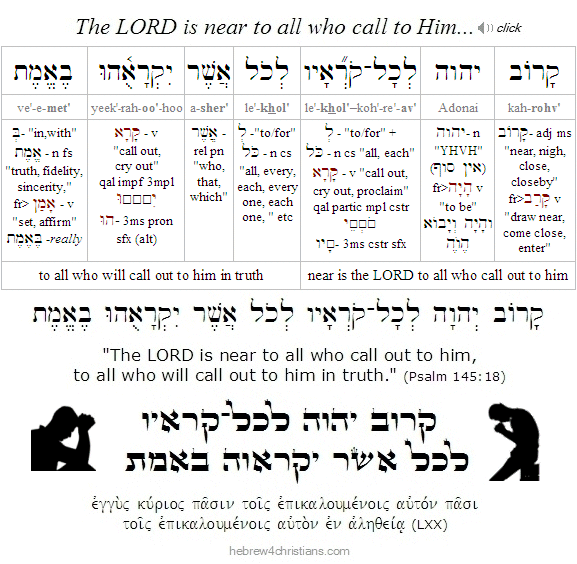
Hearing Abba's Voice...
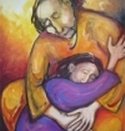
[ During Shavuot (i.e., "Pentecost") the gift of Torah was given to us -- first under the fiery canopy at Mount Sinai and later as an inner fire imparted by the power of the Ruach HaKodesh (see Acts 1:7-8; 2:1-4). In light of this it is good to hear again the heart of our Heavenly Father regarding the significance of divine truth... ]
05.24.19 (Iyyar 19, 5779) "Dear child of mine, do not forget my Torah (תּוֹרָתִי), but let your heart keep my commandments (מִצְוֹתַי). Doing so will add to you length of days, (ארֶךְ יָמִים), long life, and peace (שָׁלוֹם). Do not abandon the heart of Your Father by losing sight of mercy and truth (חֶסֶד וֶאֱמֶת); no! Tie them around your neck; inscribe them upon the table of your heart (לוּחַ לִבֶּךָ), that is, make them part of your inner being and will. Doing so will reveal my grace (חֵן) and good understanding (שֵׂכֶל־טוֹב) before the eyes of God and others. Trust in your heavenly Father with all your heart (בְּטַח אֶל־יְהוָה בְּכָל־לִבֶּךָ) and don't seek to be in control, trying to figure everything out on your own (וְאֶל־בִּינָתְךָ אַל־תִּשָּׁעֵן). Listen for your Father's voice in everything you do; in all your ways know His heart (בְּכָל־דְּרָכֶיךָ דָעֵהוּ), and then your ways will be directed in the truth. Don't assume that you know it all; abandon your self-conceit: Revere your heavenly Father (יְרָא יְהוָה) and flee from what you know is self-destructive and evil! Doing so will impart healing (רִפְאוּת) to you: your body will glow with health, your very bones will vibrate with life! Honor your Heavenly Father with everything you own; give him your first and the best of what you have (מֵרֵאשִׁית כָּל־תְּבוּאָתֶךָ); then your barns will burst with plenty, and your wine vats will be overflowing" (Prov. 3:1-10).
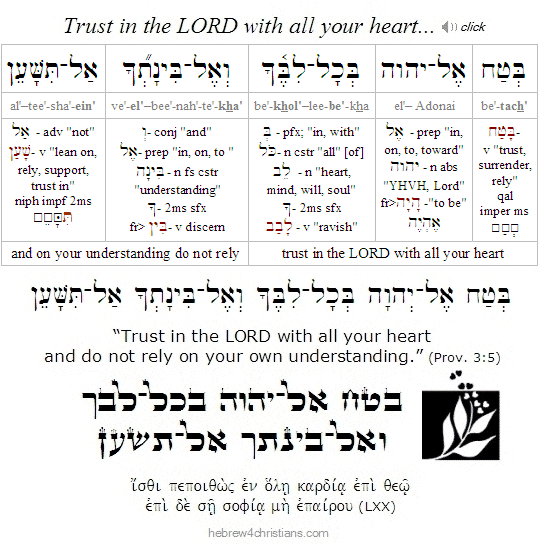 |
 |
Chosen by the Messiah...

05.23.19 (Iyyar 18, 5779) Shalom dear friends. Do you understand that we are a "chosen people" (am nivchar) called to bear witness of the salvation of the Lord? As Yeshua said: "You did not choose me, but I chose you and appointed you that you should go and bear fruit and that your fruit should abide, so that whatever you ask the Father in my name, he may give it to you" (John 15:16). Many stumble over these words because they want to be in control and to choose God on their own terms. The focus therefore is on themselves -- on their decision, on the way they decide to "serve" him, on how they justify themselves, and so on. Such people suppose that they do what they do for God's sake and they therefore they esteem their religious practices as a means of finding divine mercy. According to Yeshua, this approach is wrong because we cannot choose God, but we must be chosen by him, and as soon as we surrender to his will as Master and LORD, we are empowered by the Spirit to bear fruit. The Lord always has the prerogative in our relationship with him (John 6:37,44). The word used in the original text for "choose" means being "called out" (i.e., ἐκ, "out" + λέγω, "speak") or "elected" (i.e., ἐκλεκτός, from the same root). Just as Israel was chosen by God to receive the Torah and to carry the message of the coming Messiah (see Deut. 4:8, 37; Isa. 41:8-10; 42:6; Rom. 3:1-2; 9:4; etc.), so we are chosen to carry the message of reconciliation with God (i.e., καταλλαγή, "exchange," from κατά, "down from" +ἄλλος, "other") given through Yeshua's sacrifice for us (2 Cor. 5:18-20; Rom. 5:10). Those called by Yeshua are called a "chosen people" (עם נבחר) to proclaim the excellencies of him who called you out of darkness into his marvelous light (1 Pet. 2:9).
"Blessed be the God and Father of our our Lord Yeshua the Messiah, who has blessed us in Messiah with every spiritual blessing in the heavenly places" (Eph. 1:3). Note that the Greek text translated "with every spiritual blessing" (i.e., ἐν πάσῃ εὐλογίᾳ πνευματικῇ) does not refer to "merely spiritual" as opposed to substantial or material blessings, but rather the blessing given by the Holy Spirit, to those powers and graces "in heavenly places" (ἐν τοῖς ἐπουρανίοις), that derive from the kingdom of God, which are the highest blessings of all.
 |
Mercy's Like-for-Like...
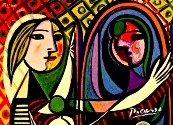
[ The following is related to our Torah reading for this week, Parashat Emor.... ]
05.23.19 (Iyyar 18, 5779) In our Torah portion this week we encounter the spiritual principle of middah keneged middah, or "measure for measure," wherein what we do to others will be replayed or "mirrored" back to us. ""Breach for breach, eye for eye, tooth for tooth: whatever injury he has given to another person shall be given to him"" (Lev. 24:20). Some of the sages comment that this is not so much about retributive justice as it is about reciprocity of the will. As you see others, so you will see yourself; as you cause a defect in another, so it will be revealed within you. Therefore the Baal Shem Tov said, "Other people are like mirrors: the faults we see in others our own." Indeed Yeshua taught us: "condemn not and you will not be condemned; release, and you will be released" (Luke 6:37). As we forgive others, so we find our own forgiveness. "Love covers a multitude of sins" (Prov. 10:12).
 |
Rest and Creativity...

[ The following is related to our Torah reading for this week, Parashat Behar.... ]
05.23.19 (Iyyar 18, 5779) In our Torah portion for this week (i.e., parashat Behar), the LORD gave the people instructions about how they were to manage the promised land once they finally entered it. Instead of commanding the people to work hard to sustain themselves, however, God gave them laws of rest – of releasing their hold on the land (see Lev. 25:1-7). During the "Sabbatical years" (shemittah) the land was to lie fallow, and the people could eat only what was produced naturally, without any farming or organized harvesting. Letting go of the land required the people to trust that God was in control of nature's creative processes, and to acknowledge that the process of growth is mysterious and divine. As Yeshua said: "The Kingdom of God (מַלְכוּת הָאֱלהִים) is like someone who spreads seed on the ground. He goes to sleep and gets up, night and day, and the seed sprouts and grows, though he does not know how. By itself (αὐτομάτη, i.e., "automatically") the soil produces a crop, first the stalk, then the head, then the full grain in the head. And when the grain is ripe, he comes in with his sickle because the harvest has come" (Mark 4:26-29). In other words, the "ordinary" process of the growth of a seed is miraculous and is a gift from above. The Torah of the Sabbatical Year teaches us that creativity and fruitfulness requires that we let go and leave the outcome to God.
 |
Comfort ye My People...

05.22.19 (Iyyar 17, 5779) "The LORD ... has sent me to bind up the brokenhearted, to proclaim liberty to the captives, and the opening of the prison to those who are bound" (Isa. 61:1). Note here that Messiah our Savior (משיח מושיענו) was explicitly sent to "bind up" the wounds of the brokenhearted. The Hebrew verb chavash (חָבַשׁ), "to bind up," can also mean to govern or to restrain... The LORD is near to the nishbar lev, the one with a broken heart. He restrains its woundedness and salves its hurt (Psalm 34:18). The Hebrew word "lev" (לב) metaphorically refers to our inner life, that is, our affections, mind, and will. This is revealed in the letters of the Hebrew word itself: the Lamed (ל) depicts a "staff" used to direct something (i.e., the will), and the Bet (בּ) depicts the "house" of the physical body. Lev then represents our inner life of thought and feeling expressed in our actions. Those who are broken in heart – the nishberei lev (נִשְׁבְּרֵי־לֵב) – have discovered that they cannot control their own lives, that they are inwardly "shattered," and therefore need divine help. Yeshua comes to those who are "poor in spirit" and viscerally humbled by their sin; He is near to those cut to the heart, to those who have bruised and wounded spirits and who live in great pain. It is for these the Savior rises to bring comfort....
This seems to be the divine pattern. "Truly, truly, I say to you, unless a grain of wheat falls into the earth and dies, it remains alone; but if it dies, it bears much fruit" (John 12:24). The hard "outer shell" of the seed must be broken so that the life of the Spirit can come through... Plainly put, God (and only God) can "deconstruct" the self so that life's priorities, focus, and passions are redirected to Him alone, the true Source of life.
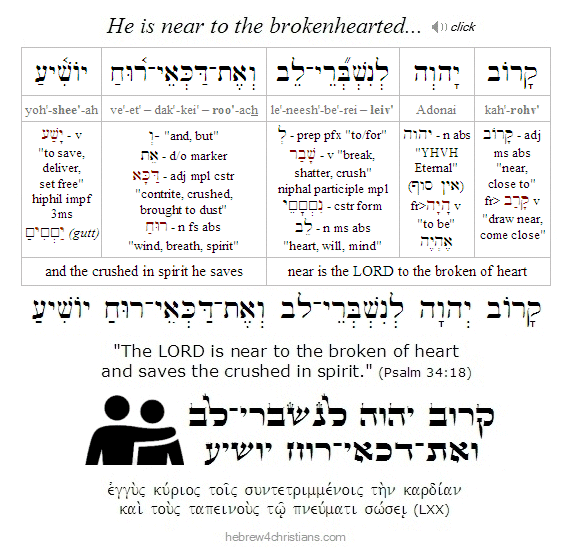 |
For more see: "The Spirit and Freedom: Further Thoughts on Shavuot."
Revelation of the Torah...
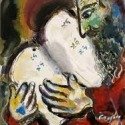
[ The following relates to Shavuot, the anniversary of the giving of the Torah... ]
05.22.19 (Iyyar 17, 5779) Jewish tradition often refers to Shavuot (i.e., "Pentecost") as "mattan Torah," the time of the revelation of Torah, and while that is true, I would argue that the meaning of "Torah" should not be limited to simply refer to the law code given at Sinai (i.e., the Ten Commandments and the various mishpatim (rules), chukkim (decrees), and so on), but includes the great vision of the Mishkan (Tabernacle), and with it, the sacrificial Altar, the blood of which was sprinkled over the tablets of the law located within the very heart of the Mishkan itself (i.e., the cover of the Ark of the Covenant within the "Holy of Holies"). In addition to the prescribed daily sacrifice of the lamb of God (i.e., korban tamid: קָרְבָּן תָּמִיד), the central ritual of atonement given in the Torah is that of the anointed High Priest sprinkling sacrificial blood over the tablets of the law upon the kapporet (the "mercy seat") of the Ark of the Covenant - the Place where "Love and truth meet, where righteousness and peace kiss" (Psalm 85:10). It was from the midst of the surrounding cloud in the Holy of Holies that the Voice of the LORD was heard, just as it was in the midst of the surrounding cloud of darkness upon the cross that Yeshua cried out in intercession for our sins...
 |
Knowing the Heart of Torah...
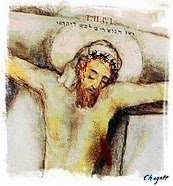
05.22.19 (Iyyar 17, 5779) Though it is indeed true that "you are saved by grace through faith" (τῇ χάριτί ἐστε σεσῳσμένοι διὰ τῆς πίστεως) -- that is, you are declared "righteous" (צַדִּיק), set free from the curse of the law (Deut. 27:26, Gal. 3:13), and are given eternal life by means of trusting in the promise of God's love -- it is dangerous to assume that the freedom God gives you negates the significance of the law (תּוֹרָה) and its expression of God's holy will. Chas v'chalilah - God forbid! The sacrificial system of the law was a means of provision to find healing for our sin until the Messiah came to deliver us from the sickness of spiritual death. The cross means nothing apart from the law, and the law means nothing apart from the cross: Only the cross allows God's love and truth to meet (Psalm 85:10); only the cross reveals the true Holy of Holies where the blood was placed over the Ark of the Law; and only the cross intimates the Inner Sanctum of God's heart. Because of the cross, a holy God is able to truly love and help the trusting sinner (Rom. 3:26). It is written: "Righteousness and justice are the foundation of your throne (צֶדֶק וּמִשְׁפָּט מְכוֹן כִּסְאֶךָ); steadfast love and faithfulness go before you" (Psalm 89:14). Because of Yeshua, God is vindicated as entirely just - and the Justifier of those who trust in His redemptive love (Rom. 3:24-26). This is the deeper unity of the Name YHVH (יהוה), the Savior and LORD, revealed to Moses after the sin of the Golden Calf (Exod. 34:6-7), and this is the essential meaning of the cross of Yeshua, where the LORD passionately "prayed within Himself" so that His compassion would overcome His fearful judgment for our sins. "... that they may be one, even as we are one" (John 17:22). Yeshua is the prayer of God the Father for His children...
חֶסֶד־וֶאֱמֶת נִפְגָּשׁוּ
צֶדֶק וְשָׁלוֹם נָשָׁקוּ
che'·sed ve·e·met neef·ga'·shoo
tze'·dek ve·sha·lom na·sha'·koo

"Love and truth meet;
righteousness and peace kiss."
(Psalm 85:10)

Download Study Card
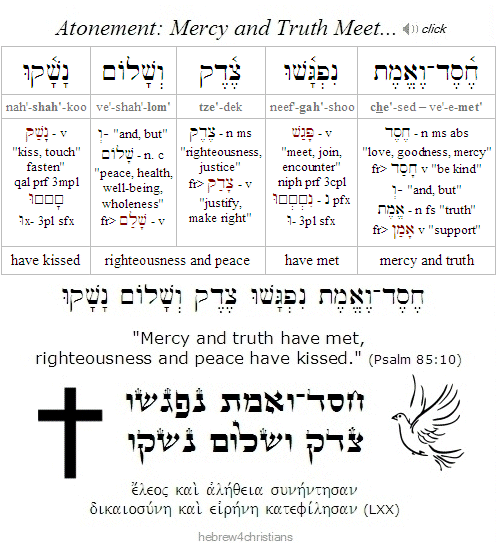
There is always a spiritual temptation to disregard the importance of the law and to offer various excuses why it no longer applies to the Christian. We must be wary about how our lower nature seeks to justify its own lawlessness... As Paul said, "Do we then overthrow the law by this faith? By no means! On the contrary, we establish the law (Rom. 3:31). The commandment is "holy and just and good" (Rom. 7:12). Please understand that I am not advocating Torah observance as the means of attaining righteousness before God (since that centers on the former covenant given at Sinai) and yet neither am I saying the Christian should ignore the law and regard it as obsolete or without divine voice (since the new covenant is a matter of the law being written upon the heart). Yeshua is the eternal Word of God, the Voice in the midst of the Fire, and yet he warned that many who professed faith in him would one day be rejected because they spurned God's law: "On that day many will say to me, 'Lord, Lord, did we not prophesy in your name, and cast out demons in your name, and do many mighty works in your name?' And then will I declare to them, 'I never knew you; depart from me, you workers of lawlessness' (i.e., ἀνομία, from -α ('not') + νομος, 'torah'). If God is love, he is, by definition, something more than mere kindness. And it appears, from all the records, that though he has often rebuked and condemned us, he has never regarded us with contempt. He has paid us the intolerable compliment of loving us in the deepest, most tragic, most inexorable sense" (C.S. Lewis: Problem of Pain). We are given a "severe mercy." The harrowing agony of the cross, the torture and suffering of our Lord, should shock us into understanding the weight of the law. The spectacle of the cross puts an end to all mawkish sentimentality about God's love. As Lewis said, the Lord loves you "tragically," at the expense of his own precious life offered for your deliverance...
Living in response to the love of God never leads to spiritual anarchy or "lawlessness," since the Law of Messiah (תּוֹרַת הַמָּשִׁיחַ) is to "bear one another's burdens" (Gal. 6:2) by emulating the sacrificial love that Yeshua has revealed and bestowed to us (John 13:15, 34, 15:12, etc.). God's love transforms and changes us. "If you love me," Yeshua said, "keep my commandments" (John 14:15, 15:10). God loves you just the way you are, yes, but he loves you so much he will never leave you just the way you are... Living in genuine faith means living by means of the agency of the Holy Spirit (רוּחַ הַקּדֶשׁ) -- also called the Comforter (παρακλητος) -- through whom the inner intent of the law is "written upon the heart" by faith (Jer. 31:33; Gal. 5:18, 22-23). The heart of the law, then, is the law of the Gospel message itself - to love God and to serve others through the miraculous agency of God's redemptive grace (Gal 5:13). It is a circle of divine communion, a result of our union with Messiah. Ultimately the love of God is the fulfillment of the law (Rom. 13:8-10, Gal. 5:14; James 2:8), and this love is manifest in the Person and Presence of Yeshua, the perfect fulfillment of the law of love (John 1:1, 13:34-35, 1 John 4:10-12, 2 John 1:6, etc.). The love of Yeshua imparts "righteousness to every one who believes" (Rom. 6:22; 10:4).
Man prays to God, but to whom does God pray? For what does He pray? Or do you think that the Almighty has no desires of His own, no yearning of heart? The sages of the Talmud believed that God indeed addresses himself: Yehi ratzon milfanai, "May it be acceptable before me, may it be My will, that my compassion overcome my anger, and that it may prevail over my justice when my children appeal to me, so that I may deal with them in mercy and in love" (Berachot 6a). The prayer of God - His heart's yearning and desire - is for his children to receive his love (2 Pet. 3:9; 1 Tim. 2:4; John 3:16; Ezek. 18:23). As Yeshua prayed, "Holy Father, keep them in your Name, which you have given me, that they may be one, even as we are one... I in them and you in me, that they may become perfectly one, so that the world may know that you sent me and loved them even as you loved me" (John 17:11,23). Yeshua died on the cross to bear the shame for your sins, to be sure, but he did this so that you could be accepted and securely loved forever.... It is the love of God that is the goal of all things, after all. When Yeshua cried out, "It is finished" and breathed his last breath as He died for our sins upon the cross, the greatest exhalation of the Spirit occurred, the greatest sigh, the greatest utterance was ever declared. The sacrificial death of Yeshua for our deliverance was God's final word of love breathed out to those who are trusting in Him.
"What precisely is profound in Christianity is that Christ is both our Atoner and our Judge, not that one is our Atoner and another our Judge, for then we would nevertheless come to be judged, but that the Atoner and the Judge are the same…" – Kierkegaard (Journals)
Note: For more see: "The Heart of the Law and the Law of the Gospel."
Do you now believe?

05.22.19 (Iyyar 17, 5779) Soren Kierkegaard (1813-1855) notes that many people read the Bible after "skipping to the end" and pretending they know the "whole story," namely that love wins, and all shall be well... Nevertheless we must remember that the LORD is completely just and there is no intrinsic advantage given to Yeshua's contemporaries over those who are living today. The same message requires the same faith to encounter the truth of the Teacher. "I AM the resurrection and the life. Whoever believes in me, though he die, yet shall he live, and everyone who lives and believes in me shall never die. Do you believe this?" (John 11:25-26). Or do you suppose that you would have acted in faith had you been alive when Yeshua was here on earth? Consider well. When Mary held her newborn son and changed his soiled clothing, did she then believe he was the Savior of the world? Did she fully understand the "end of the story" at that time? When the disciples watched with horror as their Master was arrested, unjustly condemned, and then brutally crucified, did they then believe God was manifest in the flesh? Did they fathom the depths of God's providential love for them? And even after the resurrection from the dead, when Yeshua had directly appeared to his followers and they watched as he ascended on high, did they trust that eternal death was forever swallowed up by His overmastering and triumphant life?
Do you think our present generation would more readily accept the message of Yeshua more than that generation 2,000 years ago? That generation clamored: "We will not have this man rule over us!" (Luke 19:14), yet is this not the recurrent mantra of spiritual darkness spoken throughout the generations? How many of us read the Gospels and encounter something radically challenging, only to excuse ourselves and pretend that the question is not being asked of us? How many of us "take up our cross" and follow the path of sacrificial love? "But I say to you, love your enemies and do good to them that hate you, bless those who curse you, pray for those who abuse you" (Luke 6:27-28). Many want to believe they are following Yeshua's Torah here but hesitate when they hear such things; they don't really want to trouble themselves by changing or denying their natural impulses... Kierkegaard laments: "The matter is quite simple. The Bible is very easy to understand, but we Christians are a bunch of scheming swindlers. We pretend to be unable to understand it because we know very well that the minute we understand we are obliged to act accordingly."
We must listen with a heart of faith to unlock the truth that speaks to the heart. If you believe only what you can tolerate, however, your faith is actually grounded in your own interests, not in the Divine Voice of Love that seeks to heal the world. "For he is our God, and we are the people of his pasture and the sheep of his hand today -- if you hear his voice" (Psalm 95:7). Today, if you hear his voice and do not harden your heart (Heb. 3:15). "Take care, brothers, lest there be in any of you an evil, unbelieving heart, leading you to fall away from the living God, but encourage one another every day, as long as it is called "today," so that none of you may be hardened by the deceitfulness of sin" (Heb. 3:12-13).
 |
Inner Transformation (שינוי פנימי)

05.21.19 (Iyyar 16, 5779) The fact that God knows the number of hairs on your head means that he knows you better than you know yourself... Your heavenly Father "sees in secret," and that also means that he can and will save you from whatever is hidden within you that still resists his love and touch... We have to trust in God's power to heal us, even when it seems that healing is not forthcoming, even when we still find ourselves divided, troubled, and anxious. We have to believe that God's help is always present. "Be strong and encouraged, all you who hope for the LORD" (Psalm 31:24).
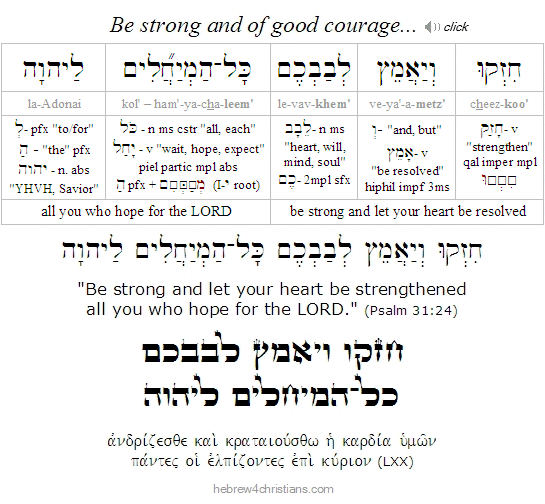 |
There is a glorious future that awaits you, dear friend; there is a promised end for those that turn to the LORD in their brokenness and need. God sees what He does within us, His "it-is-finished" work, the effect of His great salvation within our hearts, even if at this present hour this may be hidden from our eyes... There is appearance, and there is reality; and only God sees what is ultimately real. Though we see "through a glass darkly" we trust God's promise to be transformed into the divine nature, even if presently we find ourselves sinful, needy, and in disrepair... By God's grace we are what we are. So don't give up. We are "saved by hope" (ἐλπίδι ἐσώθημεν, Rom. 8:24), a hope for you today.
Keeping your Balance...
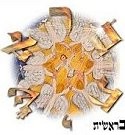
05.21.19 (Iyyar 16, 5779) An old chassidic tale says that every person should walk through life with two notes, one in each pocket. On one note should be the words bish'vili niv'ra ha'olam (בִּשְׁבִילִי נִבְרָא הָעוֹלָם) -- "For my sake was this world created," and on the other note the words, anokhi afar ve'efer (אָנכִי עָפָר וָאֵפֶר) -- "I am but dust and ashes." Regarding the former statement, never say, "What does all this have to do with me?" Instead, do your share to supply something missing - be salt and light - and leave the world a little better for your sojourn within it. With regard to the latter statement, always understand that it is only on account of God's love that you exist during this time at all...
Unshakable Direction...
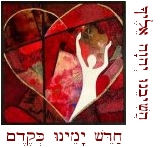
05.21.19 (Iyyar 16, 5779) Where it is written, "cast all your anxiety on him because he cares for you" (1 Pet. 5:7), the word translated "anxiety" (μέριμνα) comes from a Greek verb (μερίζω) that means to be fragmented or divided into parts and pieces. Being anxious is therefore the uneasy state of being unfocused and divided within oneself... King David understood the need for a unifying principle for his life: "One thing I ask of the Lord; that is what I will seek" (Psalm 27:4). He understood that walking in the truth required "uniting his heart," or "repairing the breach" within his inner affections so that he could experience reverence and awe before the Divine Presence (Psalm 86:11). King David knew that "right desire is the deepest form of prayer."
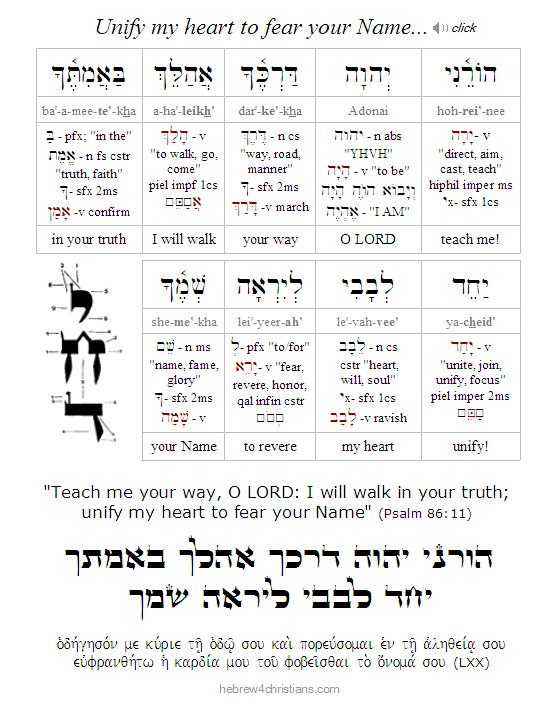 |
Purity of the heart is to will one thing... When we are anxious, we become inwardly shaken and divided, and thereby lose our sense of identity and purpose in this world. God invites us to come boldly before Him to find help (Heb. 4:16). He is a "very present help in trouble" (Psalm 46:1). We cast our burdens upon the LORD so that He can sustain us (Psalm 55:22), and that we may have a "right spirit" (רוּחַ נָכוֹן) renewed within us (Psalm 51:12). We can bring our brokenness to God - including those distractions that tear us away from Him and that make us inwardly "two-souled" - to find healing for our hearts. When we do so, we will discover the Source of Power that makes us "unshakable and always able to abound in every good work" (1 Cor. 15:58).
Breathing God's Name...
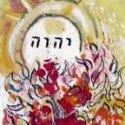
05.21.19 (Iyyar 16, 5779) In the Scriptures God's Name is revealed as YHVH (יְהוָה), which means "He is Present." The Name is formed from the words hayah ("He was"), hoveh ("He is"), and yihyeh ("He will be"): הָיָה הוֶה וְיִהְיֶה, indicating God's omnipresence. Note that all the letters of the Name are "vowel letters," which mean they evoke breath and life. This is the Name revealed to Moses thousands of years before the advent of other religions (Exod. 3:14), and indeed it is the Name associated with the nishmat chayim (נִשְׁמַת חַיִּים), the "breath of life," imparted to Adam in the orchard at Eden (Gen. 2:4). It is therefore the original Name of God "breathed out" to mankind. The Name Yeshua (יֵשׁוּעַ) means "YHVH saves." There is no other Savior beside Him, there is no other Name, there is no other LORD. "For I am the LORD your God, the Holy One of Israel, your Savior." Only Yeshua the Messiah can deliver you from the wrath to come (1 Thess. 1:10).
Many people live in regret over the past or in dread of the future. The Hebrew name of God, the Tetragrammaton (יהוה), means: "He is Present." We can only find God now, today, at this hour. Today if you hear His voice... Yeshua said, "The kingdom of heaven is within you" (מַלְכוּת הָאֱלהִים בְּקִרְבְּכֶם), that is, is to be found within the heart of faith (Luke 17:21).
The question is asked why the Torah was written without vowels, punctuation marks, and so on. The lack of vowels implies that we must bring breath (i.e., ruach, spirit) to our reading of the words; the lack of punctuation implies that we must be humble and rely on others to help us read with understanding. In other words, we must bring our heart to the reading and be open-minded to receive revelation.
 |
We need the power of the Holy Spirit to read correctly, and the Holy Spirit reveals the Living Word and glory of Yeshua: "It is the Spirit who gives life; the flesh is no help at all. The words that I have spoken to you are spirit and life" (John 6:63).
The Whole Commandment...
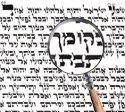
05.20.19 (Iyyar 15, 5779) "The whole commandment that I command you today you shall observe and do, so that you may live..." (Deut. 8:1). The Hebrew phrase kol ha'mitzvah (כָּל־הַמִּצְוָה), here translated as "the whole commandment," refers to the heart attitude, or the inner passion of the soul. Some have linked the word "commandment" (מִצְוָה) with the word "connection" (צוותא), suggesting that God's commandments are the means by which we cleave to Him, as is written: "this is the love of God (אַהֲבַת אֱלהִים), that we keep his commandments" (1 John 5:3). The commandments are "for life" (Lev. 18:5), which means they serve as the call of the Beloved to rise to something far greater... The "Whole Commandment" is to walk in God's love. As it is written, tamim yiyeh im Adonai Elohekha: "You shall be wholehearted with the LORD your God" (Deut. 18:13), and "Fear God and keep his commandments - כִּי־זֶה כָּל־הָאָדָם - for this is the whole man" (Eccl. 12:13).
Draw near in your need...
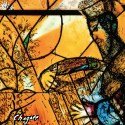
05.20.19 (Iyyar 15, 5779) "Draw near to God, and he will draw near to you" (James 4:8). There are no conditions given here -- other than your raw need to connect with God for help. "Purify your hearts, you double-minded ones" (δίψυχοι, lit. "two-souled ones"); make up your mind and be unified within your heart: "How long will you go limping between two different opinions?" (1 Kings 18:21). You are invited to come; God has made the way; your place at the table has been set and prepared. "Let us draw near with a sincere heart in full assurance of faith (ἐν πληροφορίᾳ πίστεως), with our hearts sprinkled clean from an evil conscience and our bodies washed with pure water. Let us hold fast the confession of our hope without wavering, for he who promised is faithful" (Heb. 10-22-23).
Truth and Freedom...
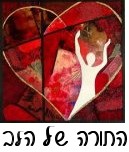
05.20.19 (Iyyar 15, 5779) "You shall know the truth and the truth shall make you free" (John 8:32). Spiritually understood the soul in its natural state is sick, in a state of error and ongoing self-deception. It is therefore unfree, in a state of inner conflict and bondage. The truth sets us free from our self-imprisonment, from the captivity we have to our illusions, so that we may be healed, transformed and made new. However, knowing the truth is more volitional than it is cognitive – it is revealed in our decisions and actions, not merely in holding to a "true opinion" or assenting to a "true creed." Knowing the truth permeates the whole person – bekhol levavkha – and accepts all the consequences of its decision and passion. There is danger here, friends. Even learning Scripture and studying theology may become untruth if it is devoid of the fear of the Lord. "How many have asked, 'What is truth?' and at bottom hoped that it would be a long time before the truth would come so close to him that in the same instant it would determine what his duty was to do at the moment?" (Kierkegaard: Works of Love).
The deeper question is whether you actually want genuine freedom, since many are content to "exist" in the cold comfort of their resentments, in the desert of the self-serving ego, and in the wastelands of angers and fears... Self-deception is enticing because it provides an excuse to be mediocre; it justifies the victim mentality and abnegates personal responsibility. It is far easier to blame others for your life than to own the truth about yourself, to walk in the truth, and to seek the blessing of truth. As Kierkegaard also wrote: "One has in one's innermost being a secret anxiety about and wariness of the truth, a fear of getting to know too much. Or do you actually believe that it is everyone's honest desire to get to know very effectively what self-denial is, to get it made so clear that every excuse, every evasion, every extenuation, is cut off from appeal?" True freedom means being awakened and empowered to choose the Eternal by denying the present moment's demand to be made absolute. It offers no peace to the natural desire for the soul to return to its soporific state, but calls and rouses the heart to wake up and confront the demands of eternity...
 |
Bones of Reality...

[ The following is related to our Torah reading for this week, parashat Behar... ]
05.20.19 (Iyyar 15, 5779) From our Torah portion for this week we read: "For you are strangers and sojourners (גרים ותושׁבים) with me" (Lev. 25:23). When we are strangers to this world, we reside with God: we are called residents of heaven. To be a stranger to this world is a great blessing, since it means we identify our home in the heart of God. By extension, reality is measured by proximity to the Eternal, and the material world - when regarded as an end in itself - is nothing but an illusion, since it cannot exist apart from the sustaining power of God (Heb. 1:3; Col. 1:16-17; Rev. 4:11). The sages note that in Hebrew there is no language of categorical ownership, since all things are conditioned by time. We say yesh li (יש לי) - "there is to me" (for this time) rather than "I have" or own. Ownership is related to the "bone" (עצם) of something, its inner structure and essence. God alone is koneh shamayim va'aretz (קנה שׁמים וארץ), the Owner of Reality (Gen. 14:19). "For from him and through him and to him are all things. To him be glory forever. Amen" (Rom. 11:36).
לְךָ יָאֶה אֲדנֵינוּ וֵאלהֵינוּ
לְקַבֵּל אֶת הַכָּבוֹד וְהַיְקָר וְהַגְּבוּרָה
כִּי אַתָּא בָּרָאתָ הַכּל
וּבִרְצוֹנְךָ הָיוּ וְנִבְרְאוֹ
le·kha · yah·eh · a·doh·ney·noo · ve·loh·hey·noo
le·ka·beil · et · ha-kah·vohd · ve·ha-ye·kahr · ve·ha-ge·voo·rah
kee · a·tah · bah·rah·tah · ha-kohl
oo·veer·tzohn·kha · hai·yoo · ve·neev·re·oo

"You are worthy, O Lord and our God,
to receive the glory and the honor and the power:
for You have created all things,
and for thy pleasure they are and were created."
(Rev. 4:11)

Hebrew Study Card
For more on this see: "Strange Settlers: Further thoughts on parashat Behar."
The "Jubilee" Year (פרשת בהר)
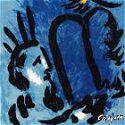
05.19.19 (Iyyar 14, 5779) Our Torah portion this week (parashat Behar) begins with the commandment that an Israelite farmer must let his land remain fallow every seventh year. This is called the "Sabbatical year" (i.e., shemittah: שמיטה), and the inhabitants of the land were permitted to glean whatever the farmland produced naturally. In addition, the people were told to count seven cycles of seven years – a total of 49 years – and to mark the arrival of the fiftieth year with blasts of the shofar on the Day of Atonement (Yom Kippur). This fiftieth year would be a time of "Jubilee" (i.e., yovel: יוֹבֵל) – a year of "release" for the land and all its inhabitants. All slaves would be set free, debts would be canceled, and the stewardship of the land would revert to its original titleholders.
In this connection, you might wonder how to determine whether a given year is a Sabbatical year (i.e., shemittah). The procedure is simple: Take the current Jewish year and divide by seven; if there is no remainder, it is a shemittah year; otherwise it is not. For example year 5779 is not a Sabbatical Year, whereas year 5782 is (note that the Jewish year begins on Rosh Hashanah, on Tishri 1, in the fall). The Jubilee year (yovel) of course follows the seventh of the seven year cycles (i.e., 7 x 7 + 1), though there are some questions about which iteration (1st, 2nd, ... 7th) is currently active. According to some authorities, the last Jubilee year was on Yom Kippur 5776, that is, Tues. Oct. 11th, 2016, so the next would be 50 years later (i.e., in the year 5826).
Shavuah tov, friends... Please remember me in your prayers, as I have been dealing with a serious eye infection that is causing me a lot of difficulty reading... Thank you so much.
The Servant of the LORD...
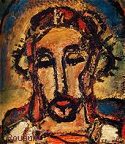
05.17.19 (Iyyar 12, 5779) Yeshua is called the "servant of the LORD" (עֶבֶד־יְהוָה) in our Scriptures: "Behold my servant, whom I uphold, my chosen, in whom my soul delights; I have put my Spirit upon him; he will bring forth justice to the nations" (Isa. 42:1), and therefore he exemplifies the way we are to serve God as well. First note that Yeshua was completely abandoned to God's care to uphold him: "I solemnly say to you, the Son can do nothing of his own accord... I can do nothing of my own initiative" (John 5:19, 30). He utterly emptied himself (κένωσις) to show us life in complete surrender to God: "For I have come down from heaven, not to do my own will but the will of him who sent me" (John 6:38, Phil. 2:6-9). Yeshua became entirely self-effacing, yielding his life to God's will, surrendering his heart in service to God whom he called his "Father in heaven" (אָבִי שֶׁבַּשָּׁמַיִם). His attitude was marked by compassion for the lost condition of others, and his mission expressed complete assurance of his victory given for them at the cross. Yeshua humbled himself and opened his ears to heed the Torah of the Spirit (Isa. 50:4); he submitted himself to suffering to learn to listen (i.e., ὑπακούω, Heb. 5:8); he always sought to glorify God and refused to be distracted. Our beloved Savior and Messiah was to be called, godeir peretz me'shovav: "The Repairer of the breach," and neitvot la'shavet: "the Restorer of paths to dwell in" (Isa. 58:12). Blessed is the name of our LORD Yeshua, the Mighty One, the Ascended LORD, the Glorious Savior, the Invincible King and LORD of Glory, the only true Healer of our lives. "He is the blessed and only Sovereign, the King of kings and Lord of lords (מֶלֶךְ הַמְּלָכִים וַאֲדנֵי הָאֲדנִים); who alone has insuperable life, who dwells in unapproachable light, and whom no one has ever seen or can see. To him be honor and eternal dominion. Amen" (1 Tim. 6:15-16).
 |
The Father of Lights...

05.17.19 (Iyyar 12, 5779) It is written in our Scriptures: "God is light and in him is no darkness at all" (1 John 1:5). Our Savior is "the Light of the world," the overarching Reality (יֵשׁוּת) that gives light to every soul who is born (John 1:9). As the Source of all light, his power is irrepressible, invincible, and overcomes every shade of darkness. Yeshua is the Logos (ΛΟΓΟΣ), the underlying "logic" of all of creation. Unlike the transient radiance of the heavenly bodies, the Divine Light remains constant and supreme over all of creation, without any diminution or variation: God is the "Father of Lights" (James 1:17). And just as we know that the sun still shines even on the most overcast of days, so we understand that the Divine Presence is always there -- always giving, always shining, always loving us... We can trust in the power of our God to help us, since His radiance and truth pervade the darkness to enlighten our way (Psalm 112:4). As Yeshua said of his mission, "I have come into the world as light, so that whoever believes in me may not remain in darkness" (John 12:46). O precious LORD our God, let your light shine upon us...
אֱלהִים יְחָנֵּנוּ וִיבָרְכֵנוּ
יָאֵר פָּנָיו אִתָּנוּ סֶלָה
e·loh·heem · vee·khon·nei·noo · vee·vahr·khei·noo
ya·eir · pah·nahv · eet·tah·noo · se·lah

"May God be gracious to us and bless us
and make his face to shine upon us, selah."
(Psalm 67:1)

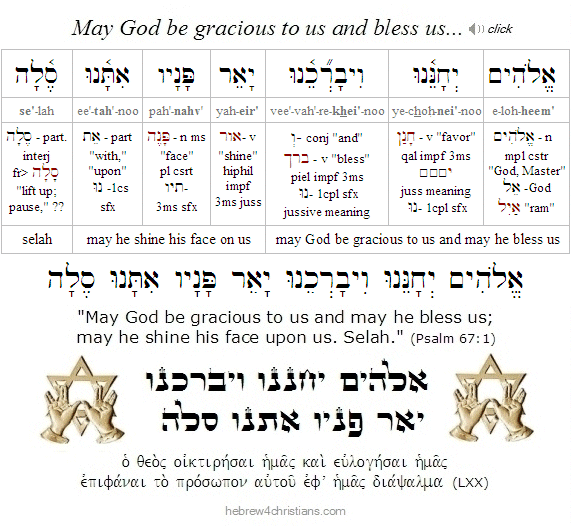
Allow the light of God's love to shine in you brightly. As Yeshua said, "Whoever has my commandments and keeps them, such is the one who loves me. And the one who loves me will be loved by my Father, and I will love him and will manifest myself to him" (John 14:21). Note that the Greek word for "manifest" means to "shine inside" (i.e., ἐμφανίζω, from ἐν, "in" and φαίνω, "shine"), indicating that the revelation would be inward light of the Divine Presence. Indeed, the Hebrew word for "praise" (i.e., tehillah: תְּהִלָּה) comes from a verb that means "to shine" (i.e., halal: הָלַל), from which we derive the word "halo." Similarly, the word "aura" comes from the Hebrew word "ohr" (אוֹר), meaning "light." Therefore open your heart to God's blessing and let the divine inner light shine before others so that they may see your good works and give honor to your Father who is in heaven" (Matt. 5:16).
The Purging Process...

05.17.19 (Iyyar 12, 5779) "I am the true vine, and my Father is the vinedresser. Every branch in me that does not bear fruit he takes away, and every branch that does bear fruit He purges (καθαίρει), that it may bear more fruit" (John 15:1-2). If you bear fruit you will experience the "purging process," and that means suffering affliction... This might seem to you backward: Why does the fruitful branch need to be cut back? Indeed, the promise of suffering is not meant for an evil person, but for the righteous soul who trusts in God. Purging is painful but it is also purifying, yielding new growth within our hearts. Yeshua taught, "Blessed are the pure in heart, for they shall see God" (Matt. 5:8). The Greek word translated "pure" is katharos (καθαρός), sometimes used describe the cleansing of a wound (catharsis), or to describe the unalloyed quality of a substance revealed through refining fire. We "rejoice" in testing because that is the way of real growth, sustained hope, and the revelation of God's deep love (Rom. 5:3-4). In our afflictions we are given heavenly consolation that helps us to persevere (2 Cor. 1:3-5). We are being weaned from this present age to be made ready for heavenly glory, for things unimaginably wonderful, soon to be revealed to you. Chazak – stay strong in the Lord, friends.
טוֹב־לִי כִי־עֻנֵּיתִי לְמַעַן אֶלְמַד חֻקֶּיך
tohv lee khee · oo·nay·tee le·mah·an el·mad khoo·key·kha

"It is good for me that I was afflicted,
that I might learn your decrees." (Psalm 119:71)

Prayer for this hour...

05.16.19 (Iyyar 11, 5779) Many of us are hurting, Lord, and we sometimes feel alone in our struggle... This world seems so senseless, so brutal, and so evil at times; we feel powerless, overwhelmed, and even sick inside... We look to You, O God, and for your mercy and your power. Help us to accept what we cannot change and to completely trust in Your great healing to come, despite the depravity of the world around us. Remind us that though we cannot change the world, we are given grace to sustain our trust in You, our glorious and merciful Healer. And may we never be ashamed; may we never grow bitter; may our sorrows lead us from strength to strength. And may this time of testing lead us to greater wisdom, to deeper compassion, and finally back to You. Amen.
Personal Request: Please remember Hebrew for Christians in your prayers, friends... The last few months have been especially difficult for a variety of reasons, especially regarding my health. Our Lord is faithful to help us through the trials, though we appreciate your prayers asking God for the strength we need to continue. Thank you so much, chaverim...
 |
Power to the Faint...

05.16.19 (Iyyar 11, 5779) "Have you not known? Have you not heard? The Eternal One, the LORD, is the Creator of the ends of the earth (בּוֹרֵא קְצוֹת הָאָרֶץ). He does not faint nor grow weary; his understanding is unsearchable. He gives power to the faint, and to him who has no might he increases strength" (Isa. 40:28-29). Human reason has no objection that God can impart strength, but it objects that strength is found in those who are broken and weary, that is, to the "poor in spirit" who mourn over their lives... And yet it is so: God gives strength to the weary, to the faint, to those who are at the end of themselves: "My power is made perfect (τελειοῦται) in weakness" (2 Cor. 12:9). Man's way is to seek charisma, to esteem those who have natural beauty, charm, or special talents, whereas God's way is first to break us, to make us weaker and weaker, so that he can then fill us with the miraculous divine nature (2 Cor. 4:7). Like all sacrifices that were brought to the altar, we must pass through death to life by means of our union with the Messiah at the cross... It is only after the cross that it may be said, "It is no longer 'I' who lives; now it is Messiah who lives His life in me." There is indeed strength, power, and victory – but such comes after we reckon carnal energy as useless. Indeed, the word "Hebrew" (עִבְרִי) means one who has "crossed over" (עָבַר) to the other side, as our father Abraham did (Gen. 14:13). It is on the other side of the cross that we experience the very power that created the universe "out of nothing" (i.e., yesh me'ayin: יֵשׁ מֵאַיִן) and that raised Yeshua the Messiah from the dead. "Not by might, nor by power, but by My Spirit, says Adonai Tzeva'ot."
נתֵן לַיָּעֵף כּחַ
וּלְאֵין אוֹנִים עָצְמָה יַרְבֶּה
noh·tein · la·yah·eif · koh·akh
oo·le·ein · oh·neem · ohtz·mah · yar·beh

"He gives power to the faint,
and to those without might he increases strength"
(Isa. 40:29)

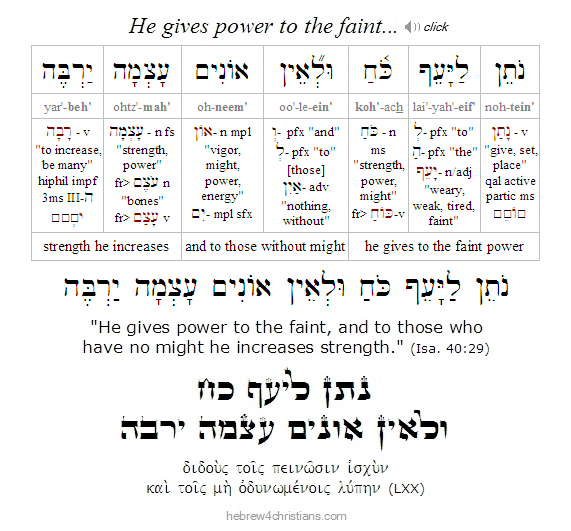
Download Study Card
Note that the word translated "strength" in this verse (i.e., ohtzmah: עָצְמָה) comes from the same root for word "bones" (עֲצָמוֹת). This alludes to the vision of the "dry bones" being clothed with life at the time of resurrection. "Thus says the Lord God to these bones: 'Behold, I will cause breath to enter you, and you shall live'" (Ezek. 37:5). If God has the power to give life to dessicated bones, surely his resurrection power can "quicken us" through the life of our beloved Savior Yeshua who said, "You will receive power (i.e., koach: כּחַ) when the Holy Spirit has come upon you, and you will be my witnesses" (Acts 1:7). Indeed you can do "all things" through Messiah who strengthens you (Phil. 4:13).
Irrepressible Truth...

05.16.19 (Iyyar 11, 5779) Those who deny that objective truth exists (or those who deny that something may be known about reality) are themselves making a truth claim, namely the claim that there is no such thing as objective truth (or that real knowledge of the world is not possible). This self-inflicted incoherence is a sign of irrationalism, of course, the abandonment of reason, which perhaps is the ulterior motive for such manner of thinking, after all. The person who denies truth does so to escape the demands of truth – to flee from personal responsibility before moral and spiritual Reality. It is a form of "wish-fulfillment" to say that people are not responsible for what they believe and how they live their lives. Hence our culture's obsessive "busyness," its craving for ongoing diversion, entertainment, fantasy, escapism, and so on. Our generation finds evil in "boredom" and finds nothing of lasting interest because it has forsaken the big questions of life and the pursuit of truth. Popular culture encourages apathy, indifference, and seeks to enslave people to thrills (and fears) of the present moment... The ancient pagan world at least esteemed honor and believed in the pursuit of virtue and truth, but today's post-Christian world is nihilistic, anarchist, and therefore marks a return to barbarism.
What you say about the present state of mankind is true: indeed it is even worse than you say. For they neglect not only the Law of Christ, but even the Law of Nature as known by the Pagans. For now they do not blush at adultery, treachery perjury, theft and other crimes, which I will not say Christian doctors, but the Pagans and Barbarians have themselves denounced. They err who say: "The world is turning pagan again." Would that it were! The truth is, we are falling into a much worse state. Post-Christian man is not the same as pre-Christian man. He is as far removed as a virgin from a widow ... there is a great difference between a spouse-to-come and a spouse sent away. (C.S. Lewis: Latin Letter 23, 1953)
The unintelligible claim that truth does not exist is not unlike the the incoherent claim that there is no God, no Supreme Being, and no Primordial Intelligent Cause for all that exists. For an atheist to seriously claim there is no being in any possible world that fits the description of "God," he or she would have to be omniscient, omnipotent, and indeed exercise the very attributes of the Being which is denied to anywhere exist...
Stealing the Mind (גְּנֵבַת דַעַת)
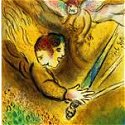
05.15.19 (Iyyar 10, 5779) It is written in our Torah: "You shall not put a stumbling block before the blind (לִפְנֵי עִוֵּר לא תִתֵּן מִכְשׁל); you shall fear God; I am the LORD" (Lev. 19:14). Just as no one can deny the validity of logic by means of argument, so no one can intelligibly deny that truth is necessary... Indeed, every person intuitively believes that truth exists, since otherwise he or she would not ask any questions or make any statements. In other words, we instinctively presuppose the value and reality of truth whenever we communicate, and we understand that there is an implied social contract to be honest and not to deceive others. Deceitful language puts a "stumbling block before the blind" when it is used to withhold important information from others. Politicians who make mutually exclusive promises to different groups of people are dishonest and cloak their true intentions. The same may be said about people who sell products or services using misleading claims. Those who willfully misdirect others violate the 9th commandment not to bear false witness (Exod. 20:16; 23:1). Such deception is called genevat da'at (גְּנֵבַת דַעַת), or "stealing of the mind," since it defrauds the other person's trust. Misleading people is a violation, then, of both the commandment not to steal and the commandment not to bear false witness. The Torah warns us never to exploit other people's naivete or to take advantage of their good will and trust. Those who use false words and deceitful language to blind the eyes of the gullible will assuredly face judgment, as it is written: "No creature is hidden from God, but everything is naked and exposed to the eyes of him to whom we must render an account" (Heb. 4:13). Lying to others is desecration, profanity, and ultimately a form of violence. Those who cause others to stumble will tragically discover that truth will be a stumbling block to them. May God help us to fear Him and to be yashar – upright in our communication with others. May each of us proclaim: "I have chosen the way of trust; I set your truth before me" (Psalm 119:30).
דֶּרֶךְ־אֱמוּנָה בָחָרְתִּי
מִשְׁפָּטֶיךָ שִׁוִּיתִי
de·rekh · e·moo·nah · vah·khahr·tee
meesh·pah·te·kha · sheev·vee·tee

"I have chosen the way of trust;
I set your truth before me." (Psalm 119:30)

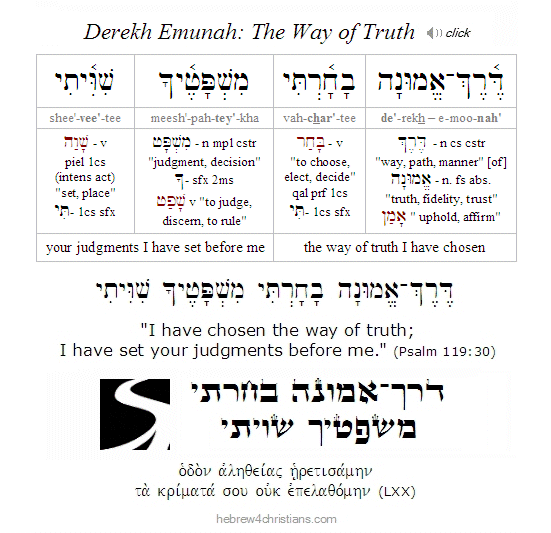
True and False Worship...
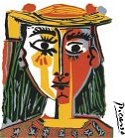
05.15.19 (Iyyar 10, 5779) Asks the Savior: "Why do you call me 'Lord, Lord,' and not do what I tell you?" (Luke 6:46). Regarding this question Kierkegaard comments: "True worship quite simply consists in doing God's will. But that kind of worship was never to people's liking. What occupies people in every age is to arrange another kind of worship that consists of doing their own will, but in such a way that God's name, calling upon God, is connected with it, whereby people think themselves protected against being ungodly – alas, although precisely this is the most definite kind of ungodliness" (The Moment: 1854). It is easy to go wrong here. The will of God is forever to trust in his Son, and indeed, this is the "work of God" (John 6:28-29). Yet this means suffering for God, needing him, yearning for his daily blessing, being abandoned to his care for your life... When out of the depth of our need – without pretense and in despair over ourselves – we cry out to the LORD, he will surely help us. As it is written: "If we ask according to his will, he hears us" (1 John 5:14), and therefore it is the heart's need for Him that is the will of God...
"Not everyone who says to me, 'Lord, Lord,' will enter the kingdom of heaven, but the one who does the will of my Father who is in heaven. On that day many will say to me, 'Lord, Lord, did we not prophesy in your name, and cast out demons in your name, and do many mighty works in your name?' And then will I declare to them, 'I never knew you; depart from me, you workers of lawlessness'" (Matt. 7:21-23). Despite the profession and practice of their faith, these people were strangers to God... They had a false sense of assurance, believing that they were "serving God" while they really were not... Therefore the essential question here is whether Yeshua truly knows you and the need of your heart. You may know a lot about God, religion, spirituality, and yet you may remain unknown by him... Where do you find life? What are you loving? Where are you going?
"On that day many will say to me, 'Lord, Lord, did we not ... do many mighty works in your name?' And then will I declare to them, 'I never knew you" (Matt. 7:22-23). From this we understand that good works - even those done in the name of Messiah - are insufficient for life, and that something more is needed... That "something more" is the reality of relationship with him. However, even Yeshua's sacrifice on the cross can't bring you into relationship with him apart from personally receiving it for your healing... By faith you encounter Yeshua clothed in your flesh, your sin, and suffering death for you. "As long as Christ remains outside of us we are separated from him."
 |
Substance of Hope...

05.15.19 (Iyyar 10, 5779) There are moments – dark, gnawing, raw – when you may lose sight of hope, when you might even fear that you have lost your faith – not in God or his promises – but rather in yourself, in your own strength to continue, to stay focused, to keep pressing on "hope against hope..." The remedy here is always the same: to remember that within you – that is, in your flesh - "there is no good thing" and that the miracle of salvation is made secure by God's passion for you, not your own power or desire. "Not by might, nor by power, but by my Spirit, saith the LORD of Hosts." We don't trust in ourselves nor in the strength of our inner resolve, but solely in the power of God to make the way. We must turn away from ourselves to regain the message of God's unfailing love; only when we lose sight of ourselves do we find ourselves. God redeems you from your lost estate and touches you in your uncleanness; He clothes himself in your pain so that you may be clothed in his love. That never changes, despite dark moments, and to that we must always return...
Where it says, "I can do all things through Messiah who strengthens me" (Phil 4:13), that includes being healed of the inner pain of rejection, abandonment, and even abuse suffered from childhood. It means being set free from disillusionment, despair, and the oppression of relentless fear. "I can do all things through Messiah" means no longer accepting messages of self-hatred, no longer heeding the malicious whispers that say: "I am of no value," "I am unlovable," "my life is hopeless." No, "I can do all things through Messiah" means learning to be accepted, honored, and esteemed by God; it means opening your heart to God's love and blessing for your life; it means allowing your heart to be made right, to rest and enjoy inner peace... After all, Yeshua's great prayer was that we would know the truth of God's love for us (John 17), and this is the central need our lives...
 |
Perfectionism and Holiness...
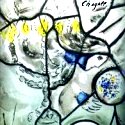
[ The following is related to our Torah reading for this week, Parashat Emor.... ]
05.14.19 (Iyyar 9, 5779) Our Torah portion this week begins by explaining special requirements for Israel's priests, and then goes on to list the yearly cycle of Sabbaths and the seasonal festivals. First of all the priests (kohanim) were required to be "perfect," without any physical defect or uncleanness that might render them unfit for service. Everything about the priests – their clothing, hair style, skin condition, and especially their adherence to the meticulous steps required to offer the daily sacrifice (לֶחֶם אֱלהָיו) - was to be "defect free," and any deviation might incur the penalty of death itself (Lev. 10:2; Num. 4:15, 2 Sam. 6:6-7). On the other hand, what sometimes disqualified a priest were things simply beyond his control, for instance, a variety of physical disabilities such as blindness, having a limp or disfigured limb, and so on (see Lev. 21:16-21).
Thinking about these requirements raises some provocative questions concerning the meaning of "perfection" in our lives, and particularly how we, as a deeply flawed people, can possibly be "perfect." The question is radical and affects how we are to understand practical holiness or the idea of "sanctification": Are we to seek to be perfect people, and if so, how do we understand what this means? Is our spirituality bound up with perfectionism, with flawless performance, and with always being and doing what is right?
In the Sermon on the Mount Yeshua warned that our righteousness should exceed that of the religious leaders of his day (Matt. 5:20), and went on to say: "be perfect, as your heavenly Father is perfect" (Matt. 5:48). Here we note that the Greek word translated "perfect" (τέλειος) may mean "mature" or "fully developed" more than morally flawless, though regarding moral and spiritual practice this distinction is not clear cut, especially if by "mature" we mean godly in character, as the context of Yeshua's statement clearly implies (see Matt. 5:1-48). The Hebrew word translated as "perfect" (תָּמִים) can also mean "complete," but it can connote being "wholehearted," "sound," or even healed (שָׁלֵם). So the question arises, does the word "perfect" mean "flawless" or "healed" -- or perhaps both?
Of course we affirm that God alone is truly perfect (Deut. 32:4; Psalm 18:30), completely good (Matt. 19:17), flawlessly righteous (Psalm 145:17), entirely holy (Isa. 6:3; Rev. 15:4), and peerlessly unique (Exod. 15:11; Jer. 10:6-7), but how can we relate to God's overmastering perfection in the midst of our daily flaws and chronic imperfections? How dare we approach "to offer the bread of God" (Lev. 21:17)?
Followers of the LORD are called to be a nation of priests, a "select people," set apart to serve God in holiness (Exod. 19:5-6; 1 Pet. 2:9; Lev. 11:45), but it is clear we are blemished, imperfect, blind, halt, needy, and unclean... This is common to the human condition: all of us, Jew or non-Jew alike, are broken, flawed, and in the midst of the inevitable flow of life that leads to death and decay (Rom. 3:23). We are sick with sin and unable to heal ourselves, and therefore we need a radical transformation - "deliverance from ourselves" – that must come through divine intervention and the miracle of spiritual rebirth (John 3:3,7).
In this world we walk suspended between two worlds: we are finite yet long for the undying, the infinite; we are in flux yet anchored in hope; we are a "new creation" yet still saddled with the old nature; we are made holy yet we live in the midst of the profane; we are purified yet still need cleansing; we are healed yet are still wounded; we are redeemed of God yet still need to turn to God in teshuvah; we die daily yet have eternal life. Our hearts are to be a divine sanctuary, yet we are powerless to make God appear in our midst...
Perfection haunts us; we often confuse the ideal and the real. Our romantic visions fail us; all of us are strangers, wanderers, in lonely exile. And the question then becomes – how do we embrace the "already-not-yet," the process, the fleeting days with their poignant moments – within the context of real hope, a vision that heals and brings us real comfort? How do we make peace with our imperfections, our present darkness, and our hunger for deliverance? How do we envision healing in the midst of our brokenness?
For more see: "Perfection and Holiness: Further thoughts on parashat Emor."
 |
The Yoke of Messiah...
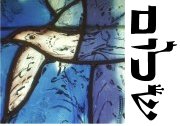
05.14.19 (Iyyar 9, 5779) What is the goal of your relationship with God? Is it the hope of paradise where pleasures abound and all your desires are fulfilled? Yeshua taught that the purpose of a relationship with God was to discover divine life by knowing the truth of God revealed in him. He said to his disciples: "This is eternal life (חַיֵּי עוֹלָם) that they may know you the only true God, and Yeshua the Messiah whom you have sent" (John 17:3). Knowing God in this way means understanding his heart and character, and learning to become "mature" (i.e., τέλειον, "complete, whole, finished") through your union with the Messiah (Col. 1:28; Eph. 4:13). Practically speaking we "put on" a new spiritual nature (our "new self") which is created after the likeness of God (כִּדְמוּת אֱלהִים) in true righteousness and holiness (Eph. 4:24). We know and believe who we are as God's beloved children (Rom. 8:29). This is a matter of faith, indeed, but it is also a matter of the will. We must line up our attitudes and emotions in light of the truth of reality... Immature emotions are out of alignment with what is real, evidencing disordered affections based on illusions. "Putting away childish things" (1 Cor. 13:11) means surrendering or letting die (καταργέω) self-centered emotions and desires, letting go of self-pity or bitterness, and refusing to blame others. Spiritual maturity implies humility, denying yourself, a word that means to stop thinking about yourself (from α-, "not," +ῥέω, "to speak"), and living the truth by sharing God's redemptive vision and mission for others. We must be careful, however, not to drift away, since it is possible to "forget" the truth that once guided our way; and it is possible to become dull of hearing, shortsighted, and to stop growing in relationship with God (Heb. 2:1). Spiritual truth is not merely cognitive but existential: we must earnestly pursue (διώκω) our heavenly calling (Phil 3:14) and this requires the daily and ongoing decision to live before the LORD our God (Psalm 16:8). The invitation to "choose this day whom you will serve" (Josh. 24:15) implies that is your choice - and your responsibility - to draw near to God (James 4:8). We can do this by studying and memorizing Scripture, meditating, praying, and sharing our hope with others. Above all we must ask God for the gift of the Holy Spirit to "bear us up into maturity" (i.e., ἐπὶ τὴν τελειότητα φερώμεθα, Heb 6:1) so that we may learn from our Master who calls us to be joined to his yoke and to learn from him (Matt. 11:29).
A "yoke" is a wooden crosspiece fastened over the necks of two animals that is attached to a plow they pull together... Yokes are used to train one animal in the work of plowing or pulling a cart. When Yeshua says "take my yoke (i.e., עוֹל / ζυγός) upon you, and learn from me, for I am gentle and lowly in heart, and you will find rest for your souls" (Matt. 11:29), the metaphor implies that you will be joined together with him to cultivate the kingdom of God. Yeshua's yoke, however, is not like the yoke of "religion" that leads to slavery, but the yoke of life that leads to love, joy, and peace....
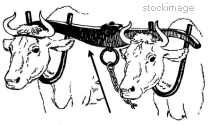 |
 |
Mercy's Like-for-Like...

[ The following is related to our Torah reading for this week, Parashat Emor.... ]
05.13.19 (Iyyar 8, 5779) In our Torah portion this week we read, "whatever injury he has given a person shall be given to him" (Lev. 24:20). Some of the sages comment that this is not so much about "eye for eye, tooth for tooth" retributive justice as it is about reciprocity of the will. As you see others, so you will see yourself; as you cause a defect in another, so it will be given to you. Therefore the Baal Shem Tov observed, "Other people are like mirrors: the faults we see in others our own." Indeed Yeshua taught us: "condemn not and you will not be condemned; release, and you will be released" (Luke 6:37). As we forgive others, so we find our own forgiveness. "Love covers all transgressions" (Prov. 10:12).
Loving the Stranger (אהבת הגר)...

[ The following is related to our Torah reading for this week, Parashat Emor.... ]
05.13.19 (Iyyar 8, 5779) Did you know that one of the most frequently occurring commandments of Torah is to love the stranger? The commandment is repeated in various forms over 30 times in the Jewish Scriptures, for instance "You shall love your neighbor as yourself: I am the LORD" (Lev. 19:18); "You shall treat the stranger who sojourns with you as the native among you, and you shall love him as yourself, for you were strangers in the land of Egypt: I am the LORD your God" (Lev. 19:34); "Love the stranger, therefore, for you were sojourners in the land of Egypt" (Deut. 10:19); "You shall not wrong a sojourner or oppress him, for you were sojourners in the land of Egypt" (Exod. 22:21); "When a stranger sojourns with you in your land, you shall not do him wrong" (Lev. 19:33); "Do not oppress the stranger" (Zech. 7:10); "Cursed be anyone who perverts the justice due the stranger" (Deut. 24:19); "The stranger shall be as the native born children of Israel among you" (Ezek. 47:22), "There shall be one law for the native and for the stranger who sojourns among you"(Exod. 12:49; Num. 15:16), and so on. Clearly the LORD does not want people to feel ostracized, excluded, or otherwise left out of His providential and loving plans... Indeed, the message of the universal love of God is at the heart of the gospel itself, harkening back to God's earliest promises to redeem humanity and restore paradise lost. "Religion," tribalism, prejudice, ethnic pride, and so on, are anathema to the Kingdom of God.
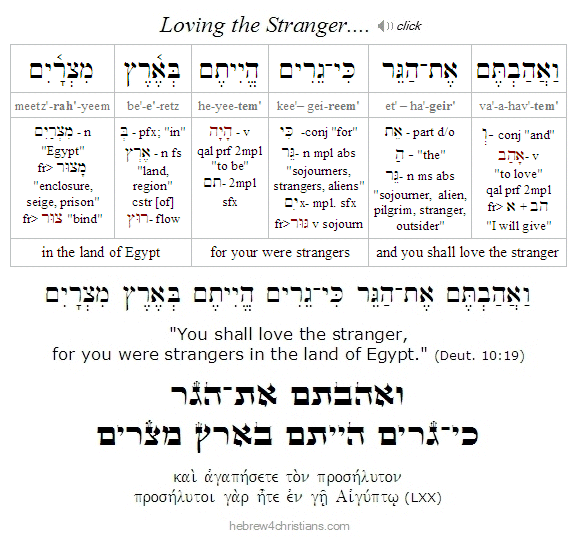 |
Jewish tradition says that King David was born on Shavuot ("Pentecost"), the holiday of shtei ha-lechem, the "two loaves" that prophetically foretold of the advent of the "one new man" (Eph. 2:14-22) and of the mysterious inclusion of the Gentiles into the covenant promises of God (Eph. 3:6). God has a great compassion for the outsider, for the lost, for the orphan and those who are without inheritance in this world. During Shavuot it is customary to read the Book of Ruth which tells the story about redeeming love and the advent of King David. Recall that King David was a direct descendant of Ruth, who as a Moabitess was an outsider and "stranger" to the promises of God (Ruth 4:17). Despite being part of an despised and rejected group of people (see Deut. 23:3), Ruth overcame the law's demand by believing in the love and acceptance of a redeemer of Israel (Ruth 3:9). Ruth's great grandson was named David (דָוִד), meaning "beloved," which has the same numerical value as the word "hand" (יָד). It is no wonder that the LORD chose David to represent God's extended hand of love for the stranger, for the convert, for the outsider, the leper, and the lost, since his descendant Yeshua the Messiah came to love and redeem the entire world by means of His outstretched hand. ברוך הוא יהוה ישוע
"I was a stranger and you welcomed me" (Matt. 25:35). We are commanded (i.e., blessed) to practice ahavat ha'geir (אהבת הגר), the "love of the stranger." This means showing compassion and empathy to an "outsider" who may question their worth and place in your midst... On a somewhat deeper level, the duty to "love the stranger" applies not only to someone whom we regard as an "outsider," but more radically to the "stranger within ourselves," that is, to those aspects of ourselves we censor, deny, or reject. Like the prodigal son, we have to "come to ourselves" to return home (Luke 15:17), yet we can't know that we are unconditionally loved until we venture complete disclosure and seek acceptance. That is the great risk of trusting in God's love for your soul. Those parts of ourselves that we "hide" need to be brought to the light, healed, and reconciled. After all, if we don't find healing for our self-rejection and pain, how can we hope to love and accept others? Dear Lord, deliver us from the torment of self-hatred, in the Name and passion of your love, amen..
 |
Giving and Receiving...

05.13.19 (Iyyar 9, 5779) Our Torah for this week (i.e., parashat Emor) contains more mitzvot (i.e., commandments, blessings) regarding holiness than any other Torah portion (the sages cite no less than 63 distinct commandments). In addition, the portion provides a list of the eight main holidays, or "appointed times" (i.e., mo'edim: מוֹעֲדִים), found in the Jewish Scriptures. These "festivals of life" are sometimes called mikra'ei kodesh (מִקְרָאֵי קדֶשׁ), "times in which holiness is proclaimed" (Lev. 23:2). Note that this is the first time that the Torah reveals a comprehensive description of the festivals of the year, which include the following:
- The Sabbath (יום השבת) - The weekly observance of Shabbat that commemorates God as the Creator of the world. According to the sages, Shabbat is the most important of the appointed times, even more important than Yom Kippur and the Ten Days of Awe. There are 54 weekly Sabbaths in a "leap year" and 50 for regular years... In addition to the Sabbath are monthly Sabbaths (שבתות חודשיות) called Rosh Chodeshim.
- Pesach (חג פסח), also called Passover. This reveals the redemption from death that comes from the sacrificial blood of the Lamb of God...
- Unleavened Bread (חג המצות) - This denotes the sanctification of the people of God, the "crossing over" into the realm of Promise. Note that the Counting of the Omer (ספירת העומר) is also first mentioned in this section of Torah (Lev. 23:9-16).
- Firstfruits (ום בכורים), also called Reishit Katzir. This marked the first wave offering (תנופת העומר) of the new harvest which symbolized the time of the resurrection of Messiah and the victory of Life over the powers of hell and death.
- Shavuot (חג השבועות), also called "Weeks" or "Pentecost." This marks the climax of the Passover Season, the giving of Torah at Sinai and the giving of the Ruach (Spirit) at Zion. It is the advent of the New Covenant for all nations, tribes, and tongues...
- Yom Teru'ah (יום תרועה), also called "Rosh Hashanah" (note that this is the first time this is revealed in Torah). This marks the start of the final "week of years" of the End of Days and time of worldwide judgment... the "Great Tribulation."
- Yom Kippur (יום כיפור) also called the Day of Atonement. This denotes the national cleansing and restoration of the Jewish people at the end of the Tribulation Period.
- Sukkot (חג סוכות) also called "Tabernacles" (note that this is the first time the commandments to dwell in a Sukkah and to wave the arba minim (four species) are mentioned in the Torah). This denotes the Millennial Kingdom and Sukkah of God established as Zion. (The two winter holidays of Chanukah and Purim are alluded to in this portion as well: see the parashah summary for more information.)
Notice that there is a restatement of the commandment to leave food for the poor and the stranger (pe'ah, leket, shikhah) that appears right in the midst of the list of the Biblical holidays (see Lev. 23:22), which the sages said was intended to remind us to help those in need, especially during these times. Hence the giving of tzedakah is a regular part of the Jewish holidays (e.g., giving ma'ot chittim [מַעוֹת חִטִּים] "money for wheat" during Passover, matanot la'evyonim [מַתָּנוֹת לָאֶבְיוֹנִים] for Purim, and so on). The sages ask, "Why did the Torah place the mitzvah of helping the poor while speaking about the holidays and their particular sacrifices? To teach us the greatness of charity: 'God credits whoever gives charity to the poor as if they built the Holy Temple and presented offerings therein to God.' Indeed, Yeshua taught us that giving a gift to the poor is giving a gift to God Himself (Matt. 25:40).
מַלְוֵה יְהוָה חוֹנֵן דָּל
וּגְמֻלוֹ יְשַׁלֶּם־לוֹ
mal·veih · Adonai · kho·nein · dahl
oo·ge·moo·loh · ye·sha·lem-loh

"Whoever is generous to the poor lends to the LORD,
and He will repay him for his kindness."
(Prov. 19:17)

Hebrew Study Card
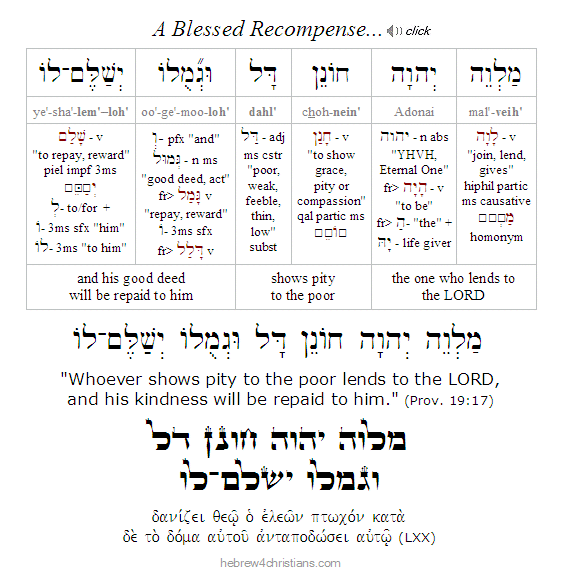
Since there are at least 50 weekly Sabbaths in a Jewish year in addition to the seven prescribed holidays (not to mention Rosh Chodesh and the other holidays such as Purim, Chanukah, Israel Independence Day, etc.), it is no wonder that the Scriptures declare: "A person with a cheerful heart has a continual celebration" (Prov. 15:15). The moedim are times to cheerfully give thanks to the LORD for all He has done.... Amen.
Wounded Healers...
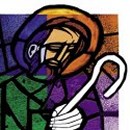
05.13.19 (Iyyar 9, 5779) Our Torah portion this week (i.e., parashat Emor) begins by explaining special requirements for Israel's priests, and then goes on to list the yearly cycle of Sabbaths and the seasonal festivals. First of all the priests (kohanim) were required to be "perfect," without any physical defect or uncleanness that might render them unfit for service. Everything about the priests – their clothing, hair style, skin condition, and especially their adherence to the meticulous steps required to offer the daily sacrifice (לֶחֶם אֱלהָיו) - was to be "defect free," and any deviation might incur the penalty of death itself (Lev. 10:2; Num. 4:15, 2 Sam. 6:6-7). On the other hand, what sometimes disqualified a priest were things simply beyond his control, for instance, a variety of physical disabilities such as blindness, having a limp or disfigured limb, and so on (see Lev. 21:16-21).
Thinking about these requirements raises some provocative questions concerning the meaning of "perfection" in our lives, and particularly how we, as a deeply flawed people, can possibly be "perfect." The question is radical and affects how we are to understand practical holiness or the idea of "sanctification": Are we to seek to be perfect people, and if so, how do we understand what this means? Is our spirituality bound up with perfectionism, with flawless performance, and with always being and doing what is right?
In the Sermon on the Mount Yeshua warned that our righteousness should exceed that of the religious leaders of his day (Matt. 5:20), and went on to say: "be perfect, as your heavenly Father is perfect" (Matt. 5:48). Here we note that the Greek word translated "perfect" (τέλειος) may mean "mature" or "fully developed" more than morally flawless, though regarding moral and spiritual practice this distinction is not clear cut, especially if by "mature" we mean godly in character, as the context of Yeshua's statement clearly implies (see Matt. 5:1-48). The Hebrew word translated as "perfect" (תָּמִים) can also mean "complete," but it can connote being "wholehearted," "sound," or even healed (שָׁלֵם). So the question arises, does the word "perfect" mean "flawless" or "healed" -- or perhaps both?
Of course we affirm that God alone is truly perfect (Deut. 32:4; Psalm 18:30), completely good (Matt. 19:17), flawlessly righteous (Psalm 145:17), entirely holy (Isa. 6:3; Rev. 15:4), and peerlessly unique (Exod. 15:11; Jer. 10:6-7), but how can we relate to God's overmastering perfection in the midst of our daily flaws and chronic imperfections? How dare we approach "to offer the bread of God" (Lev. 21:17)?
Followers of the LORD are called to be a nation of priests, a "select people," set apart to serve God in holiness (Exod. 19:5-6; 1 Pet. 2:9; Lev. 11:45), but it is clear we are blemished, imperfect, blind, halt, needy, and unclean... This is common to the human condition: all of us, Jew or non-Jew alike, are broken, flawed, and in the midst of the inevitable flow of life that leads to death and decay (Rom. 3:23). We are sick with sin and unable to heal ourselves, and therefore we need a radical transformation - "deliverance from ourselves" – that must come through divine intervention and the miracle of spiritual rebirth (John 3:3,7).
Nevertheless in this world the paradox still remains: we are finite yet long for the undying, the infinite; we are in flux yet anchored in hope; we are a "new creation" yet still saddled with the old nature; we are made holy yet we live in the midst of the profane; we are purified yet still need cleansing; we are healed yet are still wounded; we are redeemed of God yet still need to turn to God in teshuvah; we die daily yet have eternal life. Our hearts are to be a divine sanctuary, yet we are powerless to make God appear in our midst...
Perfection haunts us; we often confuse the ideal and the real. Our romantic visions fail us; all of us are strangers, wanderers, in lonely exile. And the question then becomes – how do we embrace the "already-not-yet," the process, the fleeting days with their poignant moments – within the context of real hope, a vision that heals and brings us real comfort? How do we make peace with our imperfections, our present darkness, and our hunger for deliverance? How do we envision healing in the midst of our brokenness?
Ironically those defects that disqualify us as priests can be transformed (by God's grace) into compassion for others, and this can enable us to reach out to God in the midst of our flawed existence... After all, the deepest role of the priest is to draw others near to God, but this requires empathy and awareness of the needs of others. Therefore God clothed himself with our frailty, our infirmities, and the brokenness of our sin in order to redeem us in Yeshua. As it is written, we have a high priest who is able to sympathize (συμπαθέω) with our weaknesses (Heb. 4:15). The priest of the New Covenant is a mediator through through poverty of spirit and mourning (Matt. 5:3-8). Just as Joshua the high priest was graciously given robes of righteousness in exchange for his filthy garments (Zech 3), so we are given an imputed righteousness that comes through trusting in "the One who justifies the ungodly" (Rom. 4:5). "For our sake God made Him (i.e., Yeshua) to be sin who knew no sin, so that in him we might become the righteousness of God" (2 Cor. 5:21). This is a righteousness that is "apart from the law, though the law and prophets testified of it; namely, the righteousness of God given through the faithfulness of Yeshua the Messiah" (Rom. 3:21-22). Our present groaning for the complete deliverance is a gift given by the Spirit of God crying out within our hearts (Rom. 8:22-23).
C.S. Lewis once remarked, "God doesn't love you because you are good, but He will make you good because He loves you." This goodness is the miraculous inner working of an imparted godliness, the divine gift of a new heart and spirit (Ezek. 36:26). Awaken to your eternal perfection in the world to come: "You shall be perfect even as your heavenly Father is perfect" can be read as a prophecy. Do not give up, friends; do not succumb to despair. We must learn to endure ourselves and believe in the healing to come. "Do not lose heart. Though our outer self is wasting away, our inner self is being renewed day by day. For this light momentary affliction is preparing for us an eternal weight of glory beyond all comparison, as we look not to the things that are seen but to the things that are unseen. For the things that are seen are transient, but the things that are unseen are eternal" (2 Cor. 4:16-18). And may God help us walk in perfect faith in His unfailing love (Phil. 3:14).
 |
Theodor Herzl Day - May 15th

05.12.19 (Iyyar 8, 5779) This coming Wednesday, May 15th is "Herzl Day" in Israel (i.e., Yom Herztl: יום הרצל), a national holiday established by the Knesset to commemorate the achievements and Zionist vision of Theodor Herzl (1860-1904), a man considered by many to be the father of the modern State of Israel. During Herzl Day a memorial service held on Mount Herzl in Jerusalem, the site of Israel's national cemetery, where Herzl's tomb is located. It should be noted that though Herzl was a remarkable man, he was greatly helped by Bible-believing Christians who foresaw the vision of Zion and the reestablishment of the State of Israel and who therefore assisted him by providing support for his political vision.
Note: For more information about Herzl Day, click here.
Parashat Emor - אמור
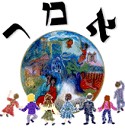
05.12.19 (Iyyar 8, 5779) Shavuah tov and Happy Mother's Day to all the wonderful moms out there! Our Torah portion for this week (parashat Emor) lists the eight main holidays revealed in the Jewish Scriptures. In the Torah, these "holidays" are called "appointed times" (i.e., mo'edim: מוֹעֲדִים), a word which comes from the Hebrew root meaning "witness" (עֵד). Other words from this root include edah (עֵדָה), a "congregation," edut (עֵדוּת), a "testimony," and so on. The related verb ya'ad (יָעַד) means "to meet," "to assemble," or even "to betroth." The significance of the holy days, then, is for the covenant people of the LORD to bear witness to God's love and faithfulness. As it is written:
כל־ארחות יהוה חסד ואמת
לנצרי בריתו ועדתיו
kohl - or·khot · Adonai · che'·sed · ve·e·met
le·no·tze·rei · ve·ree·to · ve·e·do·tahv

"All the paths of the LORD are compassion and truth
to those keeping his covenant and his testimonies."
(Psalm 25:10)

"All the paths of the LORD are love and truth
to the ones guarding His covenant and His testimonies."
(Psalm 25:10)

Hebrew Study Card
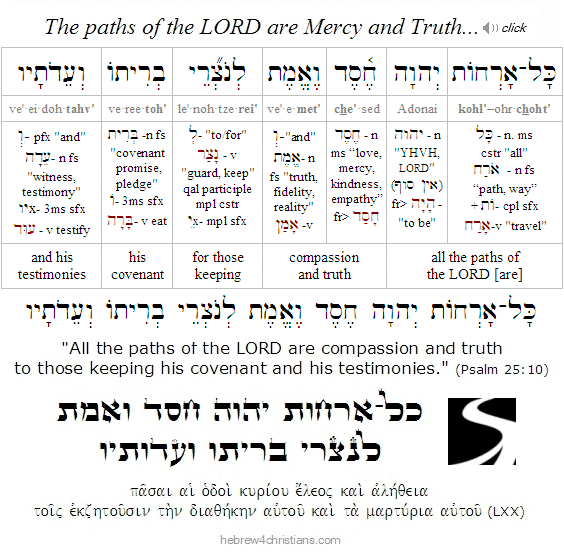
Metaphorically the paths of the Lord (orechot Adonai) are likened to ruts or grooves created by the wheels of a caravan (i.e., orechah: ארְחָה) passing repeatedly over the same ground. These paths signify the Divine Presence journeying with God's children in this world. In temporal terms, we are able to discern the path by means of the divine calendar. God's love and faithfulness attend to His covenant (brit) and to the commemorations of the yearly "appointed times" that testify of God's faithful love. Keeping God's testimonies, then, means that we will be careful to observe the holidays in order to witness to God's truth...
"Speak to the people of Israel and say to them, 'These are the appointed times of the LORD (מוֹעֲדֵי יְהוָה) that you shall proclaim as holy convocations (מִקְרָאֵי קדֶשׁ); they are My appointed times'" (Lev. 23:2). Note that these hallowed times - the very first of which is the weekly Sabbath - are "of the LORD," and that means they should be regarded as appointments given by God Himself to help draw us closer to Him, to reveal His prophetic truth, and to remind ourselves of His great plan for our lives. God did not give us the Torah in vain, friends, neither does He speak out of two sides of his his mouth... Yeshua was the Voice of the LORD speaking the words of Torah to Israel at Sinai, and therefore every "jot and tittle" (קוֹצוֹ שֶׁל יוֹד) is indeed relevant to our lives as his followers (Matt. 5:18-19).
You shall be made whole...

05.10.19 (Iyyar 6, 5779) The Scriptures counsel us to be transformed by "renewing our minds" (Rom. 12:2), though how we are to do this remains an open question. Our perspectives and attitudes are shaped by our assumptions about life, many of which are "preconscious" or hidden from our awareness. Habitual thoughts, biases, prejudices, fears, etc., all affect (and distort) the way we see and understand reality. In light of this, how can we change? How can we overcome our habitual negativity, misery, and general unhappiness? How do we develop right thinking power? How do we learn to apply our minds to perceive the good, instead of responding in unreflective and negative ways to our circumstances? How do we discipline our will so that "if there is anything worthy of praise, think about these things" (Phil. 4:8)?
There are innumerable books on the subject of logic, detecting fallacies, and using sound reasoning techniques, but there are not many that discuss the "morality" of our thinking, that is, our God-given responsibility to perceive the truth and to consistently express it in our everyday actions. Since our thinking invariably leads to practical choices, we have a primary duty to know the truth and live out its implications in our lives. The failure to do so is not only inconsistent, logically speaking, but immoral, ethically speaking (and dangerous, spiritually speaking, since bondage is ignorance of the truth). If the truth bears witness that there is a personal God who creates each soul in the world, for instance, this should affect how we value and respect others, and the failure to do so will result in cognitive dissonance and internal contradiction that yields mental suffering, misery, emotional pain, and insecurity in our lives. A "double-minded" person is "two-souled" (δίψυχος), unstable (i.e., ungrounded, restless, unbalanced) in all his ways (James 1:8).
Healing comes from receiving the light of truth, being "single-minded," with our eye focused on what is real. "If your eye is "single" (i.e., ἁπλοῦς, sincere, focused)," Yeshua said, "your whole body will be filled with light" (Matt. 6:22). Likewise the Torah commands: "You shall be made whole (i.e., tamin: תָּמִים) with the LORD your God" (Deut. 18:13). We are made "whole" or "perfect" (i.e., complete) when we resolutely turn to God for healing of our inner dividedness, as it says: "The Torah of the LORD is perfect (תָּמִים), returning the soul" (Psalm 19:8). And where it is written, "Let us hear end of the matter: Fear God and love his commandments, the text adds: ki zeh kol-ha'adam (כִּי־זֶה כָּל־הָאָדָם), "for this is the whole man," suggesting that those who return will be healed of double-mindedness (Eccl. 12:13). Ultimately we are made whole when we are united to God in Messiah, for then we are "with the LORD our God" and the Spirit writes Torah within the heart of faith (Jer. 31:33).
The heart of truth sees beyond the present to find meaning in the Eternal, yet it refocuses on the present to endow it with sacred significance... "Love hopes all things" (1 Cor. 13:7). To rightly see the present moment, in other words, we must first look to the Eternal, since that grounds our perspective and contextualizes our hope: "For this light momentary affliction is preparing for us an eternal weight of glory beyond all comparison, as we look not to the things that are seen but to the things that are unseen. For the things that are seen are transient, but the things that are unseen are eternal" (2 Cor. 4:17-18).
Regard this as a prophecy for your life: "You shall be made whole with the LORD your God." God's love heals the inner brokenness of our hearts. When we accept this, we discover that surrendering to God's will truly makes us "whole." "As many as I love, I reprove and correct: be zealous therefore, and turn. Listen! I stand at the door and knock. If anyone hears my voice and opens the door I will come into his heart and share a meal with him, and he with me" (Rev. 3:19-20). These are words of our Lord Yeshua, who speaks to those who "hear his voice." May you open the door of your heart; may you return to Him now...
 |
What We Really Need...

05.10.19 (Iyyar 6, 5779) Yeshua said: "Your heavenly Father knows what you need before you ask him" (Matt. 6:8). We sometimes pray for what we think we need but overlook what we really need. For instance, we may pray for health, material blessing, and opportunity, but what we really need is the ability to trust, the willingness to surrender our lives to God without qualification, and the grace to see the good in others and not their faults. These needs are just as real as our need for food and clothing, since apart from grace to extend empathy and love toward others, we will never be truly happy. Love "overlooks" a multitude of sins; it looks beyond the present moment to see with compassion, of kindness, of empathy... What we really need, then, is to be after God's own heart, to see other people as God sees them, and to overlook matters that offend or feed our sense of pride. This is what we truly need, and therefore we trust that the Lord our God mercifully "decodes" our apparent petitions to express what the Spirit of God groans on our behalf (Rom. 8:26).
כִּי־עָנִי וְאֶבְיוֹן אָנכִי
וְלִבִּי חָלַל בְּקִרְבִּי
kee · a·nee · ve·ev·yohn · a·noh·khee
ve·lee·bee · chah·lal · be·keer·bee

"For I am poor and needy,
and my heart is stricken within me."
(Psalm 109:22)

The word translated as "stricken" is challal (חָלַל), meaning "wounded, pierced, polluted, defiled, or brokenhearted." This is the condition of heart that is prerequisite for doing real business with heaven. "God has not been trying an experiment on my faith or love in order to find out their quality. He knew it already. It was I who didn't. In this trial He makes us occupy the dock, the witness box, and the bench all at once. He always knew that my temple was a house of cards. His only way of making me realize the fact was to knock it down.... I need Christ, not something that resembles Him." (C.S. Lewis: A Grief Observed)
Knowledge of the Holy...
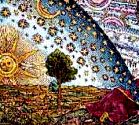
[ The following is related to our Torah reading this week, parashat Kedoshim... ]
05.10.19 (Iyyar 6, 5779) The Torah records God's first act of creation with the imperative utterance: "Let there be light" (i.e., yehi or: יְהִי אוֹר), and then goes on to say that "God separated (וַיַּבְדֵּל) the light from the darkness (Gen. 1:3-4). It is this "separation," or distinction, that is foundational to the knowledge of kedushah (קְדֻשָּׁה), or "holiness." Holiness is also expressed in the distinction between ordinary and sacred time: "God blessed the seventh day and made it holy" (יְקַדֵּשׁ) because on it God rested from all his work that he had done in creation" (Gen. 2:3). Therefore we are repeatedly told to "distinguish between the holy and the common, and between the unclean and the clean" (see Lev. 10:10). Note that the word translated "distinguish" (וּלֲהַבְדִּיל) comes from the same verb used to describe how God separated the light from the darkness. In order to do this, we need understanding (i.e., binah: בִּינָה), or the ability to distinguish between (בֵּין) realms of reality (or between reality and unreality). Therefore God calls us to come alive and to know the truth about who we really are in relation to Him: "You shall be holy to me, for I the LORD am holy and I have separated you (וָאַבְדִּל) from other people that you should be mine" (Lev. 20:26).
וִהְיִיתֶם לִי קְדשִׁים כִּי קָדוֹשׁ אֲנִי יְהוָה
וָאַבְדִּל אֶתְכֶם מִן־הָעַמִּים לִהְיוֹת לִי
vee·yee·tem · lee · ke·doh·sheem · kee · kah·dohsh · a·nee · Adonai
vah·av·deel · et·khem · meen-hah·a·meem · lee·he·yoht · lee

"You shall be holy to me, for I the LORD am holy
and I have separated you from the peoples to be mine"
(Lev. 20:26)

There is no other way to approach the Holy One apart from consciousness of His infinite glory and unsurpassable worth. "I will lift up my eyes to the hills" (Psalm 121:1). As the Holy One (i.e., ha-kadosh: הַקָּדוֹשׁ), the LORD (יהוה) is utterly unique, distinct, sacred, and set apart as the only One of its kind. He alone is worthy of true worship and adoration, since He alone is utterly peerless, without rival, and stands in relation to the world as Creator, Redeemer, and Lord. To affirm the LORD is holy is to be conscious that He is utterly sacred. A corollary of this is that the LORD wants you to know (not just believe) that your life has infinite value and eternal significance, and therefore you are truly "beloved" in his eyes.
Note: Being "holy" does not mean being sanctimonious or having a sour face about the world and its carnal pleasures. It has nothing at all to do with affected spirituality, angry pride, or the fear of becoming unclean... Indeed, some of the most holy moments are those of love, joy, peace, as well as times of struggle, sorrow, affliction, and fiery temptation. Holiness is ultimately "ontological," which means it has to do with reality... A person can be holy and yet sinful; he can be holy and yet feel lost or abandoned. On the other hand, a person can be seemingly sinless, morally upright, and yet be completely unholy.
 |
Seeking What is Above...

05.10.19 (Iyyar 6, 5779) "If then you have been raised with Messiah, seek the things that are above, where the Messiah is seated at the right hand of God (לִימִין הָאֱלהִים); focus your thoughts on the things above - not on things here on earth - for you have died, and your life has been hidden with Messiah in God" (Col. 3:1-3). Note that the verb translated "you have died" (ἀπεθάνετε) indicates that your death is a spiritual reality you must accept by faith. You don't "try to die" to the flesh, since that is the fool's errand of man's "religion." No, you trust that God has killed the power of sin and death on your behalf and imparted to you a new kind of life power (John 1:12; Eph 2:5). Because you partake of an entirely greater dimension of reality, namely, the spiritual reality hidden from the vanity of this age, your life is likewise hidden from this world (Col. 3:4). Therefore we are instructed to consciously focus our thoughts (φρονέω) on the hidden reality of God rather than on the superficial and temporal world that is passing away: "For we are looking not to the things that are seen but to the things that are unseen. For the things that are seen are transient (i.e., "just for a season," καιρός), but the things that are unseen are eternal" (2 Cor. 4:18).
Just as you must trust and accept that Yeshua was crucified for you, identifying with you, taking your place in judgment, exchanging his life for your own, so you must trust and accept that you have been crucified with him, and that your old life was taken away and replaced with a new, indestructible nature. In other words, a union is created where his "for me" is answered by my "with him." Χριστῷ συνεσταύρωμαι– "I already have been crucified in Messiah" (Gal. 2:20). Indeed the two go together: to trust in the finished work of Messiah for you is to trust in his finished work within you... When he died on the cross for you, which sins didn't he bear on your behalf? which remedy did he leave unfulfilled?
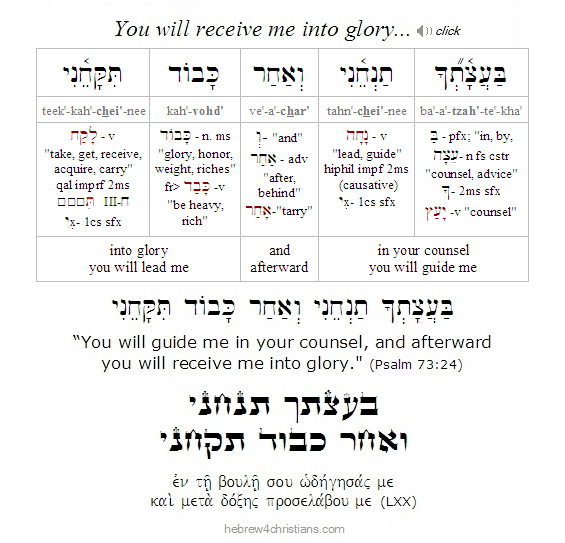 |
 |
 |
God's "Super Sign" of Israel...
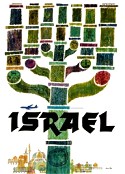
[ The following is related to Yom HaAtzma'ut (יום העצמאות) - Israel's Independence Day... ]
05.09.19 (Iyyar 4, 5779) After the Jewish people had suffered for nearly 2,000 years of exile as clearly foretold by Moses (see Lev. 26:38, 44; Deut. 28:64-64) and the other Hebrew prophets (Isa. 43:5-6; Jer. 30:11; Joel 3:2; Ezek. 36:8-10; Hos. 9:1-10, etc.), Israel was miraculously reborn as a nation in their ancient homeland on May 14, 1948 (Iyyar 5, 5708). Today Jews across the world celebrate Iyyar 5 as Israeli Independence Day, which this year will be observed a day earlier, on Wednesday May 8th at sundown.
Israel's Independence Day is called Yom Ha'atzma'ut (יוֹם הָעַצְמָאוּת), the "day of independence." In Hebrew, the word independence (atzma'ut) comes from atzmi - "my bones" (i.e., etzem: עֶצֶם), so the name itself alludes to God's glorious promise to revive the "dry bones" (עֲצָמוֹת) of Israel by bringing the Jewish people back from their long exile during the End of Days (Ezek. 37:1-6). "Son of man, can these bones live?"
But why should Christians care about ethnic Israel? After all, many Christian denominations advocate some version of "Replacement Theology" and regard the promises God made to the Jewish people as belonging exclusively to their church... The existence of the modern State of Israel therefore evokes little thanks to God from these groups, and some of their ranks even regard Israel's revived presence on the world stage as an embarrassment to their typically "liberal" theology. Hence we see the (remarkably bad) phenomena of so-called "Christian" church denominations that express anti-Israel sentiment, even asking their followers to divest investments in Israel on behalf of the "Palestinians," etc.
The title "Christ" refers to the anointed King of Israel, the Mashiach (מָשִׁיחַ)... To say "Jesus Christ" is therefore to affirm that Yeshua is none other than the Messiah, the rightful King of Israel (מֶלֶךְ יִשְׂרָאֵל). Followers of Jesus, the One born "King of the Jews" (Matt. 2:2), should therefore care deeply about Israel because the existence of Jewish people - and of the nation of Israel in particular - demonstrates that the LORD (יהוה) is completely faithful to the covenant promises He made to our patriarchs (e.g., Gen. 15:9-21). Indeed, the Name of God is forever designated as "the God of Abraham, the God of Isaac, and the God of Jacob" (Exod. 3:15), just as it is also the "LORD God of Israel" (יְהוָה אֱלהֵי יִשְׂרָאֵל). The perpetuity of the Jewish people - despite so much worldwide and satanic hatred over the millennia - is an awesome testimony of God's loyal love (Jer. 31:35-37). עַם יִשְׂרָאֵל חַי / am Yisrael chai: "The people of Israel live!" Israel is a sign of the "sure mercies of David" (חַסְדֵי דָוִד הַנֶּאֱמָנִים) that are revealed in Yeshua, the Jewish Messiah (Isa. 55:1-6). Moreover, the New Covenant itself, as foretold by the prophet Jeremiah, explicitly promises the perpetuity of the Jewish people throughout the ages (Jer. 31:31-37):
Behold, the days are coming, declares the LORD (יהוה), when I will make a new covenant (בְּרִית חֲדָשָׁה) with the house of Israel and the house of Judah, not like the covenant that I made with their fathers on the day when I took them by the hand to bring them out of the land of Egypt, my covenant that they broke, though I was their husband, declares the LORD. But this is the covenant that I will make with the house of Israel after those days, declares the LORD: I will put my law (תּוֹרָה) within them, and I will write it on their hearts. And I will be their God, and they shall be my people. And no longer shall each one teach his neighbor and each his brother, saying, 'Know the LORD,' for they shall all know me, from the least of them to the greatest, declares the LORD. For I will forgive their iniquity, and I will remember their sin no more."
Thus says the LORD, who gives the sun for light by day and the fixed order of the moon and the stars for light by night, who stirs up the sea so that its waves roar– the LORD of hosts is his Name: "If this fixed order departs from before me, declares the LORD, then shall the offspring of Israel (זֶרַע יִשְׂרָאֵל) cease from being a nation before me forever." Thus says the LORD: "If the heavens above can be measured, and the foundations of the earth below can be explored, then I will cast off all the offspring of Israel for all that they have done, declares the LORD. – Jer. 31:35-36
According to this theologically critical passage, if you saw the sun shine today or the stars in the night sky, you can be assured that God's promise to preserve the "offspring of Israel" -- (i.e., zera Yisrael: זֶרַע יִשְׂרָאֵל) -- is in effect. Indeed, in the world to come, heavenly Jerusalem will have the names of the twelve tribes of Israel engraved upon its gates (Rev. 21:12). Note well that this is the only occurrence in the entire Tanakh (i.e., "Old Testament") that the New Covenant (בְּרִית חֲדָשָׁה) is explicitly mentioned... It is a foundational passage of Scripture for those who claim to be followers of the Jewish Messiah.
All the blessings Christians enjoy ultimately come from the root of God's covenants with Israel... Yeshua our Savior was born the King of the Jews, and plainly said salvation is "from the Jews" (Matt. 2:2; 27:11; John 4:22). The Apostle Paul clearly warned those who think the church has "replaced" Israel: "Remember it is not you who support the root, but the root that supports you" (Rom. 11:18). This doctrine is so foundational that it may be rightly said that how you think about Israel will affect every other area of your theology. Indeed, the nation of Israel is God's "super sign" that He is faithful to His covenant promises (Jer. 31:35-37). Celebrating Israel's existence acknowledges God's loyal love for us all! For more on this subject, see the article, "Is Christianity Anti-Jewish?"
In the holy Torah we read how God said to Moses, "Say this to the people of Israel, 'The LORD, the God of your fathers, the God of Abraham, the God of Isaac, and the God of Jacob (אֱלהֵי אַבְרָהָם אֱלהֵי יִצְחָק וֵאלהֵי יַעֲקב), has sent me to you.' This is my name forever (זֶה־שְּׁמִי לְעלָם), and thus I am to be remembered throughout all generations'" (Exod. 3:15). "Your Name, O LORD, endures forever, your renown, O LORD, throughout all ages" (Psalm 135:13). Therefore the prophet cries: "in the east give glory to the LORD; in the coastlands of the sea, give glory to the Name of the LORD, the God of Israel" (אֱלהֵי יִשְׂרָאֵל).
יְהוָה שִׁמְךָ לְעוֹלָם
יְהוָה זִכְרְךָ לְדר־וָדר
Adonai · sheem·kha · le'o·lahm
Adonai · zeekh·re·kha · le'dor-va·dor

"Your Name, O LORD, endures forever,
your renown, O LORD, throughout all ages"
(Psalm 135:13)


Personal Update: Please remember me in your prayers, friends. My eye problem seems to be getting worse. I went to the doctor and had some antibiotic drops prescribed, but they don't seem to help at all... Though both eyes are affected, my right eye is especially swollen and it feels like there is something caught in it, though there isn't -- I have carefully washed it and used colloidal silver drops for the eye. Of course we pray daily for relief, but at this point I am asking for your prayers as well. Thank you so very much, chaverim. - John
Battle Against the Lie...

[ The following is related to our Torah reading this week, parashat Kedoshim... ]
05.09.19 (Iyyar 4, 5779) Yeshua said to Pontius Pilate, "For this reason I was born, and for this reason I came into the world - to testify to the truth. Everyone who belongs to the truth listens to my voice" (John 18:38). Our Torah portion this week includes the statement, Lo ta'amod al dam re'ekha: "You must not stand idly by when your neighbor's life is at stake" (Lev. 19:16). The principle of lo ta'amod (לא תַעֲמד) means that we have a moral duty to speak the truth when others are victimized. "Standing idly by" can therefore mean refusing to come forward with the truth about a situation from fear of the consequences, but it can also mean excusing the sin of our culture and of our friends. "A truthful witness (עֵד אֱמֶת) rescues lives, but the one who breathes lies (יָפִחַ כְּזָבִים) brings deception" (Prov. 14:25). As it is written, "You shall not spread a false report. You shall not join hands with a wicked man to be a malicious witness (עֵד חָמָס)" (Exod. 23:1). It is the truth that sets people free to serve God, but this presupposes the ability to discern how we all become enslaved to deception. "You are to distinguish between the holy (i.e., ha-kadosh: הַקּדֶשׁ) and the common (i.e., ha-chol: הַחל), and between the unclean (i.e., ha-tamei: הַטָּמֵא) and the clean (i.e., ha-tahor: הַטָּהוֹר)" (Lev. 10:10, see also Ezek. 44:23). Just as God separated the light from the darkness (Gen. 1:4), so we are called to discern between (בֵּין) the realms of the holy and the profane, the sacred and the common, and the clean and the unclean. Indeed, the Torah states "God called the light Day, and the darkness he called night," thereby associating His Name with the light but not with the darkness (Gen. 1:5). "For you all are sons of the light and sons of the day. We are not of the night nor of the darkness" (1 Thess. 5:5). We are instructed therefore to wear the "armor of light" (Rom. 13:12) and to be equipped to wage spiritual warfare in God's Name (Eph. 6:11-18).
Hebrew Lesson
Lev. 19:16b reading (click):
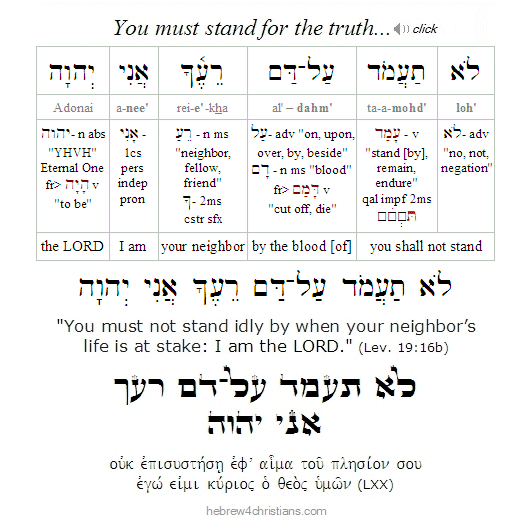 |
For more on this topic, see "Parashat Kedoshim: Battle Against the Lie."
Having a Circumcised Heart...

05.09.19 (Iyyar 4, 5779) Spiritually speaking if there is genuine life given in our LORD, then there must be evidence of what is called a "circumcised heart" (Deut. 10:16). If you call yourself a "Christian," that is, a follower of the Jewish Messiah, then you must have a Jewish heart (i.e., having a Jewish heart is necessary for being a Christian, and indeed you simply can't be a genuine follower of the Savior of Israel without such inward teshuvah). Note, however, that having a Jewish heart by itself is clearly not sufficient for being a follower of Messiah, no more than the presence of oxygen is sufficient for human life. Many people that have a Jewish heart clearly reject Yeshua as the Messiah. (Go to any Orthodox synagogue or attend a seminar at your local Jewish Community Center and you will find many Jews who truly have Jewish hearts but who are not followers of the Messiah Yeshua.) So while it's true that having a Jewish heart is not sufficient for being a Christian, it's a necessary consequence... One implication of this is that it is impossible for someone to be a true Christian and yet be an "anti-Semite" or hater of the Jewish people. This only makes sense, of course, since followers of Yeshua are "circumcised in the Spirit" (Rom. 2:29; Col. 2:11) and grafted into the covenantal promises and blessings originally given to the Jewish people (Rom. 11:17-24). A true Christian, in other words, will be "Jewish" in the spiritual sense (see Rom. 2:29). If you are Messiah's, you are a spiritual Jew; and by contraposition: if you are not a spiritual Jew, you are not a Christian.
I say this because I am perplexed that some who consider themselves Christians do not embrace their Jewish heritage and even make anti-Jewish statements (often in the name of their Christian theology). This sort of ignorance and hatred is diametrically opposed to the mission of Yeshua, who was born the King of the Jews and who came for the lost sheep of the House of Israel (Matt. 2:2; 10:5-6; 15:24).
Note: For more on this topic see, "Do you have a Jewish Heart?"
 |
The Olive Tree Israel...

[ Tonight is Yom HaAtzma'ut (יוֹם הָעַצְמָאוּת), Israel's Independence Day. Happy Birthday Israel ]
05.08.19 (Iyyar 3, 5779) Do you have a Jewish heart? If you say that you love the "LORD God of Israel" (יהוה אֱלהֵי יִשְׂרָאֵל) -- and it's clear that the LORD God of Israel loves the Jewish people -- it follows that you should likewise love the Jewish people (see Deut. 7:6-8; 14:2; 2 Sam. 7:23-24; 1 Kings 8:53; 10:9; 1 Chron 17:20-21; Isa 43:1-3; Jer. 31:31-37; Ezek. 36:24-28; Rom. 11:1-2;11:28; Hos. 11:1-11, etc.). After all, the LORD Yeshua is called מֶלֶךְ הַיְּהוּדִים / melech ha-Yehudim: the "King of the Jews" (Matt. 2:2, 27:11, etc.), and the very term "Mashiach" [i.e., "Christ"] is a regal term denoting the anointed King of Israel. Christians who pray to "Jesus Christ" are really praying to Yeshua as the anointed King of the Jews... And one day (very soon) Yeshua will indeed return to Jerusalem, the "City of the Great King" (Matt 5:35), to assume the throne of David and complete the redemption originally promised to the Jewish people (Zech. 12:1-13:1; 14:1-9, Ezek. 37:12-14, etc.). God will prove faithful to ethnic Israel. To deny this is to radically question God's faithfulness to the "Church." Indeed, let me say this as plainly as I can: Churches or teachers who claim that God has abandoned ethnic Israel are directly impugning the credibility of the Gospel message itself. Yes, it's that serious of an issue...
Note the verse that says, "I will bless those who bless you, but the one who discounts you will be cursed" (Gen 12:3). Why is this the case, chaverim? The answer is found in the second half of the verse: "For in you all the families of the earth shall be blessed" [i.e., through the advent of your Seed, the Messiah]. We cannot impugn the promises of God given to the Jewish people without likewise impugning God's promises given to us in Messiah. To say that God is "done with the Jewish people" or to consign them to a dark fate is to disregard them, to curse them, and that results in reciprocal judgment from heaven:
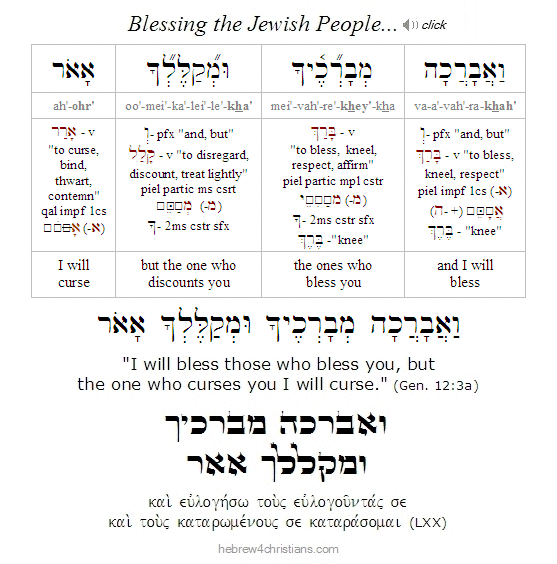 |
The physical descendants of Abraham are called בָּבַת עֵינוֹ (bavat eino), the "pupil of God's eye" (Zech. 2:8), a term of endearment God uses for no other nation on earth. Indeed the habitations of the nations were established based on the number of the children of Israel (see Deut. 32:8). The Scriptures declare that the LORD will never abandon His original covenant people but will yet choose them for His Name's sake (Isa. 14:1). The church has not replaced Israel in God's redemptive plan but is merely "grafted in" to the original "root" of Israel. "Remember," Rabbi Paul warns, "it is not you who support the root, but the root supports you" (Rom. 11:18).
Note: Please don't regard the "curse" mentioned in Gen. 12:3 to suggest that God is somehow vindictive, petty, etc. No, the reason the curse befalls those who reject God's plan for Israel is because Israel was the means God chose to bring salvation to the world: Yeshua was born the King of the Jews who came to ransom all those who trust in him from the curse of spiritual death (Gal. 4:4, Rom. 3:2, John 4:22). The reason God can't bless people who hate the Jewish people or Israel is because that would mean he would bless those who hate the truth, who spurn salvation, and who love darkness... The same God who promises us life and healing in Yeshua is the one who promised never to cast of Israel or to eternally disown the Jewish people. To paraphrase C.S. Lewis, God cannot give us a good apart from himself, since there literally is no such thing.
For more on this topic see, "Blessing the Jewish People."
 |
 |
The Goal of Holiness....
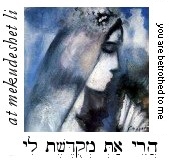
[ The following is related to our Torah reading this week, parashat Kedoshim.... ]
05.08.19 (Iyyar 3, 5779) "Be holy as I am holy" (Lev. 19:2). This doesn't mean wrapping yourself up in some protective cloak of religious rituals as much as it means accepting your own atonement: reconciling who you are with your past, finding healing and love, and walking in genuine hope... Holiness isn't as much "separation" from the profane as it is "consecration" to the sacred, and in that sense it is a kind of teshuvah, a turning of the heart back to reality.... Negatively put, "being holy" is turning away from fear, despair, and anger; positively put, it is embracing the worth and value of life, respecting the Divine Presence, and walking in the radiance of God's love. Hashivenu Adonai....
Forgiveness and Love...
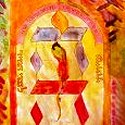
[ The following is related to this week's Torah reading, parashat Kedoshim... ]
05.07.19 (Iyyar 2, 5779) Notice that the great commandment to love your neighbor "kamokha" (i.e., "as yourself") is given in connection with forgiveness. Leviticus 19:18 reads, Lo tikom, ve'lo titor (לא־תִקּם וְלא־תִטּר): "You must not take vengeance nor bear a grudge ... but you must love your neighbor as yourself. I am the LORD." This means, among other things, that we must learn to forgive ourselves if we are to find hope... As an aside, let me ask why the oft-repeated phrase, "I am the LORD" appears after so many of the Torah's commandments (i.e., "You shall do x... I am the LORD")? The sages reply, to remind us that that God is "merciful and gracious, slow to anger and abounding in steadfast love and faithfulness." The LORD knows our hearts, chaverim, and perfectly understands our inner intentions. Yeshua, the Word of the LORD, is "sharper than any double-edged sword, piercing even to the point of dividing soul from spirit, and joints from marrow; it is able to judge the desires and thoughts of the heart" (Heb. 4:12).
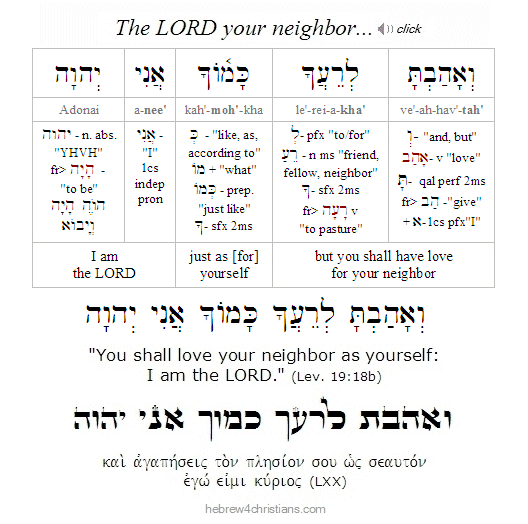 |
 |
Practical Holiness...
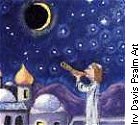
05.06.19 (Iyyar 1, 5779) Our Torah portion this week (i.e., parashat Kedoshim) reveals that the "appointed times" (i.e., mo'edim: מוֹעֲדִים) were given by God to help us turn away from the omnipresent urge within the human heart to embrace vanity: "Every one of you shall revere his mother and his father and guard (שָׁמַר) my Sabbaths (שַׁבְּתתַי)... Do not turn to worthlessness (i.e., אֱלִיל) or make for yourselves any molten gods" (Lev. 19:3-4). In other words, the Biblical holidays - including the weekly Shabbat, the monthly Rosh Chodesh, and so on - were intended to help us to sanctify ("set apart," "make holy") the times and seasons in order to remind us of God's Presence (Psalm 104:19). Therefore they are called mikra'ei kodesh (מִקְרָאֵי קדֶשׁ), "times in which holiness is proclaimed" (Lev. 23:2). The Torah's declaration that these days are holy implies that they are set apart for special activities, such as celebrating God as our Creator (Shabbat), our Redeemer (Passover), our Resurrection (Bikkurim/Firstfruits), our Law Giver (Shavuot/Pentecost), our King (Teruah/Rosh Hashanah), our High Priest (Yom Kippur/Day of Atonement), our Shelter (Sukkot/Tabernacles), and so on. In this connection it should be noted that it is a mistake to assume that the divine calendar was somehow abrogated with the cross of Yeshua, since all of the Jewish holidays center on Him, and indeed the advent of the Ruach Ha-Kodesh (Holy Spirit) occurred precisely after the prescribed 49 day countdown to Shavuot (see Acts 1:8; 2:1-4).
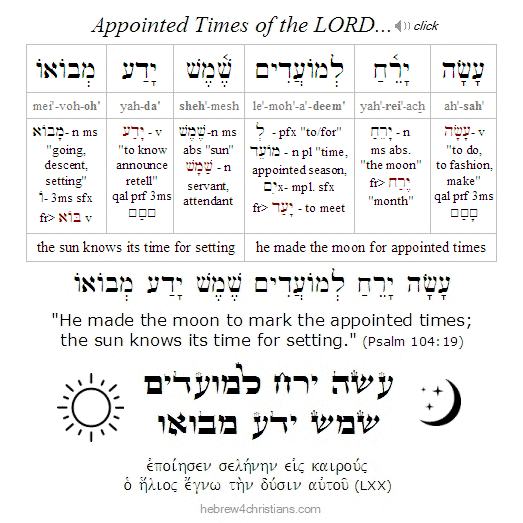 |
Presently our lives "suspended" between two worlds - this phenomenal world with its illusions (olam hazeh), and the real world of spiritual substance and meaning (olam haba). We exist in an "already-not-yet" state of expectation and yearning where we must consciously mediate the truth of heaven by bringing it "down to earth." This is a truth war, and by truth I do not mean intellectual knowledge as much as the living truth that marks the lifestyle and vision of a follower of Messiah. We consciously remember Torah truth; we choose to always "set the LORD before us," and take "every thought captive to the passion of Messiah..." May God help us heed the call to walk in holiness by the power of His love and grace. Amen.
For more on this subject, see "Practical Holiness: Further thoughts on Kedoshim."
The Prophetic Sign of Israel...
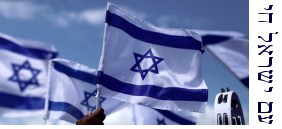
[ The following is related to Yom HaAtzma'ut (יוֹם הָעַצְמָאוּת) - Israel's Independence Day - which begins Wednesday, May 8th at sundown this year. Happy 71st Birthday, Israel! ]
05.06.19 (Iyyar 1, 5779) The Torah predicted that the "End of Days" would occur sometime after the return of the Jewish people from their worldwide dispersion back to the land of Israel (Deut. 30:1-3), and indeed the theme of exile and return is repeated in the prophets (Jer. 23:3; 32:37-38; Ezek. 37:21, etc.). Therefore it is surely extraordinary that Israel was reborn as a nation in their ancient homeland on May 14, 1948 (Iyyar 5, 5708), after nearly 2,000 years of exile... Moreover, the existence of the modern State of Israel is entirely consonant with New Testament prophecies regarding the advent of the Messiah, since Yeshua taught that the Jewish people would be in the land of Israel at the time of his second coming, and that the city of Jerusalem would be surrounded by enemies of the Jewish state (see Matt. 24-25; Mark 13, Luke 21). Furthermore, if we understand a "generation" to mean 70-80 years in duration (as stated in Psalm 90:10), then when Yeshua said, "this generation (ἡ γενεὰ αὕτη) shall not pass until all these things take place" (Matt. 24:34), he was referring to the generation that would originate with the restoration of the modern State of Israel, which further implies that Daniel's 70th Week (i.e., the Great Tribulation) could begin very soon. And while it is true that "no one knows the day or hour" of Yom Adonai haGadol (יוֹם־יְהוָה הַגָּדוֹל), the "great day of the LORD," our Lord faulted the Jewish religious leaders of his day (i.e., the scribes and the Pharisees) for failing to discern "the signs of the times" (see Matt. 16:3) and for missing the "time of their visitation" (see Luke 19:44).
מִי־שָׁמַע כָּזאת
מִי רָאָה כָּאֵלֶּה
הֲיוּחַל אֶרֶץ בְּיוֹם אֶחָד
אִם־יִוָּלֵד גּוֹי פַּעַם אֶחָת
mee · sha·ma · ka·zot
mee · ra·ah · ka·ei'·leh
hai·yoo··chal · e··retz · be·yohm · e·chad
eem · yee·va·led · goy · pa··am · e·chat

"Who has heard such a thing?
Who has seen such things?
Shall a land be born in one day?
Shall a nation be brought forth in one moment?"
(Isa. 66:8)

Like many other prophetic statements found in the Jewish Scriptures, this verse from the prophet Isaiah is "dual aspect," since it was both partially fulfilled when the Jewish people reestablished the State of Israel, but it will be entirely fulfilled at the outset of the Millennial Kingdom after the return of Messiah (see Isa. 66:7-16; Rom. 11:26). Meanwhile we behold the restoration of the "Fig Tree," and understand that the great harvest draws near, friends... May God help each one of us be awake, ready, with hearts full of steadfast faith (1 John 3:2-3; Titus 2:11-14; Matt. 24:32). Amen.
Regardless of how you may regard the prophetic events that herald the "end of the world," however, know this: Today might be your last in this world - your very own Rosh Hashanah when you will appear before the Judge and Creator of your life... Therefore live each day as if it might be your last and pray that God will help you to serve Him in the truth....
Note: Let me add that while we may discern that the time is indeed "short," I do not believe in "date setting" or predicting the return of the LORD, since that is חוכמה אטומה, "sealed wisdom" known only to the Father (Matt. 24:36, Acts 1:7; 1 Thess. 5:2, etc.). Shalom.
 |
The Life of Holiness (פרשת קדשים)...

[ The following is related to this week's Torah reading, parashat Kedoshim... ]
05.05.19 (Nisan 30, 5779) Chodesh tov, chaverim! Last week's Torah portion (Acharei Mot) discussed how the yearly Yom Kippur ritual would (provisionally) purge the uncleanness and sin of the people and restore the Sanctuary to a state of purity. This week's Torah portion (Kedoshim) continues the theme of purity with the LORD saying to "the whole assembly of Israel" (כָּל־עֲדַת בְּנֵי־יִשְׂרָאֵל), "You must be holy because I, the LORD your God, am holy" (Lev. 19:2). Indeed this portion lists more mitzvot (commandments) regarding practical ethics (musar) than any other of the Torah, thereby directly connecting the holiness of the community with obedience to God's moral truth...
וַיְדַבֵּר יְהוָה אֶל־משֶׁה לֵּאמר
דַּבֵּר אֶל־כָּל־עֲדַת בְּנֵי־יִשְׂרָאֵל וְאָמַרְתָּ אֲלֵהֶם
קְדֹשִׁים תִּהְיוּ כִּי קָדוֹשׁ אֲנִי יְהוָה אֱלהֵיכֶם
vai·da·beir · Adonai · el–Moshe · lei·mohr:
da·beir · el · kohl ·a·dat · be·nei · Yis·rah·eil · ve·ah·mart·ah · a·lei·hem
ke·doh·sheem · tee·he·yoo · kee ·kah·dosh · a·nee · Adonai ·E·lo·hey·khem

And the LORD spoke to Moses, saying,
"Speak to all the congregation of the people of Israel and say to them,
'You shall be holy, for I the LORD your God am holy.'"
(Lev. 19:1-2)

After stating the foundational requirement to be holy, the LORD begins to explain, "Each of you must respect (i.e., yirah: יִרְאָה) his mother and his father, and you must keep my Sabbaths. I am the LORD your God" (Lev. 19:3). The duty to revere (or honor) one's parents recalls the Fifth Commandment (Exod. 20:12), which is the starting point of learning to respect other people in our lives. Notice that the word for "my Sabbaths" (שַׁבְּתתַי) implies both the keeping of the weekly Sabbath as well as the "appointed times" of the LORD. As we will see, sanctifying time is a way we can express practical holiness in our lives...
Various practical commandments are given in this Torah portion through which a Jew is sanctified, or set apart to be kadosh - holy - and therefore fit for relationship with God. God is not only "wholly Other" (i.e., transcendent) but also pervades all of creation (i.e., "immanent"), and those who are called into His Presence must therefore be holy themselves. Such practical holiness results in sanctification obtained through the observance of commandments (mitzvot). These commandments include both mitzvot aseh (commandments to do something) and mitzvot lo ta'aseh (commandments to refrain from doing something). In addition, chukkim, or "statutes" are given that further separate the Jew from the customs and profanity of the surrounding nations.
For example, though it is inevitable (and psychologically necessary) that we make judgments about other people, the Torah states, be'tzedek tishpot amitekha, "in righteousness shall you judge your neighbor" (see also John 7:24), which implies that we must use the "good eye" (ayin tovah) when we think of other people. Indeed, the focal point and the very heart of what practical holiness represents is stated as ve'ahavta le're'akha kamokha - "You shall love your neighbor as yourself." Note that the direct object of the verb (ahav - to love) is your neighbor. But who, exactly, is my neighbor? Some have claimed that the word rea (neighbor) refers only to one's fellow Jew - not to others at large in the world. However this is obviously false, since the "stranger" (ger) is explicitly identified to be an object of our love (Lev 19:34). And note that Yeshua the Mashiach answered this question by turning it around. Instead of attempting to find someone worthy of neighborly love, I am asked to be a worthy and loving neighbor myself (Luke 10:29-37).

The phrase ve'ahavta le're'akha kamokha (Lev. 19:18) is considered the most comprehensive rule of conduct toward others found in the entire Torah. The Talmud (Shabbat 31a) tells the story of how Rabbi Hillel, a contemporary of Yeshua, was once challenged by a pagan: "Make me a proselyte, on the condition that you teach me the whole Torah while I stand on one foot." Hillel agreed, and while standing on one foot said, "What is hateful to you, do not do to your neighbor: that is the whole Torah and the rest is commentary; go and learn it." Yeshua likewise said, "In everything, treat others as you would want them to treat you, for this is the point of the law and the prophets" (Matt 7:12). The apostle Paul - who was a student of Hillel's grandson Gamaliel - likewise wrote: "Love (ἡ ἀγάπη) does no wrong to a neighbor; therefore love is the fulfillment (πλήρωμα) of the law" (see Rom. 13:10, Gal. 5:14).
Notice that the commandment to love our neighbor is given in connection with forgiveness. Leviticus 19:18 reads, Lo tikom, ve'lo titor (לא־תִקּם וְלא־תִטּר): "You must not take vengeance nor bear a grudge ... but you must love your neighbor as yourself. I am the LORD." In Jewish tradition, "Yom Kippur does not atone until we have made peace with one another." In light of the greater glory of the New Covenant, this may be stated, "the Cross of Yeshua will not avail you unless you are willing to forgive others for their sins against you" (Matt. 6:14-15).
The problem, of course, is not that we don't know what our duty before God is, but rather finding the means to truly live a life of love and forgiveness toward others in this fallen world... But thanks be to God - the Holy Spirit enables us to do the impossible...
New Shavuah Tov Audio Broadcast...
I know many of you enjoy the weekly "Shavuah Tov" audio broadcasts that I do for the weekly Torah readings, though it has been difficult finding the time to do these during the holiday season and also because of the amount of time required to update and maintain the Hebrew for Christians website. Nonetheless I was able, by God's grace, to find the strength and energy to do another broadcast tonight on parashat Kedoshim which I hope you will find helpful. See the links below to listen or to download the message. Thank you for your prayers that I might continue. Shavuah tov, chaverim!
Happy Mother's Day note: I want to express my heartfelt thanks to God for all the mothers out there, and particularly for my own mom and for my dear wife Olga, who is such a loving and kind mother to our three sons... Thank you so much, and happy Mother's Day, dear ladies.... What would we be without you?
The Month of Iyyar...

05.05.19 (Nisan 30, 5779) On the Torah's calendar, the month of Iyyar falls between the great month of redemption (i.e., Chodesh Yeshuah, or "Nisan") and the third month of revelation (Sivan), and is therefore primarily regarded as a "month of passage" to prepare us for the revelation given at Sinai (i.e., Shavuot or "Weeks," or "Pentecost"). Every day of this new month is counted in anticipation of the climactic jubilee of Shavuot. This year, the month of Iyyar began Saturday, May 4th at sundown and runs through the following day.
יְהִי רָצוֹן מִלְּפָנֵיךָ יהוה אֱלהֵינוּ וֵאלהֵי אֲבוֹתֵינוּ
שֶׁתְּחַדֵּשׁ עָלֵינוּ חדֶשׁ טוֹב בַּאֲדנֵינוּ יֵשׁוּעַ הַמָּשִׁיחַ אָמֵן
ye·hi · ra·tzon · mil·fa·ne·kha · Adonai · E·lo·hei·nu · ve·lo·hei · a·vo·tei·nu
she·te·cha·desh · a·lei·nu · cho·desh · tov · ba·a·do·nei·nu · Ye·shu·a · ha·ma·shi·ach · amen

"May it be Your will, LORD our God and God of our fathers,
that you renew for us a good month in our Lord Yeshua the Messiah. Amen."
Download Study Card
The month of Iyyar centers on Sefirat Ha-Omer (the "Counting of the Omer"), a 49 day countdown that runs from Nisan 16 through Sivan 5. The first day of the omer count begins on the second day of Passover, and the last day occurs the day before the Shavuot holiday begins. On our Gregorian calendars, these dates run from Saturday, April 20th through Friday, June 7th this year. This is a "countdown period" leading to the giving of the Torah at Sinai and the giving of the Holy Spirit to Yeshua's disciples...
Love's Greater Strength...
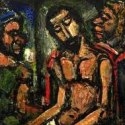
05.03.19 (Nisan 28, 5779) Among other things, the cross of the Messiah teaches us to distrust the realm of mere appearance in order to discern what is real, abiding, and true... We "see through a glass darkly" (1 Cor. 13:12). The cross transposes the values of this world by revealing that the inner is not the outer, and vice versa. At the cross the holy becomes the profane, the righteous becomes the condemned, and - baruch Hashem - the other way around. The cross is the place of the "great exchange" (2 Cor. 5:21). For those enslaved by the "matrix" of this world, the message of the cross is regarded as "foolishness," since the world cannot comprehend how grace can overturn "karma" (i.e., law); however, to those who are saved, the cross represents the very power of God (1 Cor. 1:18). The cross of Messiah overturns the heartless "wisdom" of this world by offering God's heart and love for the world's outcasts...
We "walk by faith, not by sight," and therefore we must live as if the invisible is visible... The LORD God Almighty is on the throne, despite the prevalence of wickedness and depravity in this world. The Scriptures foretell of the increase of wickedness during the prophesied "End of Days" before the Great Tribulation (2 Tim. 3:1-5), yet meanwhile the LORD continues to offer His forbearance and salvation to the world, "not willing that any should perish, but that all should turn to Him in teshuvah" (2 Pet. 3:9). God's forbearance is a demonstration of His great strength, since "in order to forgive sin, it is necessary to have power, just as one must have power in order to return strength to the sick." As Lev Tolstoy once wrote, "Do not think that courage lies only in boldness and power. The highest courage is the courage to be above your rage and to love a person that has offended you."
גֵּוִי נָתַתִּי לְמַכִּים וּלְחָיַי לְמרְטִים
פָּנַי לא הִסְתַּרְתִּי מִכְּלִמּוֹת וָרק
gie·vee · nah·ta·tee · le·mak·keem · oo·le·khah·yai · le·moh·re·eeim
pah·nai · loh · hees·tar·tee · meek·lee·moht · va·rohk

"I gave my back to those who strike, and my cheeks to those
who pull out the beard; I hid not my face from disgrace and spitting."
(Isa. 50:6)

This verse undoubtedly refers to the public scourging of Yeshua our LORD, since there is no evidence that Isaiah ever underwent such treatment (see Luke 18:32). Yeshua was brutally whipped, his beard was literally ripped or torn off his face (the Septuagint renders it, "and my cheeks to blows"), and he was shamefully spat upon – despite being the King of kings of kings... Despite being mocked and humiliated, the Messiah did not retaliate, nor did he invoke divine power to avenge himself or protect his honor and office. The Apostle comments: "When he was reviled, he did not revile in return; when he suffered, he did not threaten, but continued entrusting himself to the One who judges justly" (1 Pet. 2:23). There is strength that cannot be overcome by the carnal world and its devices; there is the heart of God that decrees his love is stronger than death itself.
Part of the Torah of Yeshua (תּוֹרַת ישׁוּעַ) is to love our enemies and to do good to them (Matt. 5:44; Luke 6:27). Likewise, the apostle commands to overcome evil with goodness (Rom. 12:21). Being able to love our enemies is truly miraculous, because we are naturally wired to seek revenge when others hurt us... Loving an enemy is surely the highest form of love, and therefore only God can help us do this, chaverim. "What I tell you in darkness, that speak ye in light: and what ye hear in the ear, that preach ye upon the housetops. And fear not them which kill the body, but are not able to kill the soul: but rather fear him which is able to destroy both soul and body in hell" (Matt. 10:27-28).
Lev Tolstoy also recounts this story about suffering wrong for the sake of God's love:
"Abu Ganifakh died in a prison in Baghdad in which he had been put by Caliph al-Mansur for refusing to accept the teaching of Kaad. Once, before his death, when this famous spiritual teacher received a heavy blow from a guard, he told the man who hit him, "I could render you an injury after you have done an injury to me. I could complain to the Caliph, but I will not complain. In my prayers, I could tell God about this offence which you have done to me, but I will refrain from this. During the day of the Final Judgment I could ask divine revenge for your act, but even if this day comes today, and even if I knew that my prayer would be heard, even then I would enter paradise only with you." (A Calendar of Wisdom)
It is quite natural to love our friends and to hate our enemies, but it requires a radically transformed heart to be able to love one's enemies: "If you love those who love you, what reward do you have? Do not even the tax collectors do the same?" (Matt. 5:46-47; Luke 6:32). As Tolstoy said, it takes more courage, more heart, to rise above your rage and to forgive and love a person that has harmed you. That requires a miracle, lev chadash v'ruach chadashah (לֵב חָדָשׁ וְרוּחַ חֲדָשָׁה), a "new heart and and a new spirit" directly imparted by the hand of the Living God (Ezek. 36:26).
Anthony de Mello asks, "Is it possible for the rose to say, 'I will give my fragrance to the good people who smell me, but I will withhold it from the bad?' Or is it possible for the lamp to say, 'I will give my light to the good people in this room, but I will withhold it from the evil people'? Or can a tree say, 'I'll give my shade to the good people who rest under me, but I will withhold it from the bad'? These are images of what love is about." In other words, love suffers long and is kind; it bears all things, believes all things, hopes all things, endures all things" (1 Cor. 13:4,7).
Underneath a lot of our anger is hurt, or anyway the fear of being hurt... Our fear is often rooted in this world and our dread over temporal loss. May the LORD our God help us walk by faith, not by sight, as if the invisible is indeed visible... We affirm that the LORD is forever on the Throne and will never be deposed; therefore may we be looking to Him alone as the Source of our strength and power -- even to love our enemies.
Postscript: Faith is easy if it is merely understood in the categories of the "interesting" or the "insightful," since then it pleases people and requires nothing in return. Even easier it is to flatter others, to tickle their ears, and to build up their ego in the name of spirituality or religion! However, when the demand comes, when people understand that there is a real and eternal obligation to authentically live in light of its truth - even to their own potential loss - then the interest quickly fades... Here is a test case, a way to examine our hearts: "Love your enemies, do good to those who hate you" (Luke 6:27).
 |
The Importance of Gratitude...

05.03.19 (Nisan 28, 5779) Sin, at its root, is a type of ingratitude - the arrogant view that life is something "owed" to you, that it is yours by right, instead of humbly accepting it as a gift from God. The ungrateful soul often feels threatened or offended when it regards the present supply to be lacking, and it tends to either blame others or to assume the role of a victim... Such discontent reveals arrogance, since it falsely assumes that life should center around the ego and its demands. "A proud man is seldom a grateful man, for he never thinks he gets as much as he deserves" (Beecher). Ultimately ingratitude is a form of idolatry, since it claims that it "owns" its own soul and can do with it as it wishes.
"The careless soul receives the Father's gifts as if it were a way things had of dropping into his hand... yet he is ever complaining, as if someone were accountable for the problems which meet him at every turn. For the good that comes to him, he gives no thanks - who is there to thank? At the disappointments that befall him he grumbles - there must be someone to blame!" - George MacDonald
There is the story of how Caesar, having prepared a great feast for his nobles and friends, was greatly displeased because the appointed day's weather was so stormy that the event had to be canceled. In a fit of rage he commanded all his archers to shoot their arrows at the heavens, in an attempt to defy Jupiter for the rainy weather. When the soldiers began shooting their arrows, however, they returned upon their own heads so that many of them very sorely wounded. And so it is with our mutterings and murmuring, which are like arrows shot at God Himself, which of course can never hurt Him, but which assuredly return upon our own heads to our own hurt. Indeed, the murmurer blasphemously charges God Himself with folly, as if God were somehow incompetent or responsible for thwarting the ego's desire... Therefore we see that murmuring is as witchcraft before the LORD (1 Sam. 15:23): "How long shall I bear with this evil congregation that murmurs against me?" (Num. 14:27). As Charles Spurgeon noted: You say, 'If I had a little more, I should be very satisfied.' You make a mistake. If you are not content with what you have, you would not be satisfied if it were doubled" (Spurgeon: Treasury of David).
The grateful soul, on the other hand, humbly acknowledges that every moment of life is a gift from heaven, and therefore constantly offers thanks to heaven: "I will give thanks to the Lord with my whole heart" (Psalm 9:1); "give thanks to the Lord of lords, for his steadfast love endures forever" (Psalm 136:3). Since all things come from God, we have a duty to love Him bekhol levavkha, with all our hearts (Deut. 6:5). As C.S. Lewis wrote, "We ought to give thanks for all fortune: if it is good, because it is good; if bad, because it works in us patience, humility, contempt of this world and the hope of our eternal country."
It is important to understand that no blessing from heaven is issued based on supposed virtues or in repayment of good "works," since by definition the idea of divine blessing implies God's irrepressible grace (Rom. 4:4). As Ben Zoma rightly observed: "Who then is rich? He who rejoices in his portion, as it is written: 'You shall eat the fruit of the labor of your hands; you shall be happy, and it shall go well with you' (Psalm 128:2). 'You shall be' refers to this world; and 'it shall be well with you' refers to the world to come" (Avot 4:1). The LORD will never forsake the person who puts their trust in Him (Heb. 13:5; Josh 1:5; Isa. 41:10). As the Apostle Paul wrote, "godliness with contentment is great gain" (1 Tim. 6:6).
אַשְׁרֵי כָּל־יְרֵא יְהוָה הַהלֵךְ בִּדְרָכָיו
יְגִיעַ כַּפֶּיךָ כִּי תאכֵל אַשְׁרֶיךָ וְטוֹב לָךְ
ash·rei · kohl · ye·rei · Adonai · ha·ho·leikh · beed·rah·khav
ye·gee·ah · ka·pey·kha · kee · toh·khel · ash·rey·kha · ve·tohv · lakh

"How blessed is everyone who fears the LORD, who walks in his ways!
You shall eat the fruit of the labor of your hands;
you shall be blessed, and it shall be well with you."
(Psalm 128:1-2)

D.L. Moody once said, "There are many of us that are willing to do great things for the Lord, but few of us are willing to do little things." Many people are content to "serve" God only on their terms, only if it such service somehow pleases them, etc. We must be careful! There are many carcasses strewn along the way of so-called ministry, where people fooled themselves into thinking they were doing God a favor by means of their service. "All the ways of a man are clean in his own eyes, but the LORD weighs the spirits" (Prov. 16:2). "Why do you call me 'Lord, Lord,' and not do what I tell you?"
As I mention below, ingratitude is directly linked to the withering effects of arrogance and pride. "Pride is of such intimate connection with ingratitude that the actions of ingratitude seem directly resolvable into pride as the principal reason of them." Ultimately, this withering of the soul can lead to the outer darkness of hell itself:
The whole difficulty of understanding Hell is that the thing to be understood is so nearly Nothing. But you'll have had experiences... it begins with a grumbling mood, and yourself still distinct from it: perhaps criticizing it. And yourself, in a dark hour, may will that mood, embrace it. You can repent and come out of it again. But there may come a day when you can do that no longer. Then there will be no you left to criticize the mood, nor even to enjoy it, but just the grumble itself going on forever like a machine." - C.S. Lewis (The Great Divorce)
It has been said that hell is a locked door - from the inside. It shuts out the light and refuses the message of God's great love. It is the joy of the LORD that gives us strength and refuge (Neh. 8:10). Undoubtedly there will be a lot of surprises in the world to come, when the unknown, the nameless, the anonymous, and the least likely of souls will be honored by God for their quiet and faithful service to the "least of these." The first will be last... everyone who exalts himself will be humbled, and he who humbles himself will be exalted. May the LORD help each of us to humbly turn to Him and confess our need for His mercy and grace.
"The LORD ponders the hearts" (Prov. 21:2). If you are in ministry, it is always good to remember that the LORD God Almighty, the Master of the Universe, does not in any way need your help, your support, or your vote of confidence in Him. On the contrary, if you hope to truly serve the Living God, you desperately need His help lest you incur judgment!
A grateful heart chooses to find wonder and countless blessings in the seemingly mundane realm of everyday life. It uses the "good eye," even in when the heart is wounded and looking for relief... "Thou who hast given so much to me, give me one more thing - a grateful heart!" (George Herbert). Amen. May our Lord keep our hearts soft and full of thanks for the ongoing wonder of His love and salvation!
Receive every day as a resurrection from death, as a new enjoyment of life; meet every rising sun with such sentiments of God's goodness, as if you had seen it, and all things, new-created upon your account: and under the sense of so great a blessing, let your joyful heart praise and magnify so good and glorious a Creator. - William Law
Withering Heights...
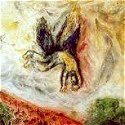
05.03.19 (Nisan 28, 5779) One who is proud and haughty is like one who denies the existence of the LORD, as it is written: "And your heart will become haughty (וְרָם לְבָבֶךָ) and you shall forget the LORD your God who brought you out of the house of slavery" (Deut. 8:14). Note that the Hebrew word for "forget" (i.e., shakhan: שָׁכַח) can mean to wither (ξηραίνω) and become useless (John 15:6, James 1:11). As it is written in Psalm 137:5, "If I forget you (אֶשְׁכָּחֵךְ), Jerusalem let my right hand wither (תִּשְׁכַּח)." Therefore we see that pride is the original sin itself, denying the very First Commandment itself: "I am the LORD thy God (אָנכִי יְהוָה אֱלהֶיךָ) who brought you out of the house of slavery" (Exod. 20:2). Exalting the ego by "forgetting" about the LORD - that is, by suppressing the truth of His reality, power, and glory - invariably leads to inward withering. Just as the ego attempts to "puff itself up" and to enlarge itself, so forgetting about God leads to a corresponding withering of soul, a diminution of heart. This is yet another example of the spiritual principle: "the first shall be last and the last shall be first" (Mark 9:35; Matt. 20:25-26).
אָנכִי יְהוָה אֱלהֶיךָ
אֲשֶׁר הוֹצֵאתִיךָ מֵאֶרֶץ מִצְרַיִם
מִבֵּית עֲבָדִים
ah·noh·khee · Adonai · E·loh·hey·kha
a·sher · ho·tzei·tee·kha · mei·e·retz · meetz·ra·yeem
mee·beit · a·vah·deem

"I am the LORD your God,
who brought you out of the land of Egypt,
out of the house of slavery." (Exodus 20:2)

The New Testament records: "ὅτι χωρὶς ἐμοῦ οὐ δύνασθε ποιεῖν οὐδέν" (John 15:5) which means "without me (Yeshua) you are not able to do anything" (of eternal significance).... So long as we are full of ourselves, we will wither, dry up, and become like chaff in the wind. We all have our personal Egypt, our desert, our time of being brought low so that we can remember that God alone has the power to rebuild us by means of His grace. Suffering, afflictions, and yissurim reveal to us our nothingness of our false greatness, and therefore they teach us to modestly and humbly ask for God's deliverance. May LORD our God help each of us humble ourselves so that we can behold His glory...
Evil and Postmodernism...

[ The following is related to Yom HaShoah, or Holocaust Memorial Day... ]
05.02.19 (Nisan 27, 5779) Our socially engineered culture promotes devout faith in the values of "tolerance" and "open-mindedness," though the way these words are used barely conceals a cynical indifference and hostility to the view that objective truth – that is, a metaphysical, moral and spiritual order to reality – is transcendentally knowable and logically necessary. Many intellectual "tools" of our time (i.e., the censors of culture, the sham virtue signalling used by the talking heads of mass media, etc.) claim that all worldviews and religious perspectives "should be" deconstructed, qualified, minimized, homogenized, and reduced to equal (in)significance; and, since there is no impartial way to arbitrate such pluralistic convictions about reality, all respective truth claims "should be" understood as relative, subjective, and even as a form of political exploitation or manipulation. Of course this deeply skeptical philosophy is "magically" immune from its own criticism, since to know that skepticism is true is to claim to know something true about reality after all, and yet this contradiction doesn't seem to bother the fake "intellectuals" of our day in the least. Indeed, postmoderns are brainwashed to extol "tolerance" as the preeminent intellectual value, which essentially means extolling apathy and cowardice as the guiding intellectual virtues of thinking. The so-called "tolerant" person of today is someone trained to be without conviction, someone taught to be a self-policing coward who is unwilling to stand up for the truth or to risk offending others...
"Those who do not love truth excuse themselves on the grounds that it is disputed and that very many people deny it. Thus their error is solely due to the fact that they neither love truth nor charity, and so they have no excuse" (Blaise Pascal, Pensees). Many people today opt out of the mandate to search for (and to live by) the truth, because, they claim, not everybody agrees on what the truth is, and therefore they are "excused" from the duty... Such people want to be "innocent" of taking sides in the issue, pretending to be "neutral" parties in the debate, and thereby they suppress their judgment rather than risk a commitment. Of course this amounts to the decision not to decide and therefore expresses evasion and indifference to moral and spiritual reality ("bad faith"). By pretending to embrace a form of emotional neutrality or "objectivity," postmodernism puts a dagger into the heart of man. C.S. Lewis calls us to "be awakened from the slumber of cold vulgarity" and warns that "a hard heart is no infallible protection against a soft head" (C.S. Lewis: The Abolition of Man). "No emotion is, in itself, a judgement; in that sense all emotions and sentiments are alogical. But they can be reasonable or unreasonable as they conform to Reason or fail to conform. The heart never takes the place of the head: but it can, and should, obey it" (ibid).
"The head rules the belly through the chest - the seat of emotions organized by trained habit into stable sentiments ... these are the indispensable liaison officers between cerebral man and visceral man. It may even be said that it is by this middle element that man is man: for by his intellect he is mere spirit and by his appetite mere animal... And all the time -- such is the tragi-comedy of our situation -- we continue to clamour for those very qualities we are rendering impossible. You can hardly open a periodical without coming across the statement that what our civilization needs is more 'drive,' or dynamism, or self-sacrifice, or 'creativity.' In a sort of ghastly simplicity we remove the organ and demand the function. We make men without chests and expect of them virtue and enterprise. We laugh at honour and are shocked to find traitors in our midst. We castrate and bid the geldings be fruitful (Lewis: The Abolition of Man).
Yeshua warned us that the love of many would grow "cold" (i.e., ψύχω, "to flicker out, wane, extinguish, dissipate") in the latter days (Matt. 24:12), suggesting not so much the absence of fierce passions (which on the contrary would be unrestrained, see 1 Tim. 3:1-4) but manifesting the depravity that results from being "out of alignment" with moral and spiritual reality... The hedonist, the lover of the vanities of this world, is an impaired soul, a soul deluded by disordered loves, a disfigured being marked by an "ontological inappropriateness" to the revelation of life itself... The "narrow gateway of life" (שַּׁעַר אֶל־הַחַיִּים) is found only by the few (Matt. 7:13-14), and Yeshua doubtlessly said this to reprove the mob mentality that regards unthinking "tolerance" as the greatest of all virtues and moral conviction as the greatest of all evils ("fanaticism"). There is safety in numbers, or so the mob reasons, and the life of earnest conviction therefore makes you an outsider or outcast of the group, since it exposes the "groupthink" and its inevitable moral evasions.... "In times of universal deceit, telling the truth is a revolutionary act" (George Orwell). The enemy of the state today is a person with real conviction; the devil seeks to homogenize society by creating a culture of fear over being marked as a genuine individual. This was true in the days of the Hebrew prophets as it is today. "The voice crying in the wilderness" often cries alone.
 |
Deliver Us from Evil...

[ Today marks Yom HaShoah, or Holocaust Memorial Day... ]
05.02.19 (Nisan 27, 5779) In hindsight of his harrowing experience at the death camps, Holocaust survivor Viktor E. Frankl wrote: "No man should judge unless he asks himself in absolute honesty whether in a similar situation he might not have done the same" (Man's Search for Meaning, 1984 edition). There is a "shadow" or darker side to ourselves that we normally keep hidden from view, even from ourselves. Yeshua said "out of the heart come evil thoughts, murder, adultery, sexual immorality, theft, false witness, slander, and these are what defile a person" (Matt. 15:19-20). If you were given a magic ring which when placed on your finger made you invisible, would your behavior change? Would you be moral if you were entirely sure that you wouldn't be held accountable? Why is it difficult to understand our true motives, to "own" the darker impulses that sometimes rise within us? Each of us can act like a petty Pharaoh, and - dare I say it - even like a cruel Nazi at times, blaming others to excuse our own evil ways... When we come to the light to confess the truth, we become more aware of what we really need, and we can ask God for healing; we then can forgive ourselves and begin to "lift off" our stuff from others.
עָקב הַלֵּב מִכּל וְאָנֻשׁ הוּא
מִי יֵדָעֶנּוּ
ah·kohv · ha·leiv · mee·kohl · ve·a·noosh · hoo
mee · ye·dah-e·noo?

"The heart is deceitful above all things and woefully sick;
who can understand it? (Jer. 17:9)

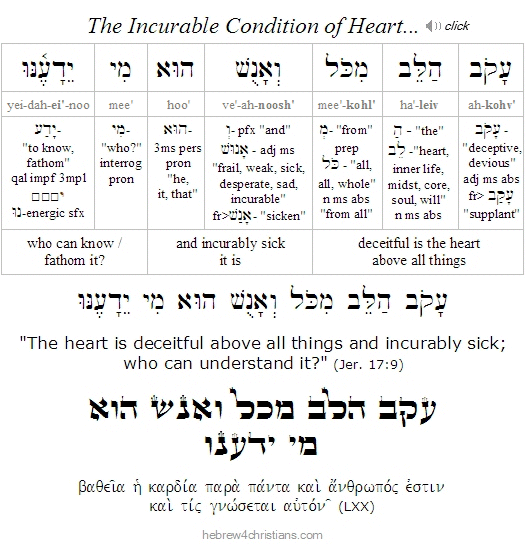
The heart is deceitful above all things and woefully sick - mi yadeinu? - who can know it? But how is the heart sick? By seeking excuses to evade the truth of its great need; by denying its own inner poverty... "No person is saved except by grace, yes; but there is one sin that makes grace impossible, and that is dishonesty; and there is one thing God must unconditionally require, and that is honesty" (Soren Kierkegaard).
Julian of Norwich said, "All shall be well, and all shall be well and all manner of thing shall be well," and yet the darkest pitch of depression is precisely the inability to take hold of such hope... Faith in the midst of darkness must yet affirm that despite own sin, our own wretchedness, nothing will hinder nor overcome the working of God's goodness...
Humility and God's Presence...
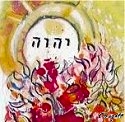
05.02.19 (Nisan 27, 5779) We read in our Torah for this week (i.e., Acharei Mot): "in this way (בְּזאת) Aaron shall come into the Holy place: with a bull from the herd for a sin offering and a ram for a burnt offering" (Lev. 16:3). Here the sages note the word b'zot (בְּזאת), meaning "in this way," is numerically equivalent to the Hebrew word shafal (שָׁפָל), meaning "fallen," "broken," "made low," or "humble," which suggests that the way to enter the holy place is by means of humility... On the other hand it is written: "the arrogant cannot stand in God's presence" (Psalm 5:5) because pride blinds the heart from apprehending Reality. Indeed the word translated "arrogant" in Psalm 5:5 is hollelim (הוֹלְלִים), literally, the "shining ones" who praise themselves but are spiritually regarded as לֹא שָׁפוּי, or "insane." Our Torah verse teaches that we can only come before the Divine Presence with "fear and trembling," that is, by understanding the truth of our radical need for deliverance and healing... Da lifnei mi attah omed: "Know before Whom you are standing..."
 |
 |
A Living Faith...

[ The following is related to our Torah reading this week, parashat Acharei Mot... ]
05.02.19 (Nisan 27, 5779) From our Torah portion this week we read: "You shall keep my decrees and my judgments, the pursuit of which man shall live: I am the LORD" (Lev. 18:5). The Kotzker Rebbe advised reading this verse as "You shall keep my decrees and judgments to bring life into them," meaning that we should bring all our heart, soul, and strength into the teaching of Torah. The commandments nourish the soul as food does the body. Just as we seek to make our food flavorful, so we seek to observe the truth with conviction and joy. "And let the beauty of the LORD our God be upon us: and establish the work of our hands upon us; yes, establish the work of our hands" (Psalm 90:17).
וִיהִי נעַם אֲדנָי אֱלהֵינוּ עָלֵינוּ
וּמַעֲשֵׂה יָדֵינוּ כּוֹנְנָה עָלֵינוּ
וּמַעֲשֵׂה יָדֵינוּ כּוֹנְנֵהוּ
vee·hee · no'·am · Adonai · e·lo·hey'·noo · a·ley'·noo
oo·ma·a·seh · ya·dey'·noo · ko·ne·nah · a·ley'·noo
oo·ma·a·seh · ya·dey'·noo · ko·ne·nei'·hoo

"May the beauty of the Lord our God be upon us,
and establish the work of our hands upon us;
yea, establish the work of our hands."
(Psalm 90:17)

Download Study Card
The Heart of Atonement...

[ The following is related to our Torah reading this week, parashat Acharei Mot... ]
05.02.19 (Nisan 27, 5779) Most of our deepest anxieties come from the fear of death, whether we are conscious of this or not... Death represents fear of the unknown, fear of being abandoned, fear of being rejected, fear of being separated from others, and so on. I am so glad Yeshua gives us eternal life, which for me is not so much about immortality of the soul as it is being loved and accepted by God... That is what "at-one-ment" means, after all (John 17:22-23). Because God loves and accepts us, we trust Him to be present for us, even in the darkest of hours, on the other side of the veil, where he there "prepares a place for us" (John 14:2). As Yeshua said, "I tell you the solemn truth, the one who hears my message and believes the One who sent me has eternal life (חַיֵּי עוֹלָם) and will not be condemned, but has passed (i.e., μετά + βαίνω, lit., "crossed over" [עָבַר]) from death to life" (John 5:24). God's love "crosses over" from death to life and now forever sustains me.
Our Torah reading for this week (Acharei Mot) provides details about Yom Kippur, or the "Day of Atonement," a special service that gave ritual expression of God's love by making purification for our sins. As I've explained before, the word for love (i.e., ahavah: אהבה) equals the number thirteen (1+5+2+5=13), but when shared it is multiplied: 13 x 2 = 26, which is the same value for the Sacred Name (יהוה), i.e., (10+5+6+5=26). Likewise the Hebrew word for "life" is chayim (חַיִּים), is written in the plural to emphasize that life cannot be lived alone but must be shared. Notice that within the word itself are embedded two consecutive Yods (יי), representing unity in plurality (Yod-Yod is an abbreviation for YHVH, also indicating the "deep Akedah" of Father and Son). God gave up His life so that we can be in relationship with Him, that is, so that we can be "at-one" with His heart for us. Whatever else it may mean, then, the Hebrew word for "atonement" (i.e., kapparah, "covering," "protection," "purification," "forgivenenss") is about accepting God's heart for you - being unified in his love - and if you miss that, you've missed the point of the Torah's teaching....
 |
Courage and Humility...
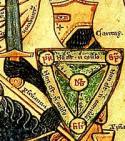
05.01.19 (Nisan 26, 5779) We are admonished in our Scriptures: "Test yourselves to see whether you are in the faith" (2 Cor. 13:5). We are to courageously look at our lives and ask some tough questions. γνῶθι σεαυτόν: "Know yourself." Do you really believe the truth, or are there other motives at work? Is it possible to think that you really believe when in fact you don't? For example, is it possible to think that you are a spiritual person who serves God, but you are mistaken? Tragically it seems that we can "talk ourselves into" believing that we are moral, honest, full of faith, and so on, but our self image does not agree with reality... This is a more serious problem than hypocrisy (not believing what we say), since in this case we really do believe that we are something we are not – we are "true believers" in a distorted view of ourselves! This happens all the time. Most people think they are "above average" and have a generously high opinion of themselves. Self esteem is important, of course, but it must be grounded in reality: "For if anyone thinks he is something, when he is nothing, he deceives himself" (Gal. 6:3). Yeshua warned, "On that day many (πολλοὶ) will profess to me, 'Lord, Lord, did we not prophesy in your name, and cast out demons in your name, and do many mighty works in your name?' And then will I profess to them, 'I never knew you; depart from me, you workers of lawlessness'" (Matt. 7:22-23). How is such a dreadful outcome possible unless truly religious people can indeed truly fool themselves? By itself, sincerity is no measure of truth, since we can truly sincere, and yet sincerely wrong... Consider those today who literally kill others for the sake of their "religion" or "politics." Indeed nothing is more common in this world than for people to value their own conceits above the matters of God!
This is a sobering message, friends. In light of the "ubiquity of iniquity" -- the pervasiveness of sin, perversity, arrogance, self-deception, cruelty, and craven cowardice that marks fallen human nature, we must be sober and vigilant... We are not to live in fear of man or his devices though we should fear our own sinful hearts and loathe our own wretchedness... We should fear God! We must regularly engage in cheshbon hanefesh, to account for the state of our souls (1 Cor. 11:31). We are often people of "little faith" (Matt. 8:26), and sometimes the only honest thing is to plainly confess, "Lord, I believe; help my unbelief!" (Mark 9:24). As it is written: "The LORD is near to all who call on him, to all who call on him in truth" (Psalm 145:18). We find strength by trusting in love and kindness of God for our eternal good. It is written: "This is the confidence (παρρησία) that we have with Him, that if we ask anything according to His will, he hears us. And if we know that He is hearing us, we also know that He will fulfill the petition of our heart" (1 John 5:14-15). What does God want for you but to know his love? He wants you to walk in the truth, full of love, joy, peace, patience, having a sound mind, free of anxiety, and free of interference from the demonic. We can confidently ask God for these things because these are assuredly His will and blessing for our lives....
If you honestly share your heart with the LORD God of Israel by means of his love manifest in Yeshua, and if you abandon yourself to his promises, not trusting in your own supposed righteousness but in the one who justifies the ungodly, then you need not fear the dreadful words of judgment: "I never knew you, depart from me..." Faith is the obedience of Torah; it is the core issue of all that follows. Because we never get beyond our need for deliverance from ourselves, the opposite of sin is not virtue but faith that trusts the heart of the Father.
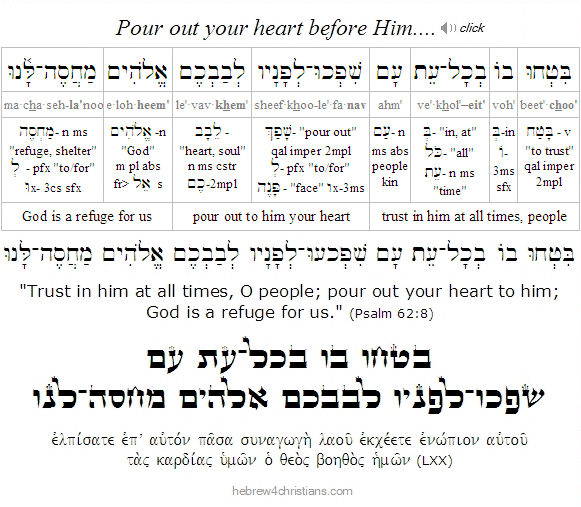 |
 |
Yom Kippur and the Gospel...

[ Our Torah portion for this week (i.e., Acharei Mot) concerns the great Day of Atonement. ]
05.01.19 (Nisan 26, 5779) When God revealed to Moses the meaning of the Name "LORD" (i.e., YHVH: יהוה), he was given the revelation of Shelosh Esrei Middot - the 13 attributes of God's Mercy (Exod. 34:6-7). The LORD described Himself as a God who is merciful and gracious, slow to anger, and abounding in love (chesed) and truth (emet), who guards love and carries (נָשָׂא) iniquity (עָוֹן), transgression (פֶּשַׁע), and sin (חֵטְא), but who will not clear the guilty... In other words, because the LORD is holy and righteous, he cannot leave the guilty unpunished. This follows from the fact that God cannot lie (Num. 23:19; Titus 1:2). Since God necessarily must be true to His nature, he cannot negate the truth or violate justice. The LORD cannot sweep sin "under the rug" or pretend that it is not there.
While it is true that God is love, it is also true that He is righteousness and justice, and these attributes of His nature cannot be divided or separated. It is written in our Scriptures: צֶדֶק וּמִשְׁפָּט מְכוֹן כִּסְאֶךָ - "righteousness and justice are the foundation of Your throne" (i.e., the symbol of His Kingship). The King of the Universe commands those created in His image and likeness to observe His will (i.e., moral law), and sin is expressly defined as "lawlessness" (ἡ ἁμαρτία ἐστὶν ἡ ἀνομία), understood to mean the repudiation of God's authority to rule (1 John 3:4). Sin is therefore essentially a form of high treason against God's Kingship and authority, and the demand to be autonomous ("self governing") is the (vain) attempt to take the crown from God Himself.
All human beings are sinners who share in the "fallenness" of the Adam ha-rishon (Rom. 3:23; 5:12). We do not just commit sins, as if they were "accidental" to our nature, but we are sinners in the sense that sin is part of our "heart" or core personality structure (Eph. 2:3; Matt. 15:19). We all afflicted with the lethal disease of "spiritual death," and our falleness has "noetic" implications: "The mind (τὸ φρόνημα) that is set on the flesh is hostile (ἔχθρα) to God, for it does not submit to God's law; indeed, it cannot" (Rom. 8:7).
Since God is perfectly righteous, sin must be judged for what it really is: treason against His loving and righteous will. Both the human conscience and the revealed will of God (i.e., the moral law contained in the Torah of Moses) clearly indict all mankind of treason before the tribunal of a Holy and Righteous God. Indeed, every mouth will be stopped before the bar of the Holy One's judgment (Rom. 3:19).
The Scriptures plainly teach that the penalty for sin is death (Gen. 2:16-17; Rom. 6:23; Isa. 59:2, Ezek. 18:4). Physical death is a symptom of the deeper and more serious problem of eternal, or spiritual, death. Just as physical death represents the separation of the soul from the body, so spiritual (or eternal) death represents the separation of the soul from the Presence of God. Spiritual death is pictured as hell, a place of eternal suffering and horror (Mark 9:43; Rev. 20:10). Hell is described using frightful metaphors in Scripture. It is said to be a fiery pit (Matt. 18:8-9), an eternal fire (Matt. 25:41, Jude 7), a lake of fire (Rev. 20:15), a place of "outer darkness with weeping and gnashing of teeth" (Matt. 8:12; 13:50; Rev. 21:8), and a place of eternal punishment (Matt. 25:46). These are horrific images of warning intended to shock us out of our spiritual stupor... Wake up! Your life matters and everything you do has eternal weight and significance!
Yeshua's first words of public ministry were "Repent and believe the gospel" (Mark 1:15). The word "repent" is metanao (μετανοέω), meaning "change your thinking" (i.e., transcend your fears and prejudices) and the word "gospel" means "good news" (i.e., εὐαγγέλιον, from , εὖ- "good," and ἄγγελος, "message"). We could therefore translate the verse as: "Change your thinking and believe the message of God's good will toward you." When the Apostle Paul later testified of his dramatic conversion experience on the Road to Damascus, the resurrected Messiah commissioned him to go to the nations in order to "open their eyes, so that they may turn (ἐπιστρέφω) from darkness to light and from the power (i.e., authority, ἐξουσία) of Satan to the power of God, that they may receive forgiveness of sins and a place among those who are sanctified by faith in me" (Acts 26:18).
Humanity's greatest need is to be loved and accepted by God, but this requires a solution to the problem of sin. A "good judgment" from heaven, however, cannot be obtained through self-justification or through "works of righteousness which we have done" (Titus 3:5). The "books" are opened in heaven with a detailed record of all our sinful acts (Rev. 20:12). The violation of God's law requires atonement. Yeshua is God's exclusively appointed Sin Bearer, and only by means of trusting in his sacrificial death on the cross are we are declared not guilty (or "justified") by faith. Only God can justify the ungodly (Rom. 4:5) and "clothes" us with His own righteousness (see Zech. 3:1-5). Salvation is of the Lord. In the end, the only righteousness that really matters is the righteousness of God... We must renounce all hope of other approaches or defenses. None of us is righteous, "no, not one" (Psalm 14:2-3; Rom. 3:10). All our righteousness is as "filthy rags" before the throne of Heaven: "We have all become like one who is unclean, and all our righteous deeds are like a polluted garment. We all fade like a leaf, and our iniquities, like the wind, take us away" (Isa. 64:6).
The truth of Yeshua is not about religion, moral reformation, or self-improvement, but is about the miracle of new life, a new kind of life, called "eternal life" (חַיֵּי עוֹלָם) that radically reconstructs the meaning and truth of who and what you really are... As I've mentioned before, Yeshua is not the "second coming of Moses," nor did he come to pontificate another religious system... no, he came to give life to the dead!
"I am trying here to prevent anyone saying the really foolish thing that people often say about Him: I'm ready to accept Jesus as a great moral teacher, but I don't accept his claim to be God. That is the one thing we must not say. A man who was merely a man and said the sort of things Jesus said would not be a great moral teacher. He would either be a lunatic — on the level with the man who says he is a poached egg — or else he would be the Devil of Hell. You must make your choice. Either this man was, and is, the Son of God, or else a madman or something worse. You can shut him up for a fool, you can spit at him and kill him as a demon or you can fall at his feet and call him Lord and God, but let us not come with any patronizing nonsense about his being a great human teacher. He has not left that open to us. He did not intend to" (C.S. Lewis: Mere Christianity).
Abraham Heschel once wrote, "God is of no importance unless he is of supreme importance," and while that is undoubtedly true, what is of supreme importance to God is the salvation of the lost sinner (see John 3:16; Luke 19:10; 2 Pet. 3:9). But God has entrusted you and me to help others come into the Kingdom. He wants us to help bring in the great harvest (John 4:35)! God could use angels to issue the call to "repent and believe" the gospel, or He could put great signs in the heavens, but in His infinite wisdom He has chosen to use the "foolishness" of proclaiming the truth of the cross of Yeshua to save those who are lost. But note that the cross is the central focus. As Paul wrote, "For I decided to know nothing among you except Yeshua the Messiah and him crucified (1 Cor. 2:2). This is of first importance to God (1 Cor. 15:3). The sacrificial death of Yeshua is a scandal to the proud, but it is the method God uses to save people from eternal death (1 Cor. 1:22-23). There is NO GOSPEL MESSAGE apart from offense - first, the offense of the ego's deflation (i.e., being convicted as a rebel deserving of judgment), and second, the offense of the sross (i.e., that no human merit can effect the salvation given through Yeshua ALONE). The offense of the gospel is the proclamation that there is no other way to heaven than through the cross of Yeshua, and there is no other Name than the Name of Yeshua for the salvation of human beings (John 14:6; Acts 4:12; 1 Cor. 1:23).
Our great duty as followers of Yeshua is to make much of His salvation... The Ruach HaKodesh always glorifies our Messiah, the Son of Man (John 16:13-14). But as Paul asked, "How then will they call on him in whom they have not believed? And how are they to believe in him of whom they have never heard? And how are they to hear without someone preaching (i.e., κηρύσσω, "publishing, or "proclaiming openly") the message (Rom. 10:14)? Likewise Yeshua commanded his followers to "go and make disciples (i.e., talmidim: students) from among all the nations, immersing them into the reality of the Father, the Son and the Ruach HaKodesh, teaching them to obey all that I have commanded you" (Matt. 28:18-19). The proclamation of the gospel is one of your greatest responsibilities as a follower of the Lord.
Yeshua is the "propitiation" or "expiation" for our sins. The Greek word used in Romans 3:25, 1 John 2:2, and 1 John 4:10 (i.e., ἱλαστήριος) is the same word used in the LXX for the kapporet [cover of the ark of the covenant] in the Holy of Holies which was sprinkled with the blood of the sacrifice on Yom Kippur. "For by one offering he hath perfected for ever them that are sanctified" (Heb. 10:14). Those who are trusting in Yeshua as their Atonement before the Father are declared tzaddikim and their names are written - and sealed - in the Book of Life.
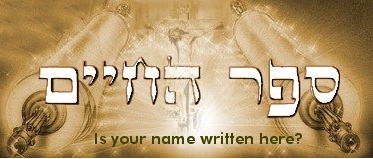 |
 |
Setting your Focus...

05.01.19 (Nisan 26, 5779) Fear profoundly affects the way the brain processes images and messages, influencing the way we see, hear, and perceive things. And since the mind and body are intricately interconnected, fear is a root cause of many physiological problems such as heart disease, high blood pressure, clinical depression, and many other ailments. Left unchecked, fear can be deadly.... Most of our negative emotions come from fear, including anger, frustration, and rage. On a spiritual level, fear and worry can cause people to question God's love, to doubt His promises, and to succumb to despair. The devil knows that frightening people causes them to be unsettled, off-balance, and vulnerable to all sorts of manipulation and deception. Living in fear is a form of slavery (see Heb. 2:15).
Politicians, advertisers, social activists, and other manipulators understand that when people are afraid, their thinking is compromised, and therefore the propaganda of the world inevitably seeks to incite anxiety, dread, terror, division, and confusion by means of disinformation served up through pop culture. The way of healing is therefore to refuse to be bullied by the carefully crafted messages of deception regularly broadcast by the various "princes of this world..." We are not to be ignorant of Satan and his strategies to foment resentment, mistrust, and hatred. We must overcome the power of the lie by consciously focusing on the truth of God and the abiding Reality of the Divine Presence. As King David resolved within his heart: shiviti - "I have set the LORD always before me - because He is at my right hand, I shall not be shaken."
שִׁוִּיתִי יְהוָה לְנֶגְדִּי תָמִיד
כִּי מִימִינִי בַּל־אֶמּוֹט
shee·vee·tee Adonai le·neg·dee tah·meed
kee mee·mee·nee bal e·moht

"I have set the LORD always before me;
because he is at my right hand, I shall not be shaken."
(Psalm 16:8)

Hebrew Study Card
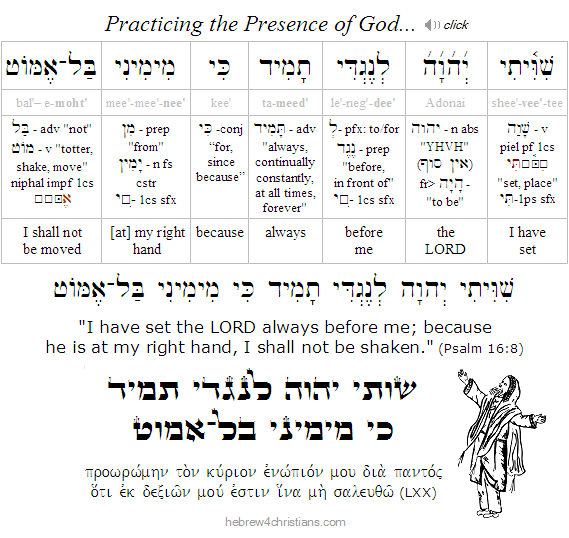
The Hebrew word shiviti comes from the verb shavah (שָׁוָה) which means "to set" or place, referring to focus of the heart required to truly apprehend the Divine Presence. In this connection, we note the "korban tamid" (תָּמִידקָרְבַּן) was the sacrifice of a lamb every evening and morning upon the copper altar in the outer court -- the central sacrifice of the Tabernacle. Along with it, matzah and wine offering were required, thereby revealing the true Passover Lamb of God and his sacrifice for us (Exod. 29:38-42). That the lamb was offered twice daily hints at its two applications - the first concerning the great deliverance from Egypt by the blood of the Lamb, and the second concerning the even greater deliverance given through Yeshua, the true Lamb of God (John 1:29). Note also that the constant sacrifice of the lamb required that the fire at the altar would never be extinguished, and by extension, the duty to "care for the inner fire" of the soul. Thank God that the fire that daily needs tending comes from the Spirit of God within us!
Therefore "fear no evil," for God is with you (Psalm 23:4). There is no fear in God's love, but perfect love (אַהֲבָה שְׁלֵמָה) throws out fear (1 John 4:18). The LORD repeatedly tells us not to be afraid – not of man, nor of war, nor of tribulation, nor even death itself (Rom. 8:35-39). Indeed, the most frequent commandment in Scripture is simply al-tirah, "Be not afraid."
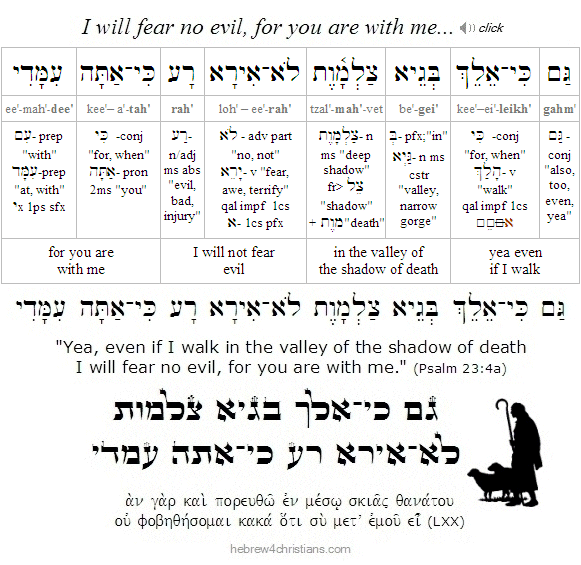 |
But how do we overcome our fears apart from trusting that God is "with us..." He is the Good Shepherd (הָרעֶה הַטּוֹב) who leads us on our way and meets our daily needs. The LORD promises to never leave nor forsake us, especially when we are faced with difficult circumstances. The antidote to our fear is comfort found in God's love (1 John 4:18): God saves us from our fears (Psalm 34:4, 2 Tim. 1:7). When we trust that God personally cares for us, we find courage to face trouble without shrinking back....
The entire world system (κόσμος) is predicated upon fear -- the fear of man and the underlying threat of violence.... We disarm the power of the world over our souls by walking in the Light and refusing to succumb to the lie. We call upon the Name of the LORD and ask Him to empower us to live as His witnesses during these difficult and evil days.
|
















































































